& — Avid Sho and Minazuki fans, though like other things as well. Likely to be focused on Persona-related things for now, however. Also working on assembling a collection of Sho Minazuki resources for reference in my spare time. Askbox guidelines under #Sholar AU Asks [Chipping away at WIPs between offsite shenanigans (see 'Current Projects' page for more info) || Please stand by...]
Don't wanna be here? Send us removal request.
Text
Arbitrary plurality resources post for the year
I noticed that a lot of the 'system tracking' resources out there focus heavily on "who's fronting and for how long in a day" rather than "who's generally active in a day". It's seriously been bugging me, especially since non-fronting and rarely-fronting system members are an established plurality experience! So after looking at other people's recommendations of the former for the umpteenth time, in my frustration, I just started looking through clerical apps on my phone for something, anything that could potentially be repurposed for system tracking.
Low and behold, ICloud Numbers has a handy-dandy auto-graphing feature, as well as an easy-to-use checkbox feature. Salvation at last! So in case anyone else might be in similar straits, I decided to make this post about it to show the set-up I drafted up.
Theoretically, other spreadsheet software could do something similar, or one could finagle it via a mishmash of methods. There might even be dedicated graphing software out there too, for all I know. (I didn't really research it. This one worked for me, after all. xP) So feel free to use whatever works best for you, if you make your own.
Also, a quick note: I'm unsure of how well this would work for a larger system. If any folks interested in this for larger systems are reading, this is your fair warning that this might not be best suited to you. But please, feel free to read through anyways and see if I'm wrong, or if you can find a way to adapt anything here to your needs!
Anyways, that said, screenshots and explanations of things:
————————————————————
Blank Monthly Template
————————————————————
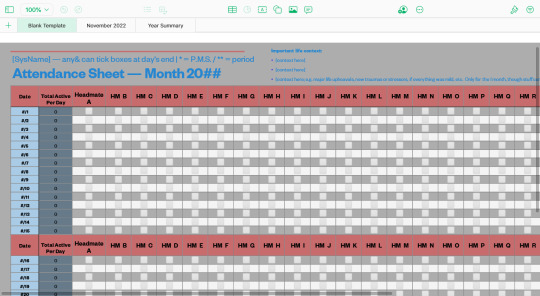
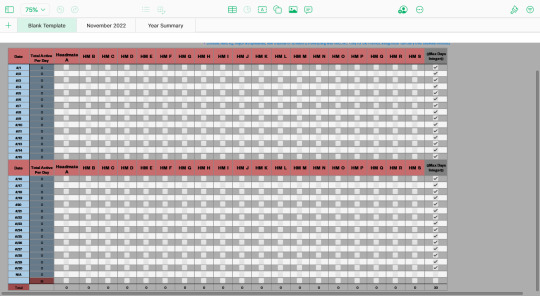

The blank template version of the spreadsheet, because it's so much easier to just copy and paste this than create a whole new spreadsheet page every time.
Going in order of the features...
First off, the color scheme and layout. You can change the colors of the cell backgrounds, all of the text, any shapes you add (like lines), and the page background to any color you like. You can also position elements pretty much anywhere on the sheet that you like. (Personally, I like to keep the spreadsheet in the upper-left because it's faster to access when it's the default loading position of a page.)
Next, the title text elements. Honestly? You don't really need to put anything there if you don't want to. It was just kind of there already with the basic 'school attendance sheet' template I started this from, so I kept it.
If you intend to set it up like I have it, though: “SysName” is for your system (or subsystem, or group of system members') name, though you could use your body name or a specific member's name or whatever-have-you, too.
“Any& can tick boxes at day's end” is a reminder or regulation thing, I guess? I intended it to remind headmates that the job didn't have to fall to just a specific person, and also to invite them to mark their own activity down if they'd like. If other systems have rules on who can and can't do what, though, then maybe it could be helpful to note that here?
The 'one asterisk for P.M.S., two asterisks for period' thing I added because it seemed like it might be useful to the systems that experience it, given hormones can affect mood, dealing with blood or pain can incur various negative reactions, it can involve sensory issues for those with sensory differences, people who don't track days passing very well might be helped by a record of their cycle, etc. For plurals who don't experience it, or who have other things that might be helpful to track like this, you could probably modulate or remove it from your own version?
“Attendance Sheet — Month 20[blank]” is a title to denote the purpose, as well as what month it's specifically for. If you create a different spreadsheet file (not page) for each year, though, you might not need to label the year on the sheets themselves? The file title could suffice in that case.
“Important life context” is to help give future-you context on what was going on in that month, as life happenings can affect who in your collective is active and when. You can pretty much put whatever you find useful here, but make sure to only limit it to what goes on within that month. (Happenings can still span over multiple months, though; just make sure to note it down on all months that it's applicable to.) Also, if you needed more than 3 bullet points for this, you could change the location of the text element to somewhere with more space.
The “Date” column is for every day in the month. I personally keep all 31 rows for dates on the spreadsheet, even in months with less than 31 days, as it's easier to just change the absent days to “N/A” than it is to adjust the spreadsheet template every month. As for the blank cell in the date column... I believe I had to separate it from the “Total” row beneath it due to it messing with something to do with the auto-graphing? But I honestly don't remember, so maybe try to combine that with the row below it in your version.
The “Total Active Per Day” column adds up the total number of checkmarks in the row that each cell inhabits. Thus, basically tallying how many people in the collective are active each day. I added this metric because I was curious about how many of the total member count were active at a given time, and if that fluctuated at different times of the year, or in different circumstances. It can also be a useful insight to how active the system is when life changes occur, like if your physical health is greater or lesser, if you're starting a new medication, etc., so you can see concrete information that doesn't rely on your own internal memory of time or events.
All the columns labeled “Headmate A” and “HM B through S” are for you to put headmate names, monikers, emojis, etc. in. If you don't know who someone is yet, but have evidence or a feeling that someone is there, you can also use temporary monikers such as “Unknown chores-person” or “Rando 1” or whatever works for you. Just make sure you keep their spot in the spreadsheet if you ever update their column header; that way your data stays more consistent and easier to track!
Also, just in general, I don't recommend messing with the places you put system members' columns, as that can make it more difficult to find who is where at a glance. If you need to add someone in the middle of the sheet, make sure to apply that change to your template sheet and your yearly summary!
As for why the headmate names recur in the middle of the spreadsheet's rows... I have trouble visually tracking what column is which when I can't see the headers, so splicing them into the middle of the month fixed that for me. If you don't need such a thing, you can feel free to remove it! It's not necessary for any of the cell coding.
Also related to the headmate columns is the “Max Days Integer” column. This is here specifically for graphing purposes, as things like the bar graphs like to auto-adjust to the highest number input into them, which can make them harder to read. This will have every day in that month checkmarked as to create a benchmark integer.
Lastly, the “Total” row is for tallying-up how many days out of the month that a single system member was active for. The cells are coded to add +1 for each checkmark in the column they inhabit – so make sure you don't accidentally check-off more boxes than there are days in that month!
————————————————————
Filled Monthly Example
————————————————————



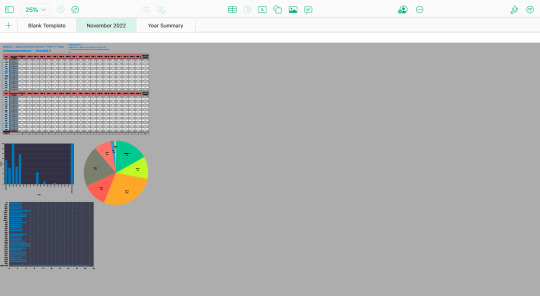
This is a filled example of the monthly template! I tried to emulate believable patterns of activity, but I have no clue if I hit the mark, haha. Anyways, this should give you an example of how one of these looks like when used.
Also included in this example are example graphs! You can graph things however you find most useful, but I'll go over the ones I've used here. (Also, note that ICloud Numbers can't currently copy and paste graph templates, so you'll have to set them up anew every time you create a sheet. However, you can open the spreadsheet in two browser tabs at once and just copy and paste the various data-settings onto your new graphs, so long as you remember what cells you specifically linked them to, so that can help preserve uniformity at least.)
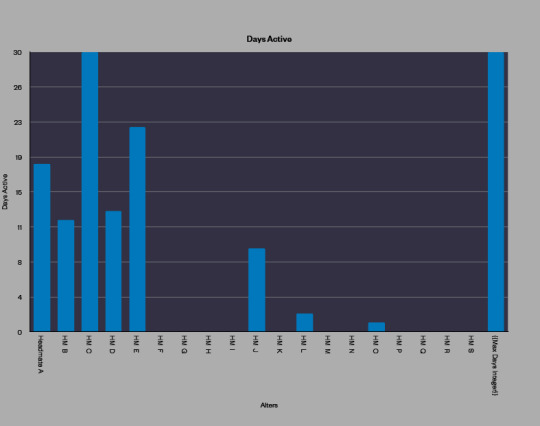
First off, the “Days Active” graph. This uses the data from the “Total” row to visually show you what each system member's activity was for that month. To create it, I selected only the cells in the columns labeled with headmates' names, not the whole row, as the blank space from the “Total Active Per Day” row might mess up the graph. (I don't remember specifically.) I also set the “major steps” to be “8”, a multiple of 40, so the data would be easier to read in relation to the days of the month. You can mess around with it and see what's easiest for you to comprehend, though!

Next, the “Total Active Per Day” graph. As you might be able to see by the empty “Date” and “N/A” entries, this reads the entire “Total Active Per Day” column from the spreadsheet and not just specific cells. This graph compares the numbers of total activity across all of the days in the month, and contrasts them against the total number of members in your collective (which you'd input in the cell that intersects the “HM-Total” row and “Total Active Per Day” column).
The T.A.P.D. graph has a major steps number of “10” and a minor steps number of “1”. I'd try to adjust the major steps number to be a multiple of your system's member count, as that way it should be easier to read.
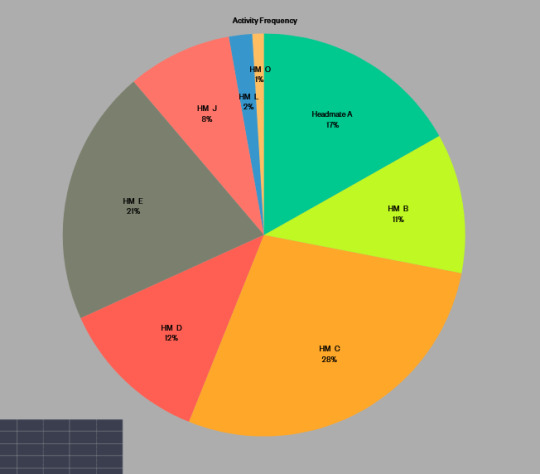
Lastly, the “Activity Frequency” graph. This one also uses the “Total” row for set-up the same way the “Days Active” graph does, but for this one you exclude the Max Days Integer, as this graph is supposed to show you what percentage of the month one headmate was active for compared to the rest of the system. This one admittedly gets harder to read at smaller formatting sizes, as the thinner wedges lose and displace labels, but is also a pain if you make it too big on the page, especially when viewing from smaller screens.
As for the placement of the graphs, you can put them wherever you want on the sheet. I just put them below the spreadsheet, as I find it easier to scroll directly down than the full horizontal length of the spreadsheet.
(Also quick note regarding ICloud Numbers: as far as I know, graphs can only pull data from one spreadsheet at a time, and only from spreadsheets on the same page. So all of your system members will have to be put on the same sheet if you want them all to be on the same graph.)
————————————————————
Yearly Summary, Filled Example
————————————————————
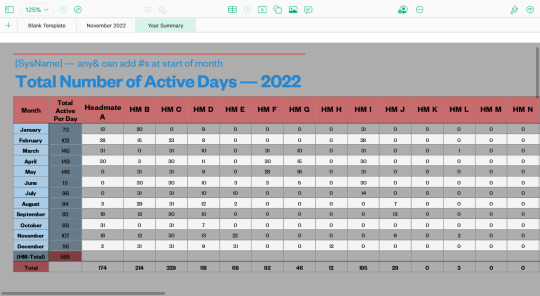
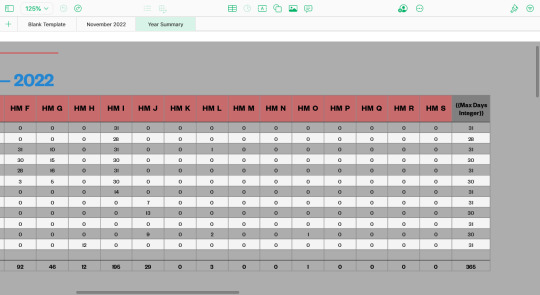
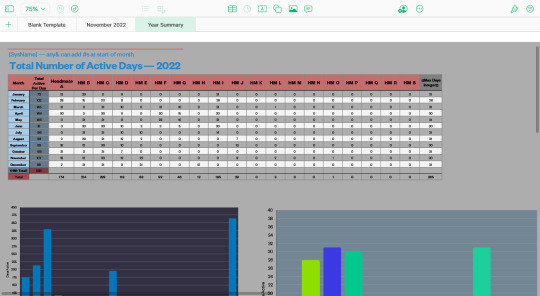
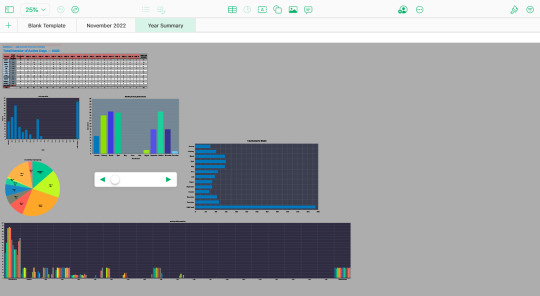
And for our final page, we have the spreadsheet and graphs where you input all the data from the monthly spreadsheets to create a comprehensive, easy-to-review overview of the year. The formatting is pretty much the same as the monthly templates; you just reduce the date rows to '12' for labeling the 12 months in the year and fill the “Max Days Integer” column with the total number of days in each month for that calendar year. (Which means that you'll need to make sure to account for leap years!) Also, the guideline changes to 'adding numbers at the start of each month', and the title of the sheet changes to “Total Number of Active Days — 20[blank]”.
Basically, you update this spreadsheet every time you fill a full monthly spreadsheet. I find that doing it at the start of every new month is the easiest, since the idea of filling out the entire year at once seems too daunting, and this way I get to see the graphs update incrementally instead of having to wait a whole year. But you can do it in whatever way works best for you!
Also, you may notice that there's no “important life context” text element on this sheet. Personally, I think that reviewing that in each individual month would be more informative for me, but if you'd find it useful to have that here, then go for it!
As for the graphs...

The “Total Days Active” is set up the same as the “Days Active” from the monthly spreadsheets, just with 16 major steps instead of 8. It functions the same too; you're just seeing all of the single-month versions of this graph combined into one!
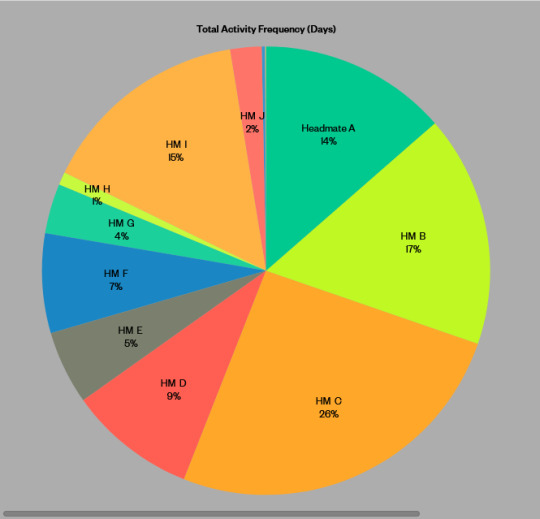
Again, the “Total Activity Frequency (Days)” graph is set up the same as the monthly version, and shows the combination of all of the single-month versions in its data. Pretty cool to see who was around the most and least in a year, in my opinion!

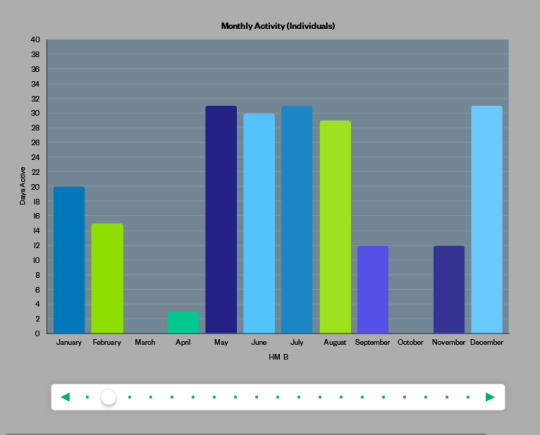

The “Monthly Activity (Individuals)” is specifically an “interactive graph”. This lets you flip through multiple data-sets while using a smaller amount of page space! To set it up like this, you want to create a cell-selection spanning your first headmate's “January” cell all the way to your last headmate's “December” cell, leaving out the “Max Days Integer” cells. The major steps is still set to 8 in this graph, as this graph compares one headmate's number of active days for each month in the year.

The “Total Active Per Month” graph is set up the same as it's monthly counterpart. The only thing is that you now have to do “the total number of members in your system” multiplied by “31” (that being the highest possible number of days in the month) in order to get the benchmark integer for “if every single member of your system was active every single day in a single month”.
This is probably something that would reach ridiculously high numbers for those with higher system counts – after all, it's already at “589” with this example count of “19”. So while it gives an interesting view of the data... it probably could be done in a less clunky way, lol.
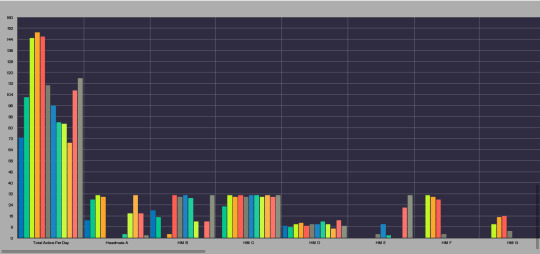
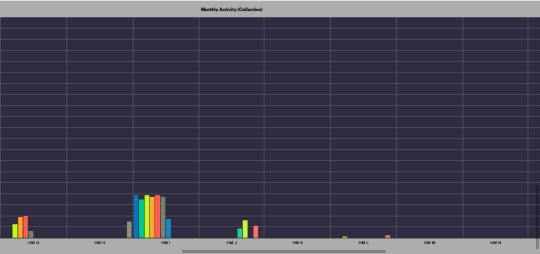
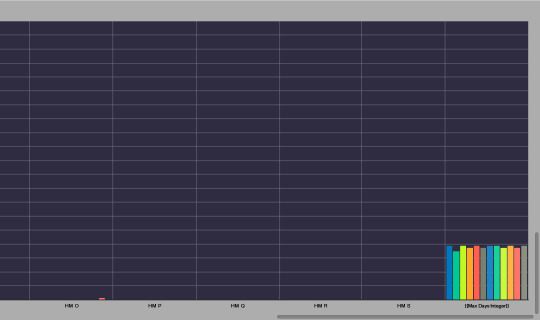
And finally, this behemoth of a graph, another thing that probably doesn't work great at larger system counts, haha. You create this the same way as the “Monthly Activity (Individuals)” graph, but including the “Total Active Per Day” and “Max Days Integer” columns as well. Also, the major steps for this graph are 20, not 8. This graph basically lets you see the same data as the 'Individuals' version, but all at once, and with the ability to compare a single headmate's activity against the collective headmate activity for each month.
You could probably get away with using the 'Individuals' version alone if you wanted to; I just personally find it fun to be able to see them all at once.
...Also, evidently there's a column header typo of “Total Active Per Day” rather than “Total Active Per Month” on this spreadsheet that affects its entry on this graph. Oops!
————————————————————
Additional Notes
————————————————————
And that's a wrap! A very... lengthy... wrap... Lol.
Anyways, for 5 quick additional notes:
1: In hindsight, there should probably be a checkbox column for “Too unclear to tell” or “Bad communication”, as that in and of itself would be valuable data to track. So that could be appended to the start or end of the spreadsheet, perhaps?
2: You can put comments on individual cells in the spreadsheet. So if you want to put more nuanced detail on why or what system members were doing in a day, or note down on a 'date' cell what events were transpiring that day, then that's a thing you could do! Or if you wanted to use it to track plans you have for the month, you could also do that, in theory, though I'm not sure how useful that'd be given that comments aren't immediately visible like the cells' data is.
3: You can password-protect spreadsheet files in ICloud Numbers. It gives you the option to set unique passwords for each file, doesn't stop you from using the same password on multiple files, and has the option to set password hints if you need them. So if you'd find that helpful and not a hindrance, then that's an option!
4: I also drafted a version of this set-up to have two spreadsheets in a single month: one for 'active'-presence and one for 'passive'-presence. I did this while I was trying to combine a fronting-tracker with an activity-tracker, as fronting-trackers do still have their merits.
If you want to set something like that up, you basically have to duplicate everything on the monthly sheets to another section of a single month's sheet (or make a separate page for the same month if you want), and then either duplicate the contents of the yearly summary on the same page (not recommended; it gets long) or split the data up into 2 separate pages.
5: Aside from that, writers and character-creators who want to make super-intricate histories for their plural characters could probably adapt this to their purposes too. You'd just have to adjust the calendar to whatever calendar your setting uses, and anything else to whatever would be more useful for fictional purposes.
And that's it! Happy spreadsheeting, y'all!
#Capri's Plurality Resources#Capri's Writing Resources#multi x multi = multiplicity#ID in alt text#(first time ID'ing images... fair warning)#(If any of the alt text needs improvement please let me know!))#(It's a longer post because there were a lot of details to cover haha))#(This should probably be in the general plural community tags...)#(...But admittedly; throwing my hat into that ring seems a bit...daunting.)#(It's still fine to share this post with other people though! I made this to be a resource for others to use after all.))#(Also if you make any alterations to the set-up feel free to share so others can try it out!))
11 notes
·
View notes
Text
PQ1 Addendum
AKA a few tidbits that I wrote up back in November 2021, but forgot to post up until now, lol.
The spoiler warnings above still apply to this!
And tagging @milkshake-999 to let them know that this post is up. Enjoy! ^u^
------------------------------------------------------------
(Based on the P4 route)
"So they have lost their memories... Are they like Teddie, I wonder..?" – Minazuki musing quietly after meeting Zen and Rei, and learning about their lost memories. Could be co-con or fronting, unsure.
Sho gets really into chasing the rabbit in You In Wonderland, either at first or after watching the others fail and laughing at how it's 'so easy that it'll be a breeze and they're being incompetent', so he lunges at the rabbit impulsively just as it hops into the painting... And gets half stuck in it, his legs sticking out the back? Or else goes barreling straight through and crashes onto the floor on the other side, barely missing the rabbit, which vanishes/hops away before he can get back up to chase it. Everyone else on the other side, if the first instance, totally freak out that Sho just vanished. If not the first time, they're just kinda unimpressedly-awed, like "...Yep. He just did that." kind of energy.
When Kanji accidentally misremembers the FOEs (in YiW) as "SOBs", Sho enthusiastically goes along with it, saying "Yeahh, that's more accurate! They're real sons of bitches!", or else if the group accidentally gets in a fight with one, he ends up exclaiming that during or after the fight? xD Or else perhaps in a later Labyrinth when the team has to encounter a FOE in some unpleasant form (like the Old Doll or Fast Guy, perhaps?).
Does Sho (or Minazuki) end up drinking the Drink Me potion? That is the question... Zen already swats one away from an enthusiastic Rei, so Minazuki doing similar with Sho would be redundant. But imagine the girls potentially fawning over a tiny Sho, who just starts making squeaky-voiced threats with tiny swords at them; or tiny Minazuki, who... I'm not sure how he'd react actually. He probably wouldn't like it and get mad at them in his own way, and potentially be baffled as to why they suddenly find him so endearing? Tiny squeaky-voiced Minazuki just trying to be intimidating like he normally is and just it not having quite the same impact though... xD And the girls just cooing because neither redhead boy can actually do anything dangerous to them like that, so they're free to find him utterly adorable without repercussions. xD
If Aigis can use Orgia mode, then Sho and Mina would keep their Back-Up ability. Just sayin'. xP Also, both Sho and Mina would have access to Sub Personas, but like in P4(their edition), you can only access whichever boy's Personas that you're currently using. Also like in P4, you can swap between the two of them in the main Culture Festival area, but not while in Labyrinths, as you'd be changing Main Personas as well as Sub Personas if the player was allowed to swap within Labyrinths (thus effectively have the ability to change out a whole party member, even if in limited quantity).
Sho and Minazuki definitely count as separate potential partners for the Group Date Cafe 'destined partner' questions. I'm not sure what answers you'd have to give to the questions to get either of them yet... I'd have to look up the behind the scenes data on that. :T Regardless, Sho would be the 'bride' in the photoshopped picture, while Minazuki would be the 'groom', which... for Sho, would probably lead to about the reaction you'd expect. xD Minazuki's main issue with having to marry Yu is that he would be expected to care for Yu instead of Sho, and this would be a conflict of interest for him (completely not understanding how marriage works and somehow thinking that it's just a one-way obligation to look after another person for the rest of your life... probably because of Japanese cultural notions about the men of families, perhaps?). Otherwise, he doesn't really seem to reject the idea– though whether this is out of a place of resignation or hidden desire isn't clear. Sho would fluster about it the whole time, but there would be indicators of slight interest in his actions.
^Circling back to the spotlight/drumroll portion before the trap doors are sprung; to best fit with the gag of 'mystery', their model would be given an ambiguous expression and stance, as it'd make it more plausible for either of them to have been standing there when picked. And for how they would each react to the spotlight: Sho would go "W-What?! Hey! The hell do you mean that I'm his– Whoa!" (the interruption being the trap door opening). Or else maybe some comment about 'wait, is that thing pointing at me, or-?' or 'What the– Hey asshole! You're pointing it at the wrong person! Shouldn't you be pointing it at– Augh!' (left vague on purpose as to who he was about to mention, given the nature of the game). Meanwhile, Minazuki would say "..? I'm supposed to be his 'destined partner'? [shift to thoughtful expression] Or is it referring to that boy instead of myself..? [shift to surprise] ..!" ...Also thinking about it, Minazuki would probably also be talkative during Sho's 'Wedding Day' scene, just from the background. Oh no. xD
^For the photoshopped picture, Sho might errantly assume that, due to having no memory of taking the picture, Minazuki might've taken control at somepoint and posed his body in a dress like that, and thus start getting upset at Mina and Yu, demanding an answer from one or both of them. There could totally be an option to troll Sho in response by alluding that, yes, Yu and Minazuki did set this all up... but Minazuki would (likely, unless he's playing along) quickly debunk it after Yu says that, so it wouldn't work too well for Yu. xP
With the men's bathroom scene in the Evil Spirit Club, Sho would probably want to fight the FOE instead of running away and hiding, since so what if it's a FOE? He could take it! Easy! (Which this attitude probably only encourages Akihiko's own want to fight FOEs, much to Mitsuru and Shinjiro's chagrin. xD) So someone else in the group has to forcibly pull him into a stall, and if Minazuki doesn't automatically force Sho subconscious/out of front to keep him from being reckless, whoever pulled Sho into the stall (or someone in another stall that knows Sho and Mina well enough) might fervently whisper to plead Minazuki to take control then, since the doll FOE is just about upon the bathroom. So Minazuki complies, since it's an opportune and urgent enough moment to do so.
For idle background animations on the out-of-Labyrinths menu screen, there would be one that includes Minazuki and Zen chatting together off to the side while the other characters in the scene do their own thing a little ways off; one where Sho, Rei, Ken, and Chie basically try to recreate Fruit Ninja (Sho on swords, Chie on fruit-tossing, and Ken and Rei as enraptured spectators); and probably them included in some of the ones already in the game. There could potentially be other new ones not present in base-PQ1, but those are all the ideas I have for now. :P
During the Clocktower arc, all of Zen's realizations about what he is and how little he understands about living and feelings causes Minazuki to ponder over similar things about himself. There's a Stroll event where you can find Mina by himself thinking about these things. He acknowledges that it's a foolish time to be thinking about such things*, but... it's on his mind anyway. (Given that Minazuki doesn't exactly have Ultimax in this timeline to explore those feelings through, some of them might first become more evident here, technicality-wise anyways because they'd eventually be revealed a bit later in the P4 timeline.) He, too, merely awakened one day in a life that should not have been his... He doesn't fully understand what it means to "live" either, as he always feels as though he's "living" a stolen life, a facade of a human when he too is an entity from the Collective Unconsciousness, from the ultimate Death (Nyx), thus cannot understand what humans feel... even though he himself experiences such human-esk feelings and all.
*(He's still concerned about Rei at present**, plus, naturally, the danger to Sho's very existence by staying.***) **(Rei's probably grown on him a little, since her and Zen's situations remind him of Sho and himself. Also, the truth about Niko (her reaction to Chronos showing her the school, wondering why she was even born, her lonely circumstances in the hospital, etc.) probably sparks so many worries about similar things for Sho, holy heck. xD) ***(Sho insists that he wants to stay and help Rei and Zen. It's dictated by the plot, sure, but I imagine that Sho's realized that he can relate to Rei a whole lot, and also grew to like her somewhat before this point... even if he probably thought she was dumb and annoying at times.)
All that stuff with Zen might get Sho to start thinking about that kind of stuff in relation to Minazuki as well? Though, being Sho, he might guilelessly ask if Minazuki is secretly an amnesiac god as well and neither of them have discovered it up until this point. xD But still, he's not entirely naïve, so it'll plant some thoughts about his headmate in there too that P4AU would've normally planted... Unfortunately though everyone loses their memories of this time afterward, so I'm not sure how much of that sticks. He'll probably eventually think such similar thoughts again in the main timeline, but it'll take some time before that point.
In the Inaba Pride Exhibit, in the dead end scene where Aigis makes the "Things are really heating up" pun, Sho probably cackles like a maniac until he hears her mention that the pun was programmed into her by Ikutsuki. ...Though honestly the IT might actually know Ikutsuki's name by now, depending on how much they've heard from/learned about Sho and Mina? So they might have more of a grimace reaction to the mention of him instead of a clueless one... Anyway, Sho's tune immediately changes and he suddenly storms away from the group, much to some of their surprise and concern. But right then he A) doesn't want to hear that shit (especially after the Evil Spirit Club) and B) really wants to cut something up (an enemy or object, not himself).
Sho Minazuki as a P4 Party Member AU
Spoilers for: Persona 4/Persona 4 Golden, Persona 4 Arena series, the Persona Q series, Persona 3/Persona 3 FES, and Persona 5/Persona 5 Royal ahead!
Keep reading
#Capri's Persona-AU Musings#Sho Minazuki#ミナヅキショウ#Persona 4#Persona Q: SotL#PQ1#spoilers abound#mostly story but a bit of game mechanics too#Sho wondering if Minazuki might be an amnesiac god is still one of my fav things about this LMAO
18 notes
·
View notes
Text



Here at last, my observations for English P4AU manga volume 4! Same formatting as my prior ones, no holds barred for spoilers, and fair warning that I'm writing this off of notes from 5 months ago; so if I miss some details, I apologize. Hectic life shenanigans have limited my ability to reread the volume. xP
-----------------------------------
General Vibes
On the whole, I found this volume to be the best reading experience out of the 4 Udon-translated volumes. Aside from the persisting issue of conflating Sho and Minazuki via calling both “Minazuki”, as well as a few confusing absences of clarifying quotation marks, the narrative is cohesive and comprehensible.
I also think that it stands really well on its own, so, as I said before, I'd highly recommend Eng-Sho and Minazuki fans pick up Vol 4, even if you've been iffy on the Udon translations up until this point. In all honestly, I think Udon did a better translation of Vol 4 than the fan-translation that's out there on the internet, at least in terms of justice done to the characterizations of Minazuki and Sho. Their dialog, with a couple small exceptions, fit their expected lexicons much better.
(No shade to the fan-translation, of course! I'm still super-grateful that people took time out of their lives to give us some form of accessible translation long before Atlus got on printing an official translation, and the fan-translation is still pretty good with it's own wins.)
Also, Narukami's dialog was translated pretty well too, from what I recall, so fans of his might also find his inclusions in the story enjoyable. As for Adachi and Kagutsuchi... I'm not very well-versed in their characterizations, so I wouldn't be able to say. Adachi's lexicon did seem a bit out of character to me, though; like the underlying vibe is kinda the same as his typical lexicon, but the execution feels more 'censored', I guess? It's just the impression that I got, though.
-----------------------------------
Specific Things


• ...They were so close to getting it right throughout the entire translation, but they stumbled at the finish line. Literally – this was within the final few chapters, and may have even been the final mention of Plumes of Dusk in the story, lol. And it's definitely the same kanji and kana that “Plume of Dusk” is always spelled with, so how or why they suddenly fabricated “darkness” in place of “dusk” is beyond me.
Also, for Eng reading context, what gets translated as “the other me” is “もう1つの人格を” with a gikun of “ミナヅキ” in the Jap text. So whether or not that should have vocally been “the other me” or “Minazuki” is up to you to decide. ~(•_•)~ (And for anyone who wants the full Jap transcription of that text bubble: ”黄昏の羽根”ってヤツから生まれたもう1つの人格を消す手術から眠ったままだったらしい)

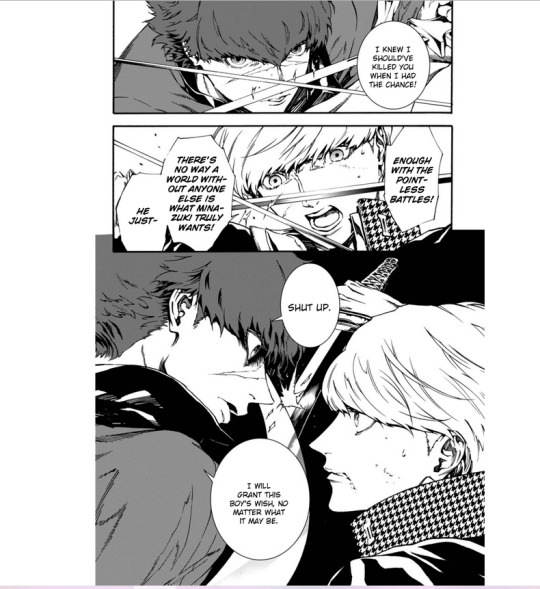
• I wish that translators would interpret Minazuki's use of “黙れ(damare)” as “Silence.” rather than “Shut up.” It fits his pre-established (by Ultimax-the-game) lexicon far more, in my opinion.
(Jap version of the page [here], because I forgot to take a picture of it, apparently. :P)

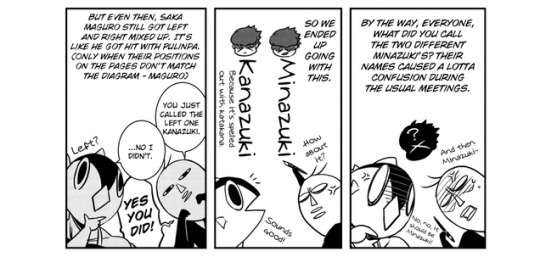

• Kanazuki, my beloved nickname. (Though, because pursuing lore details, I'm not sure if Udon's “the two sides of Minazuki” is an accurate translation in this case? It seems to be more like “the two Minazukis”, like how fan-Eng interpreted it, but I don't know enough Jap to tell. For those who want the transcript: ところで2人の皆月のことみんななんて呼んでる?皆月?ミナヅキ?文面ならまだしも打ち合わせの時彼らは大変混乱を招いてくれやがりましてね......)

• It's nice to have the uncropped version of the original Yu cover art... But I'm a bit sad that we don't get the original Sho/Minazuki back-cover as a poster as well.
• Interesting detail: despite reprinting and reformatting the title logos, they seem to have kept the signature color for each volume the same (Vol.1/yellow, Vol.2/red, Vol.3/pink, Vol.4/blue).
• I've already stated some of my thoughts on Ch.28 and Ch.30 here, but for a few things that I didn't cover...
1) Minazuki specifically thinking “The humans are shouting.” gives us an interesting window into his mindset at the time.
2) The doctors were shouting at him because he was climbing up into an open window more-so than just shouting at him in general, lol.
3) The Ikutsuki death report reads more as if Minazuki was narrating it rather than it just being Sho staring at information on a screen, which I think is a neat interpretation.
4) Sho might've been attempting to finish the 'Minazuki extraction procedure' that Ikutsuki began, rather than just blindly attacking Minazuki? I'm not entirely sure, but it's an interesting angle to consider nonetheless.
5) Ikutsuki spinning Minazuki as an “evil spirit” as another generally useful tidbit to employ in Sho characterizations.
6) “Murder pit”. I'm keeping this for my Minazuki characterizations going forwards, lmao.
• Generally adoring the larger page size, 'cause I can see more details in the art that also help me understand the context better in a lot of scenes. For example! After Tsukiyomi takes the full-power hit from Izanagi, I can see the clear signs of exhaustion and Minazuki pushing his limits in the continuation of the fight. His movements are more desperate, he gets pronounced bags under his eyes, he has a kind of wide-eyed look to him, etc. Which I think is a really nice detail, because it shows that Minazuki isn't invulnerable: his desperation to protect Sho is just that strong.
The dialog at the beginning of that scene also helps to demonstrate that: rather than continuing to think in fluent and complex words, his internal monologue is reduced to simple, fragmented instincts (“Can't falter... Must protect... Must...!"). Which, again, a very interesting window into how Minazuki thinks. Even when put under the physical strain of grievous injuries, his first instincts (in this situation, at least) are to hold his ground in order to protect Sho.
(...Though, the Jap text of the aforementioned dialog is a bit different than Udon's translation, lol. It's more like “If I... don't protect... I—" (俺が......守らなければ...俺が――...))
• I don't have much to say about the fight against Kagutsuchi due to not having the best focus when I read through that part of the manga. Hopefully one day I'll reread it with better success. ^^;



• Suicidal Sho? I'm not entirely sure, though, as the “思ってた” in the Japanese version of the text (死んじまうかと思ってた時...) seems like it could mean either “I believe (that this will happen)” or “I plan (on making this happen)”? I don't know what linguistic contexts lend to what definitions, unfortunately, and the visual context could support it either way. (Not to mention, I have no clue if the sentiment is being expressed in a literal or frivolous capacity, given Sho can be hyperbolic at times. >_>)
...Also, I'm not counting Sho knifing his own face as an intentionally suicidal action, because (to the best of my ability to understand) that was intended to be homicidal. It's just that it would have also had a suicidal effect on him.

• Shadow puppet-Yosuke, Shadow puppet-Narukami, and Yosuke are great, lmao.

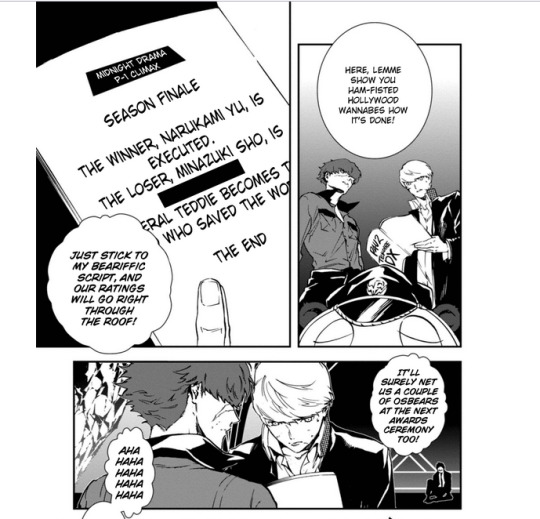
• Translations of General Teddie's script.

• Lastly, and maybe bestly: They got!! It right!! They kept Sho's name in Minazuki's “What are you going to do to Sho, Kagutsuchi?” line!! (Context: a previous observations/musings post of mine [here].)
-----------------------------------
(If you wanna see the fan-Eng in higher quality than the screengrabs I used, you can find it on Mangadex [here].)
#Sho Minazuki#Yu Narukami#Labrys#(tagging Labrys for the cover art)#P4AU/P4U2 manga#Persona 4 Arena Ultimax#P4AU#P4U2#Persona 4 The Ultimax Ultra Suplex Hold#ペルソナ4 ジ・アルティマックス ウルトラス―プレックスホールド
10 notes
·
View notes
Text
It has unfortunately come to this point, but here we are.
I need help paying for dental work. I have been denied disability/social security and I have been waiting for an appeal for more than a year (or two?) with no say of when exactly this will be
I am disabled and I have no way to pay for this, and I have to get at least two root canals thanks to genetic issues outside of my control (I have kept up a daily routine of taking care of my teeth with no luck! Yay! /Sarcasm).
Anything helps and I would be greatly appreciative:
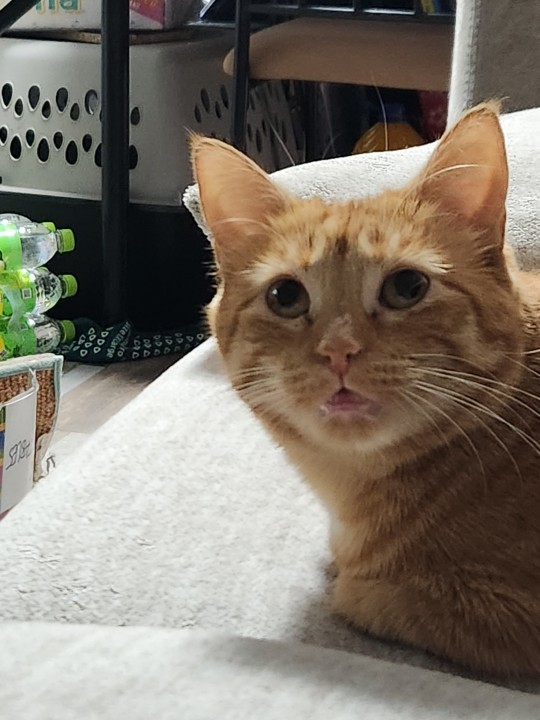
Here is an image of my baby girl Ginger
#mutual aid#signal boost#Dante and his partner have helped me with a lot of Sho/Mina things – many of which work their way into the stuff I post here.#So if you find my content useful or interesting then please consider helping out Dante with his teeth!#They deserve good things in life; and tooth decay is not really a good thing.#Capriciously-atypical blog content
127 notes
·
View notes
Text
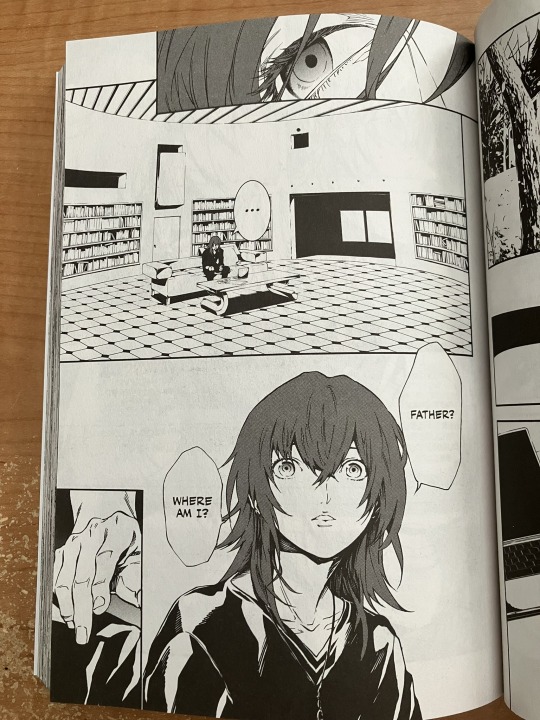
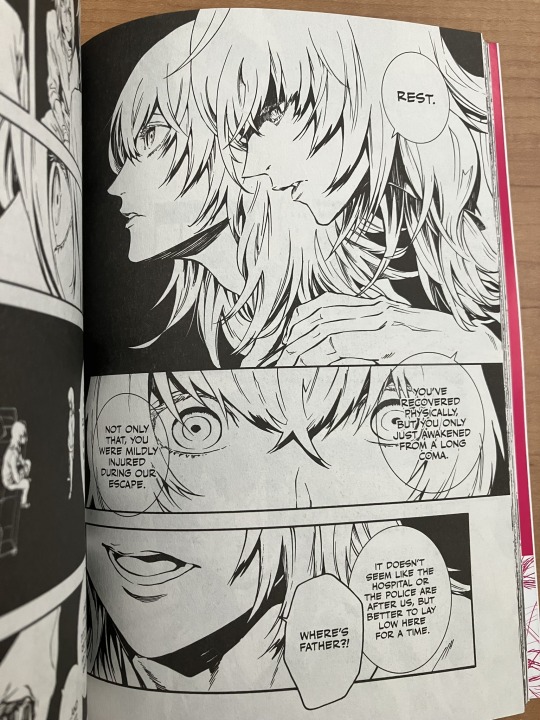

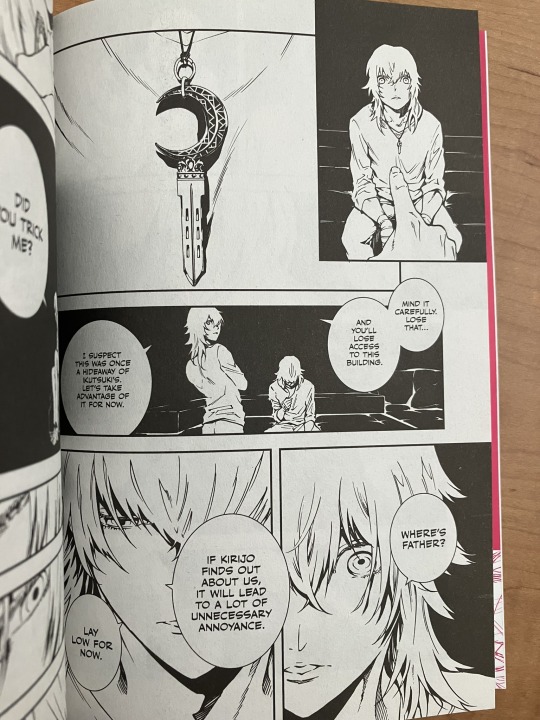
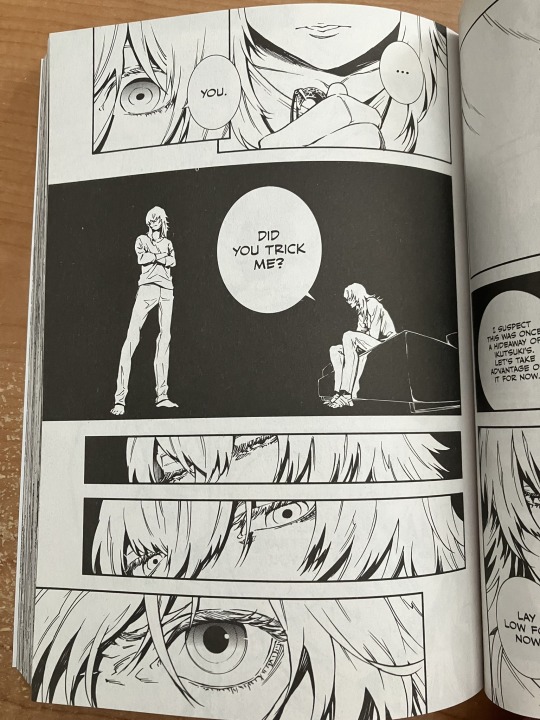

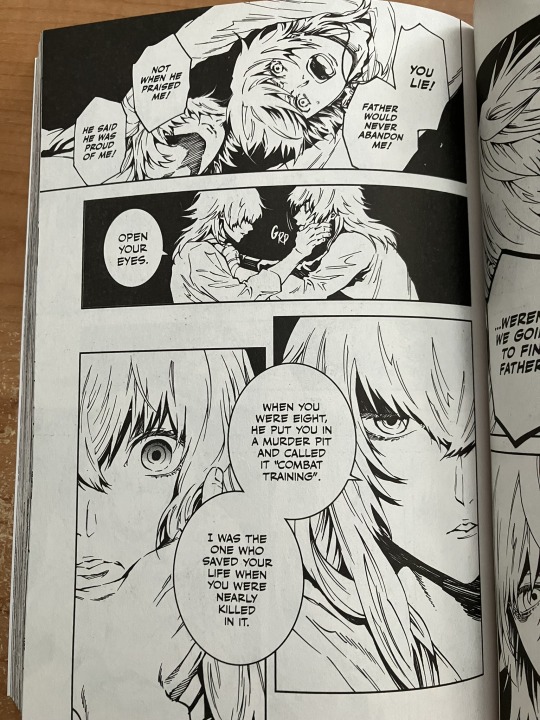
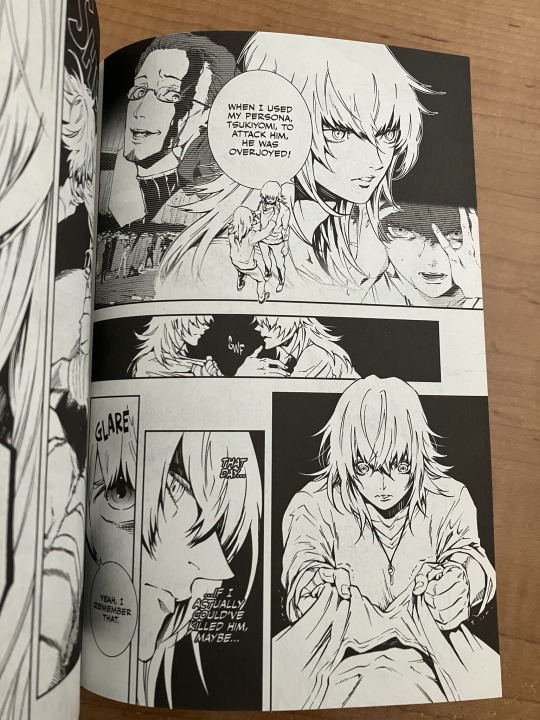
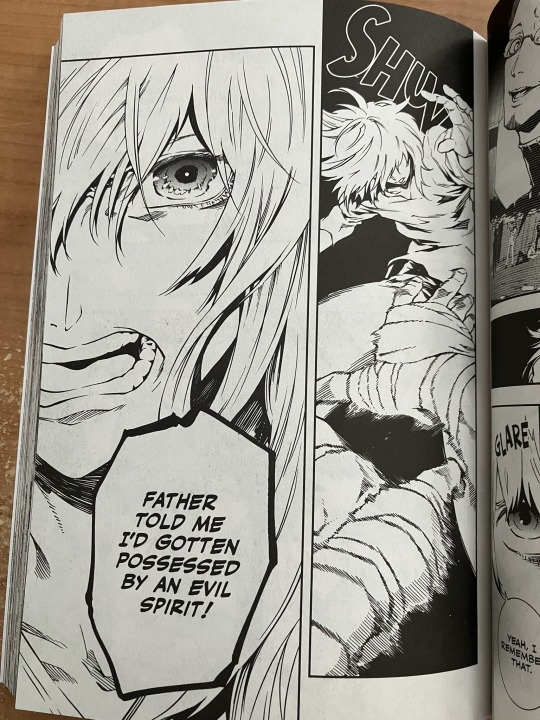
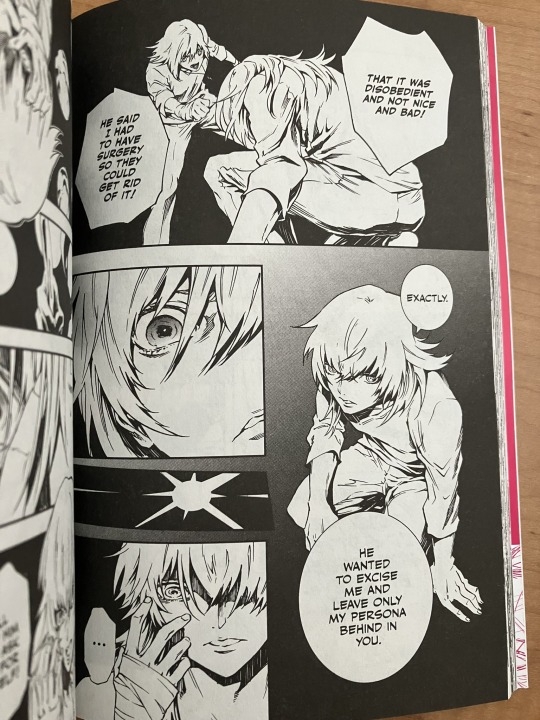

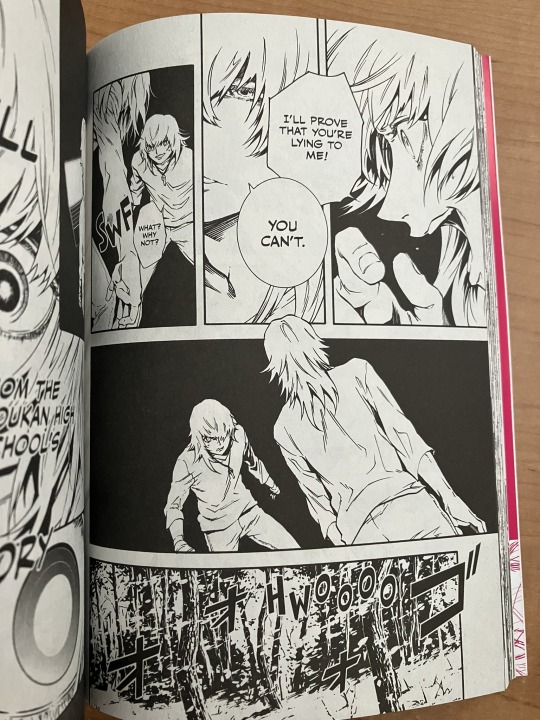
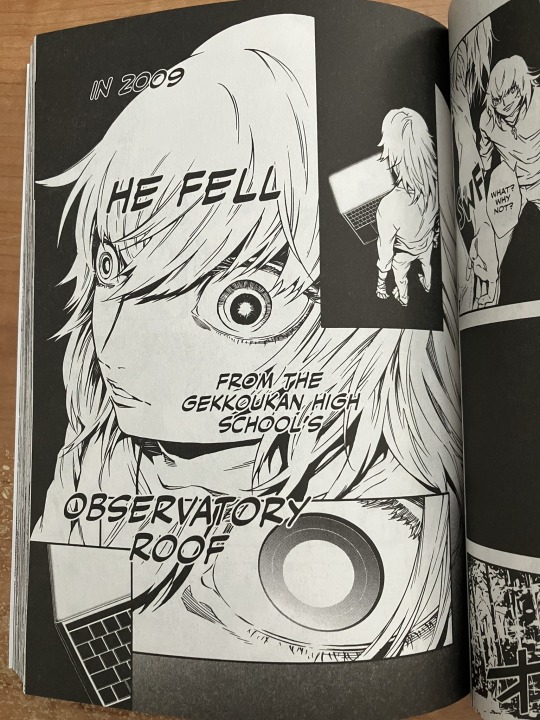
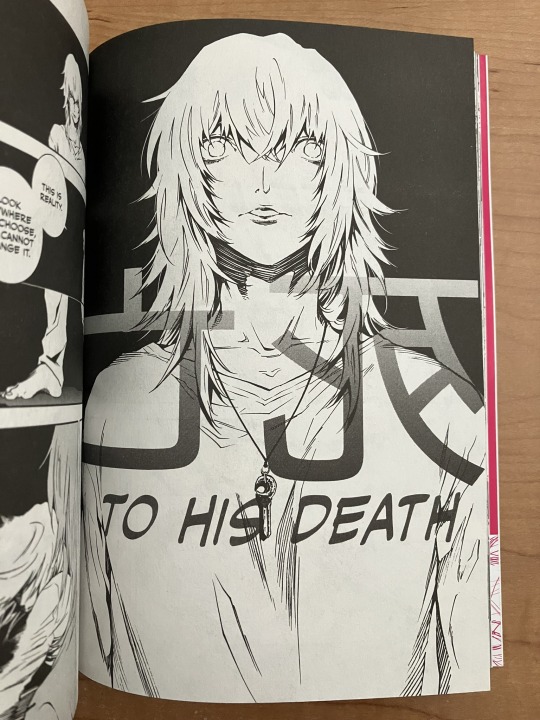
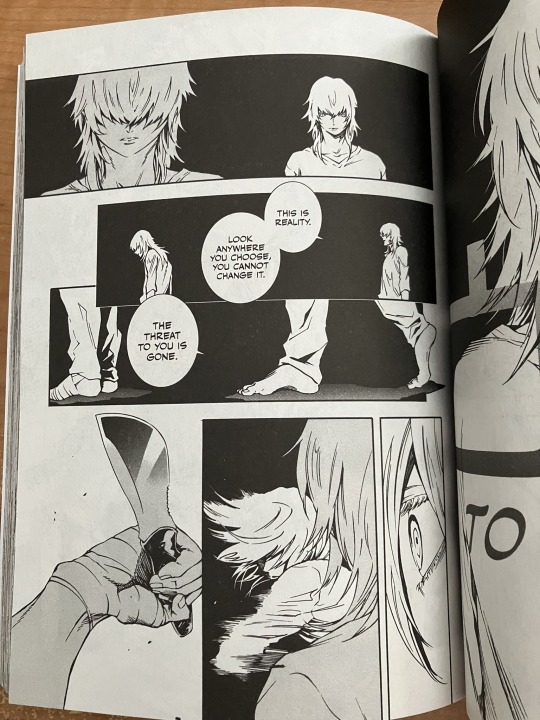
[Ultimax manga chapter 30: official English translation]
(Note: the part with blood/injury, and anything that comes after it, is below the 'read more'. There's also a few pages from other chapters there as well, but they'll come before, and have a separation between, them and the remaining pages of this chapter.)
Just wanted to share this chapter with the web because, in my opinion, it does a much better job at creating a cohesive and logical narrative than the fan-Eng translation does, and also helps clarify some key logistics from Sho and Minazuki's time in Inaba. (For example, where exactly they got Ikutsuki's keycard from and how Sho perceives Minazuki and his coma-inciting incident.)
Disclaimer: I don't presently have the time to vet this translation against the original Japanese text, so I don't know if any creative liberties were taken at any points. I'm hoping to go over it once I get the time, but meanwhile, if you'd like to try and check for yourself, you can find scans of the Japanese version of this chapter [here], [here], and [here].
If you would like to compare it against the fan-Eng translation, you can find that chapter [here].
One last note: I left the first few pages of ch30 out of this post because I wanted to focus on the text in the scar flashback scene. So that's why you'll see them in the Jap and fan-Eng but not here, lol. (The excluded pages were translated pretty well too, though! I highly recommend official-Eng Vol 4 as a whole for Minazuki and Sho fans. But I'll go into that more when I can write up my Vol 4 review post.)
~~~~~~~~~~~~~~~~~~~~~~~~~~~~~~~~~~~~~~~~~~~~~~~~~~~~~~~~~~~~~~~
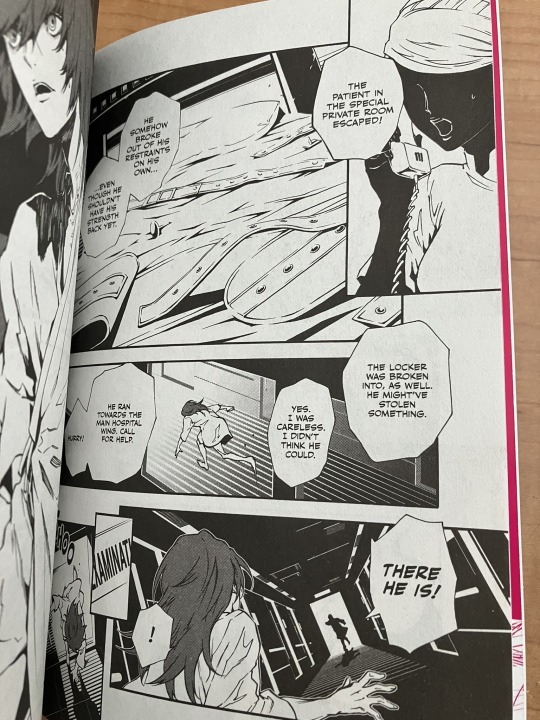
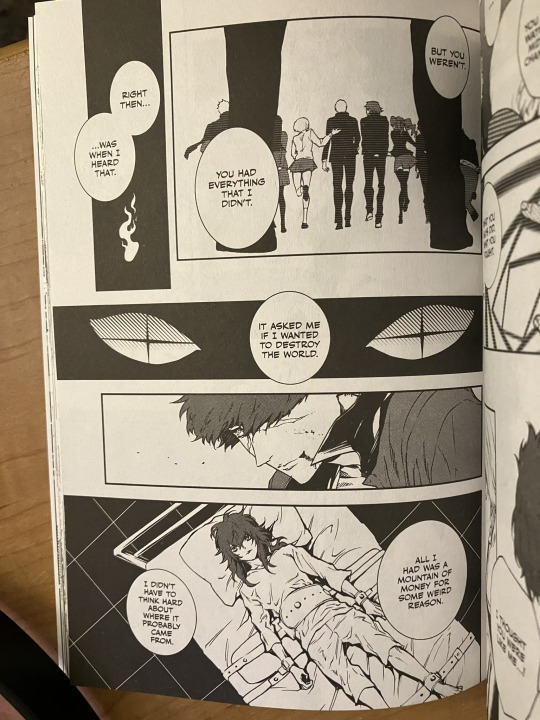


The first page comes from Vol 4, ch28; while the last three come from Vol 4, ch34.
I wanted to include them as they provide a little more context to some of the details from ch30. If you want to see the Jap version of these, see [here] and [here]; and the fan-Eng version can be found through the link for that above.
================================================
==========The remainder of ch30 is below this point!=========
================================================
================================================


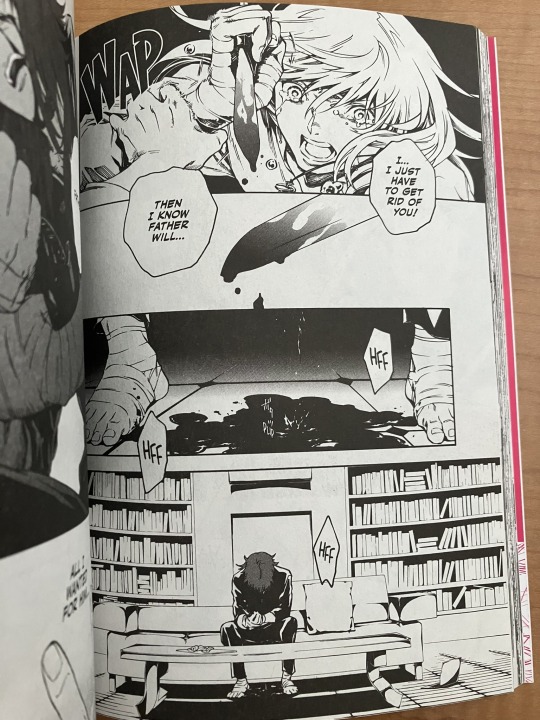
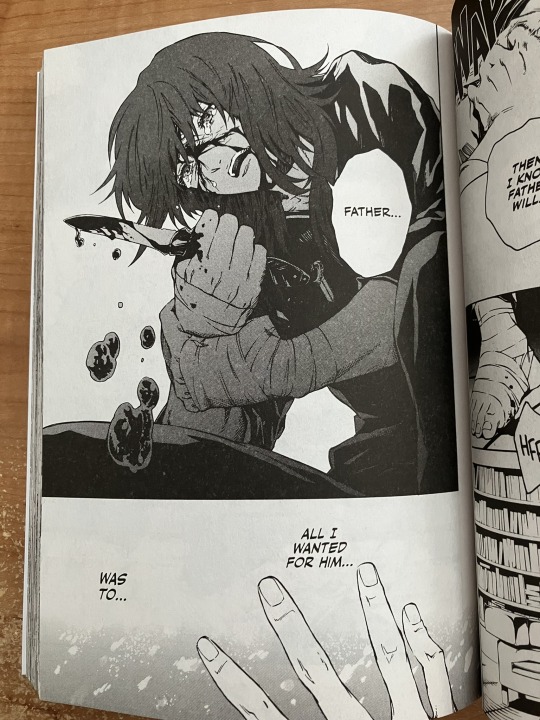
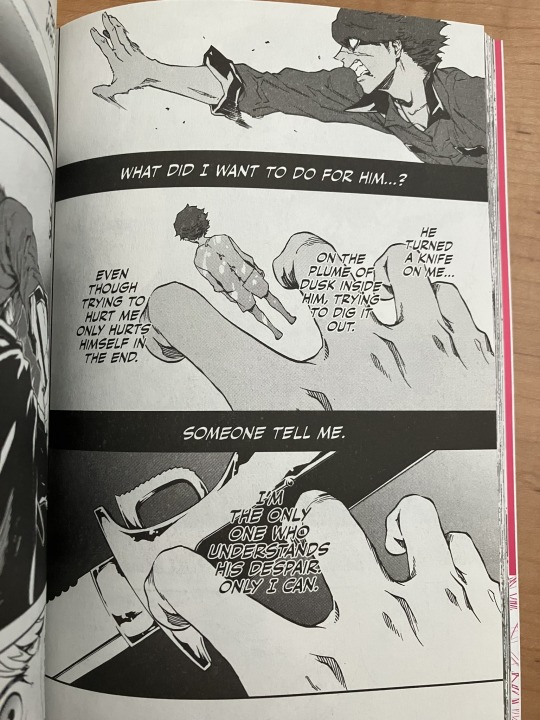

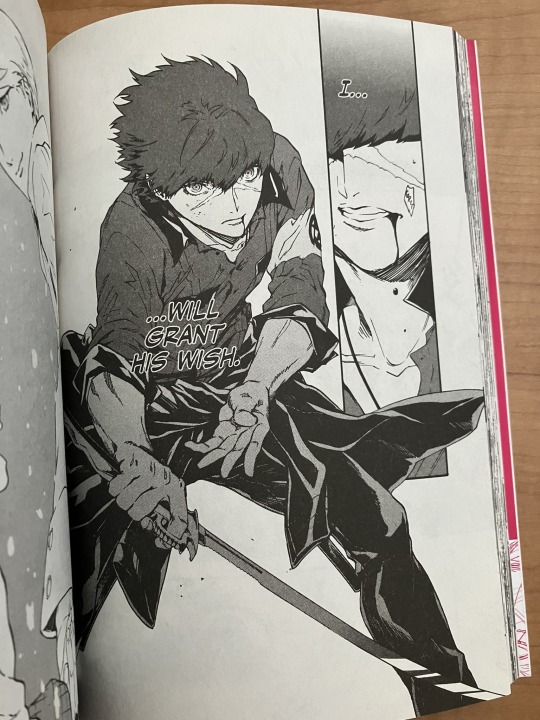
#(P4AU manga spoilers for those who haven't read it!)#Sho Minazuki#Shuji Ikutsuki#P4AU/P4U2 manga#Persona 4 Arena Ultimax#P4AU#multi x multi = multiplicity
38 notes
·
View notes
Text
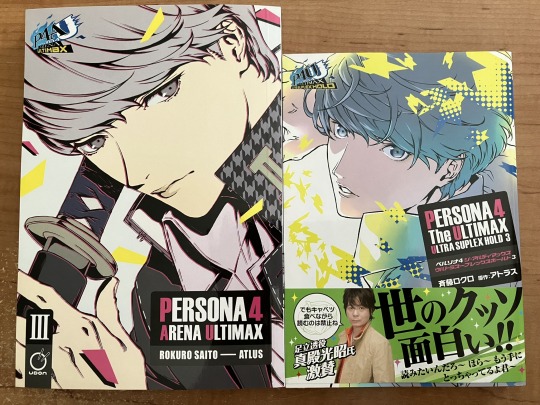


Ultimax English Volume 3, coming hot at'cha from me, who did the read-y thing!
Gonna repeat it for the folks who might be landing here for the first time: I've written up my initial impressions and observations below the cut, as well as sprinkled in some pictures comparing the three versions of the manga (OG-Jap, official-Eng translation, and fan-Eng translation). And if you don't see something there that you'd like to know more about, you can always hit me up with requests and I'll see what I can do for ya!
Oh– and of course, spoilers are no holds barred. So if you want to read the manga blind, then this is not the review post for you. Nor are my other ones.
So without further ado... The post!
~~~~~~~~~~~~~~~~~~~~~~~~~~~~~~~~~~~~~~~~~~~~~~~~~~~~~~~~~~~~~~~
Main Opinions (5)
~~~~~~~~~~~~~~~~~~~~~~~~~~~~~~~~~~~~~~~~~~~~~~~~~~~~~~~~~~~~~~~
[1]
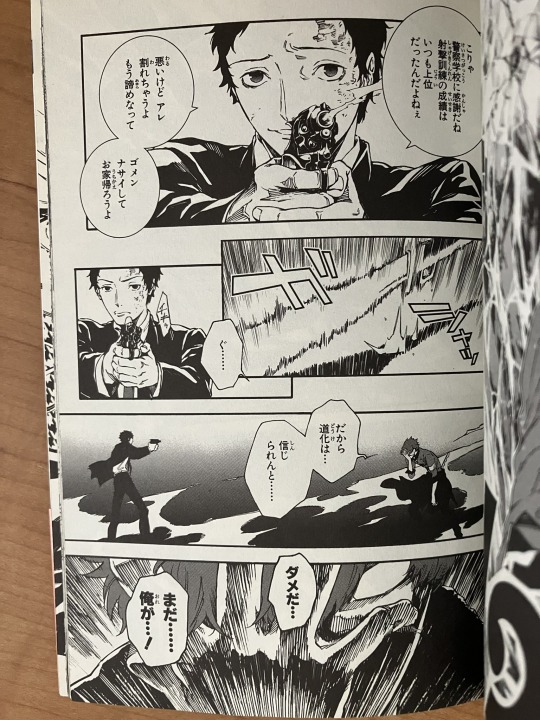
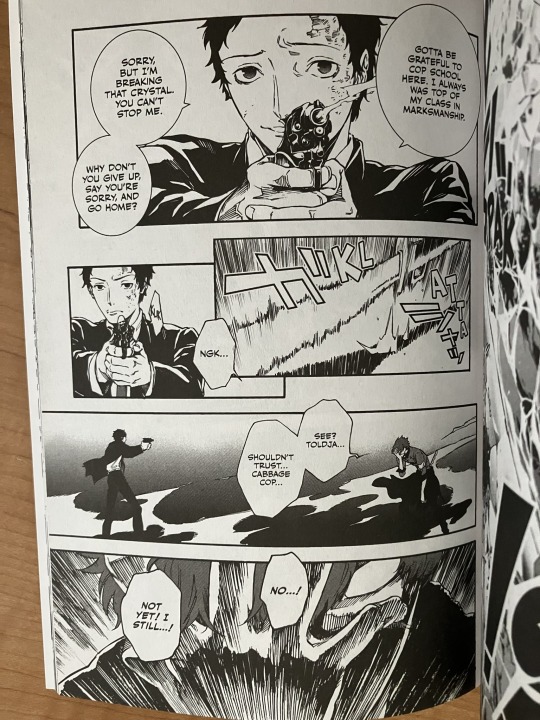

Like the volumes before it, I continue to both agree and disagree with the various translation choices. Using the page above as an example: I think that translating 道化 as “cabbage cop” rather than the literal meaning of “jester/clown”, especially after using the latter translation before in Vol 1, wasn't the best choice. On the flipside, I think that choosing to retain the presence of the “俺が...!” by including “I still...!” in the translation was a good call, because the specific ways that characters speak are a quintessential window into who they are as people.
(Re: "cabbage cop"; the translation also just suddenly spikes in referring to Adachi as “cabbage” in the aforementioned chapter and the one immediately following it, lol. Sho says “I wanted to help even a loser like you have a good time... So I went outta my way... to keep your lame... cabbage ass alive...”, though nothing in the Jap text even makes mention of “cabbage”, much less Adachi's ring title.)
[2]
Though I don't think I mentioned it in my previous posts, I also retain my opinion that the onomatopoeia in this translation is on point. Much like the original Japanese version, the chosen sounds make sense for the actions they're supposed to be accompanying. And this has been consistent throughout all volumes, rather than having ups and downs of quality... at least from what I can recall.
[3]
However, in reading this volume, I have come across my first genuine critique of the translation: in all the volumes thus far, quotation marks that should be carried over from the Japanese text are often ignored, to the immense detriment of the English reading experience. Fortunately, this problem hasn't extended to text emphasis (e.g. bolded text and bōten) or the rest of the punctuation, as they have been relatively good at preserving and employing those. But, to exemplify what the lack of quotations does to the text...
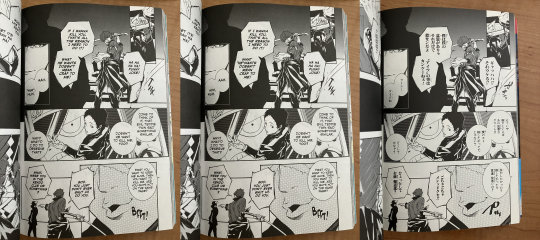


...just read through the side-by-side page examples I edited above. The difference should be apparent, hopefully. (Btw, edits are in the middle and on the bottom, respectively. Jap text is also included for quotation placement reference.)
The thing that baffles me about the lack of quotations, though, is that the translation does use them on rare occasion. For example, when Minazuki says “Welcome to 'his' world.”, and “Oh yes. You call those shackles 'bonds', don't you.”, those quotations exist in the Japanese text as 「“彼”」 and 「”絆”」. But in the vast majority of cases, even sometimes when the usage in Japanese is back-to-back, they're just kinda... glossed over? I really don't get it. ^^;
[4]
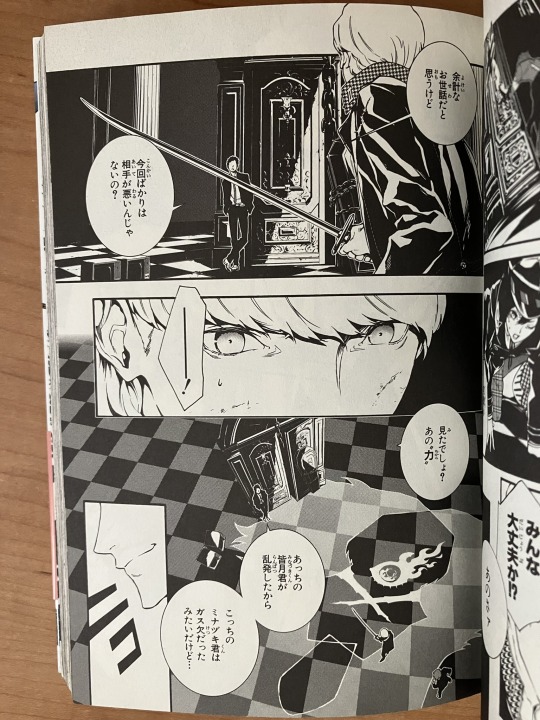
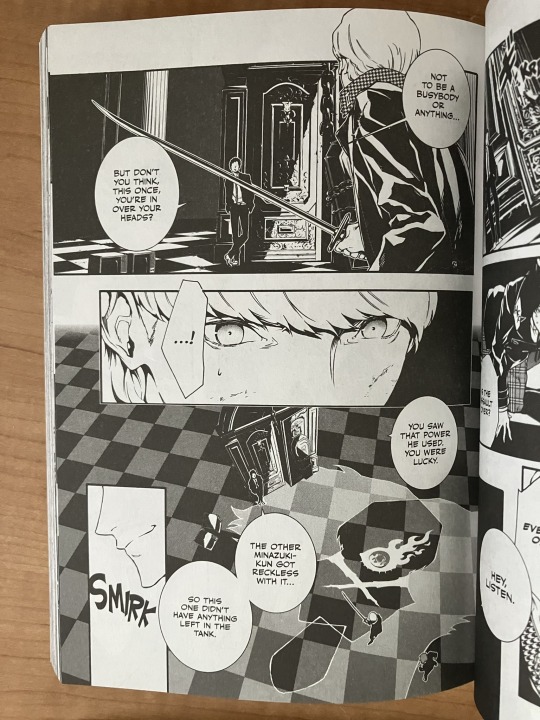
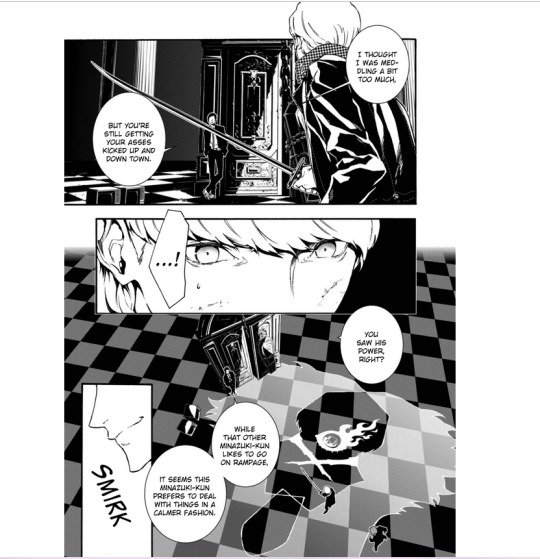
Moving on to a semi-related topic... The 皆月・ミナヅキ naming differentiation... uh... yeah. That's a weird thing. The simple part is that both are continuously referred to as “Minazuki”. The weird part is that the translation seems to want to refer to them as a "single but plural" entity? For example;
“I sat back and let Minazuki do their thing and they just wasted time forever.”
“There's much to sympathize with in their past. And they're clearly a victim of the Kirijo Group's darker side.”
"But we're gonna get back at that jerk. Both of 'im!".
"We can't let Minazuki get what they want! Stop 'em, Narukami!"
Which, in all fairness, the Japanese version is partially responsible for. Since [plural nouns are implied more than said outright in Japanese], and there are some occasions of 「皆月達」 (Minazuki-tachi; look under "Plural Suffixes" in the linked article) interspersed within the writing, I can understand how the "single but plural entity" translation came about. I'm not knowledgeable enough to know if interpreting just "皆月" as plural is always correct or not, but I can see why it might be tricky to interpret, at the very least.
So personally, my gripe with it is just the lack of distinction between instances of ミナヅキ and 皆月, as when which one is used is extremely important for story context. The characters awkwardly referring to Sho and Minazuki as singular but plural (in a purely-Eng reading) seems logical enough, since none of them have experience with plurality up until this point, and it's not like they're getting the opportunity to ask the system in question what form of address they prefer.
[5]
Oh, and while we're within the topic of “things that could be better off if a guide of important pre-established terms was implemented”...
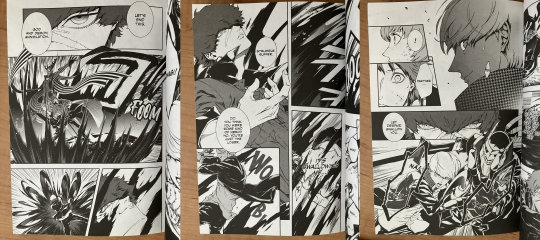
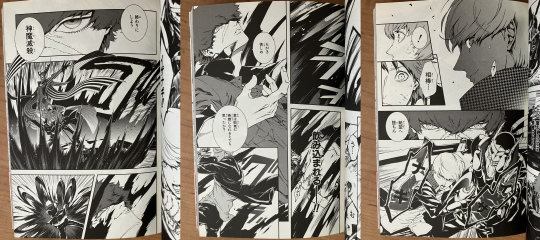
Y'all might think “holy heck, why did they turn Minazuki's edge factor up to 11 here?” with a slow cringe of disturbance or disgust. (Or maybe the laughter of vicious mockery. What do I know? Lol.) I concur! So I did what I do when I'm confounded by something: question everything about it. In doing so, I thought to myself; 'Hey, isn't that "hero" one one of Minazuki's VLs from Ultimax?' The answer was yes, it was, although it goes slightly differently. And what had the manga done back in previous volumes? Quote combat-VLs from the game during battle scenes.
So after transcribing the Japanese text of the lines in question into Jisho and Google Translate, as well as listening to the Jap versions of the EngVLs that I thought were similar enough, this is what I got:
“Writhe in pain!” = “Struggle. Suffer.” (「もがき 苦しめ」, [VL nb315a])
“Did you think you could become a hero?” = “Did you think you were some kind of hero? No. You're just the loser.” (「(君は敗者だ)英雄になれるとでも思ったか?」, VL nb342b)
(Note: The “No. You're just the loser.(君は敗者だ)” portion isn't a part of the VL in Ultimax, and aside from Adachi's Winner's Interview line for defeating Minazuki, I couldn't find anything similar in any of Mina's non-Story Mode Eng VLs. (I didn't check their Jap equivalents, as I still need to compile those lines into a searchable resource. >_>) So unless it's somewhere in Story Mode, it may have been ad-libbed in by the author.
“Let despair swallow you.” is less cut-and-dry. The Japanese text is 「絶望へ堕ちろ」; but when I listened to similar VLs (nb313a: “It's time to despair.”, nb317a: “Fall into darkness!”, nb320a: “Descend into the abyss!”), I only ever got partial matches. Nb313a has 「絶望」, while nb320a might have 「堕ちろ」, but my auditory comprehension of Japanese still needs a lot of work, so I may be mistaken. And nb317a matched nothing, from what I can hear. So unless this comes from a story VL, or a VL that isn't translated closely enough for me to sleuth back to the Jap VL... then I guess this might also be ad-libbed or frankensteined by the author?
Also, I'm not sure if it's coincidence or if there actually was some knowledge of the pre-existing translations, but the translator got “God and Demon Annihilation” correct, lol.
So yeah. "Edginess"? Not really more than normal when you have the context; but as a standalone experience, a great deal more than normal and would have realllllllly benefited from referencing the pre-established translations. The translator can take stylistic liberties with the whole rest of the translation, so I really don't think that employing such a small list would compromise their freedom?
(And if you want to see how the fan-Eng version handled it for comparison...)
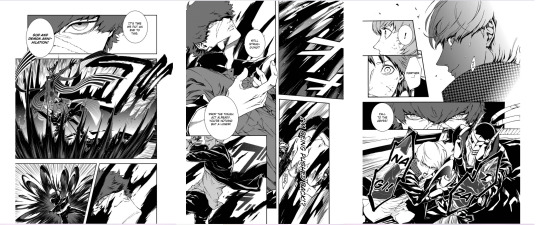
~~~~~~~~~~~~~~~~~~~~~~~~~~~~~~~~~~~~~~~~~~~~~~~~~~~~~~~~~~~~~~~
Additional Thoughts (6)
~~~~~~~~~~~~~~~~~~~~~~~~~~~~~~~~~~~~~~~~~~~~~~~~~~~~~~~~~~~~~~~
Alright, let's see, what else do I have left to cover...
[1]
Labrys doesn't talk a ton in this manga, so her “Southern, not Brooklyn/Boston accent” issue, while still there, isn't too glaring or easy to spot in a lot of lines. However... Honestly, I think it's just the translator's style overall to use a more 'Southern USA dialect' in their wording. Please note that I'm not an expert on this matter what-so-ever! But that's just the vibe I've been getting from how all of the characters have been speaking across the official-English volumes (and which isn't present in the fan-Eng translations).
[2]
I referenced the line briefly before, but the translation of Minazuki saying “...Yu Narukami. How about you throw away those shackles you cling to? They're dead weight to you. You can hardly fight, or even run, while you carry them. […] Oh yes. You call those shackles 'bonds', don't you.” in reference to Chie and Yosuke being incapacitated is brutal and I love it.
[3]
Before learning Kagutsuchi's name, Adachi calls Kagutsuchi "Mr. Crazy-Pants", lol. ("That's why you set up your whole little plan to use the power inside me to control that. And that means you've only been pretending to be best buds with Mr. Crazy-Pants.")
(Or in Japanese: つまり 君らは凶悪なクマ君に従っているフリをしていたってワケか || Though, I'm not sure if 'vicious Bear-kun' has a similar vibe to "Mr. Crazy Pants" in Japanese or not?) (Also fun note: Adachi's 「君ら」 (kimi-ra) is another pluralized address of Minazuki and Sho, so it's not always just their direct name getting that treatment.)
[4]
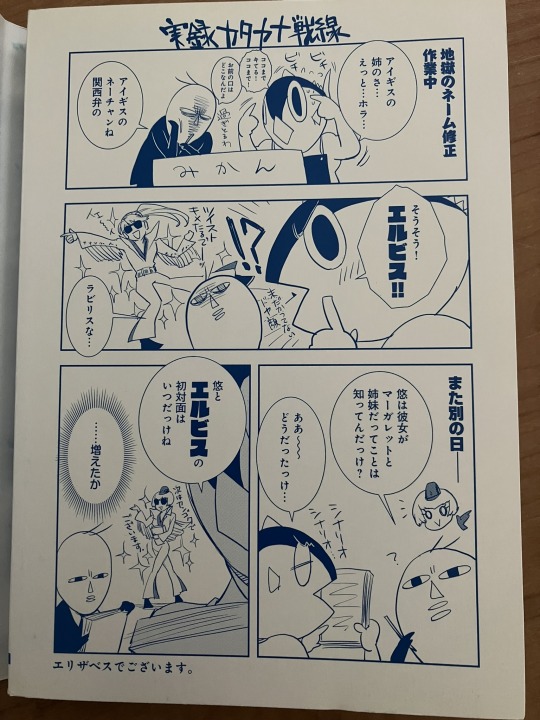
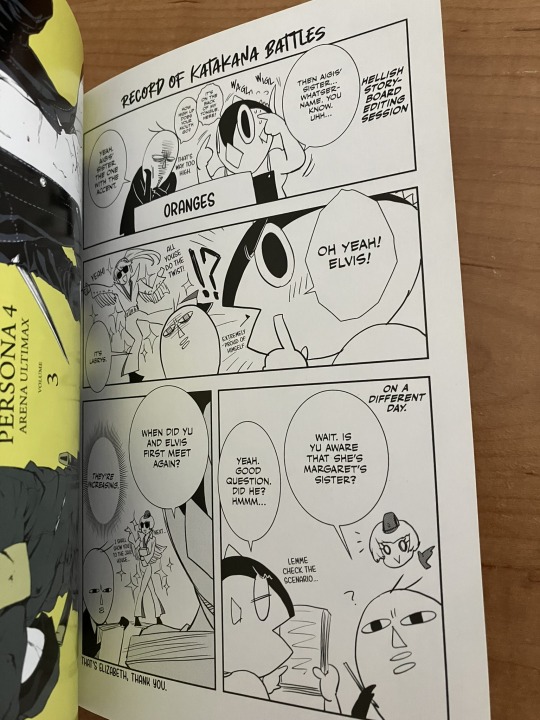
Labrys is secretly Elvis confirmed. Also, the author comics are to be found on the inside covers for the Eng translation, versus being on the outside covers (and obscured by the book jacket) in the original Jap print. This is something that only Vol 3 and Vol 4 do, as Vol 1 & 2 had enough space left to print the author comics on actual pages.
[5]
I think some of the gikun nuance might've been glossed over, but I honestly still don't know whether it's the subtitles or main words of gikun that are supposed to be "spoken" in-story. I only just found out the proper name for them while making this post, and the things I've read about them so far contradict each other, lol. Also, the official-Eng translation takes the third example below and translates it as both "Minazuki"(Sho) and "this child" at different points in Vol 3, which doesn't help my confusion, lmao.
(Checking out an instance of the first example as well, it gets translated from "ジュネスでミナヅキ[あの男]に襲われもしたが" to "That man. Minazuki? He attacked me at Junes...", occurring when Labrys and Naoto save Chie and Yosuke from Minazuki's attack in the faux-Tartarus lobby.)
E.g. "ミナヅキ [あの男]" ("Minazuki" subtitled with "that guy") - "皆月達 [あのコら]" ("Sho & Minazuki" subtitled with... my guess is "those kids", but the 'ko' is katakana and not kanji, soo...) - "皆月 [あの子]" ("Sho" subtitled with "that boy")
[6]
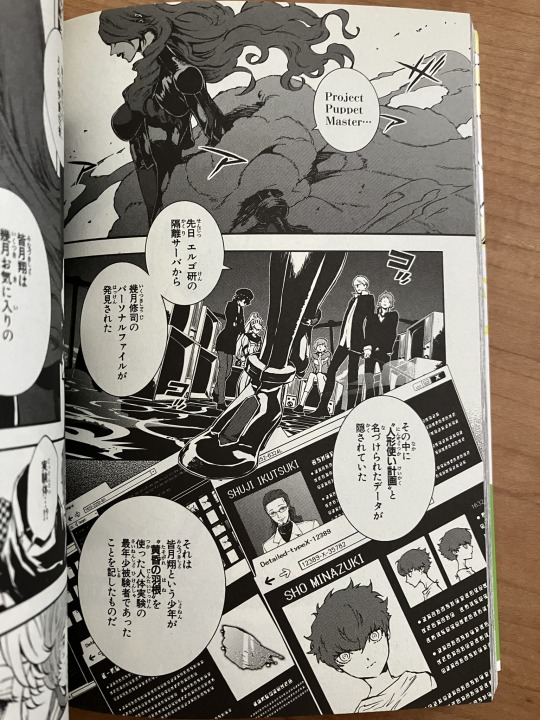
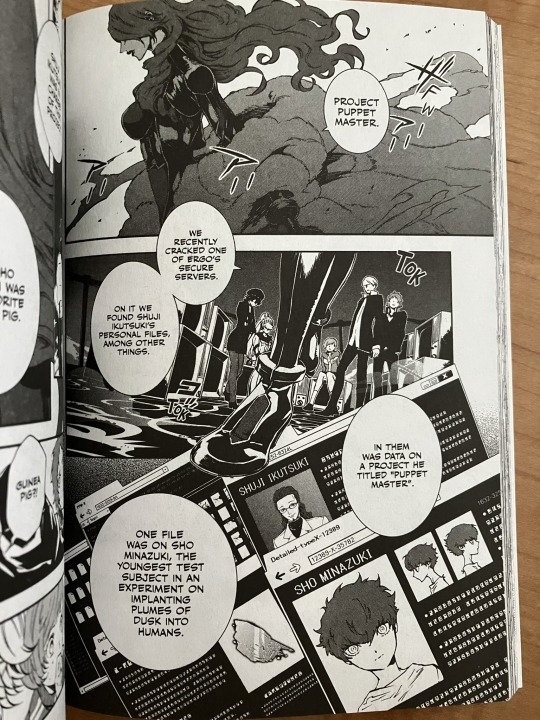
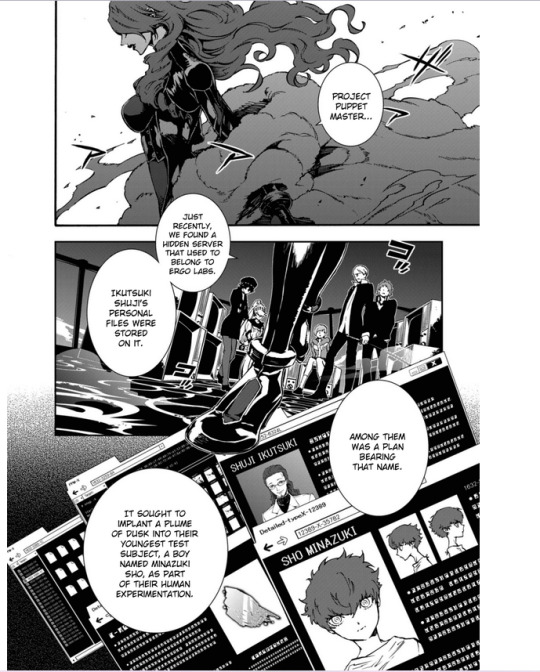
Take this with a huge grain of salt, because I don't know enough Japanese to certify that the official-Eng translation shouldn't be pluralized the way that it is, but, uh... the possibility that there's more than one hidden server and more than just Sho as attempted Plume-implantation subjects??
If the translator had been reliably sticking to the pre-established translations, I would give more weight to the possibility of it being a retcon of how the game presents the information. But since it doesn't seem like the translator is familiar with the original material... I'll personally just add this one onto the “fan-characterization fodder” pile and continue hoping that P3RE might give us more clarity on what exactly the experiments of 1995-1999 entailed, lest my fluency in Japanese reach the point that I can ascertain the answer. TuT
For anyone who wants the Japanese lines in transcribed form:
先日 エルゴ研の隔離サーバから 幾月修司のパーソナルファイルが発見された
その中に”人形使い計画”と名づけられたデータが隠されていた
それは皆月翔という少年が”黄昏の羽根”を使った人体実験の最年少被験者であったことを記したものだ
~~~~~~~~~~~~~~~~~~~~~~~~~~~~~~~~~~~~~~~~~~~~~~~~~~~~~~~~~~~~~~~
Misc. Pics
~~~~~~~~~~~~~~~~~~~~~~~~~~~~~~~~~~~~~~~~~~~~~~~~~~~~~~~~~~~~~~~
(If you wanna see the fan-Eng in higher quality than the screengrabs I used, you can find it on Mangadex [here].)

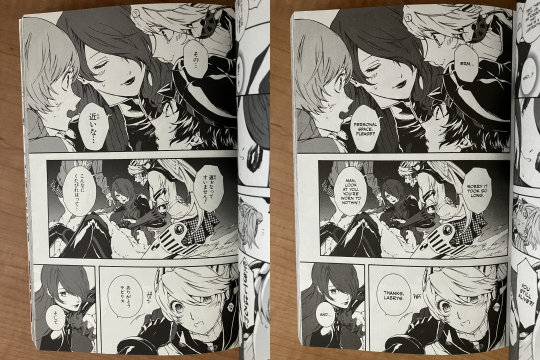
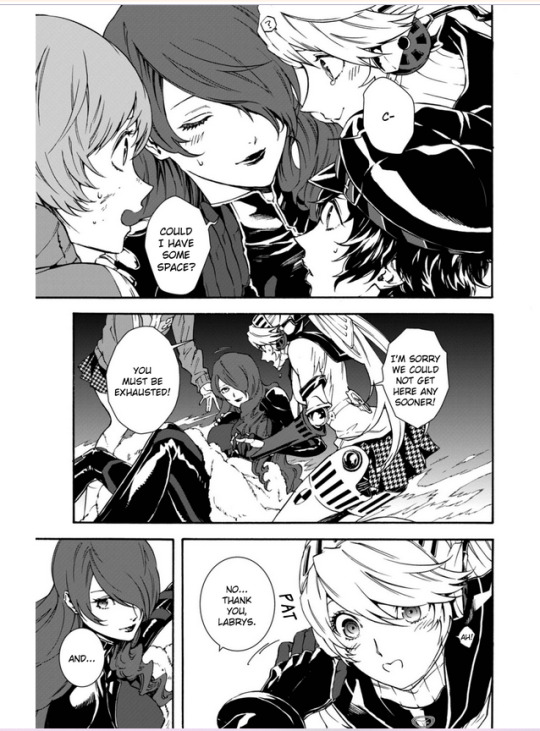
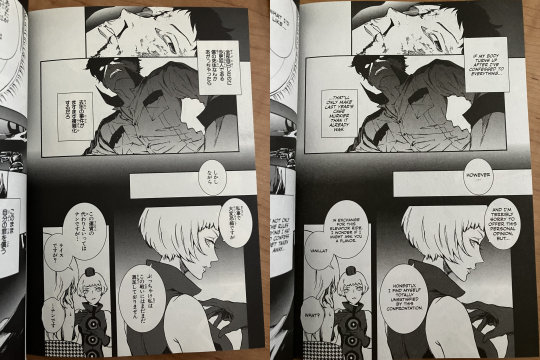
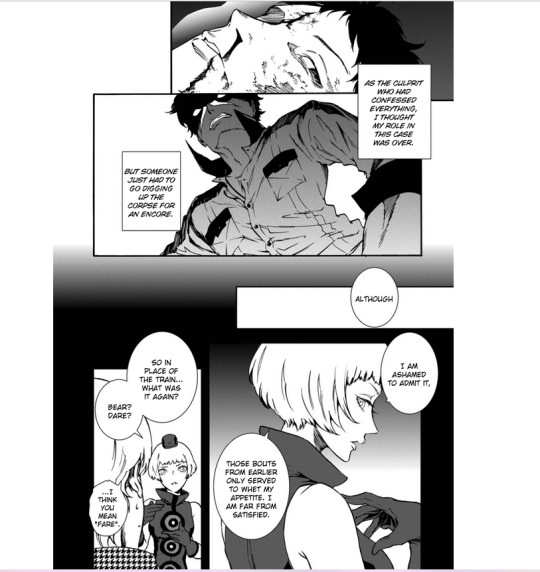
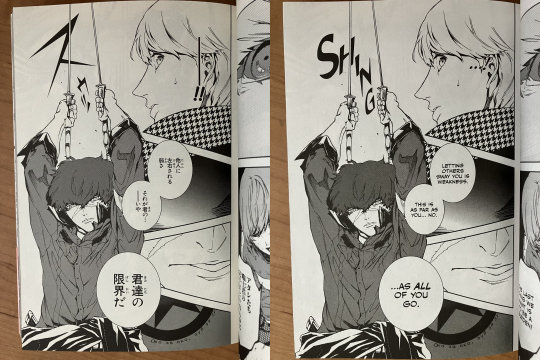

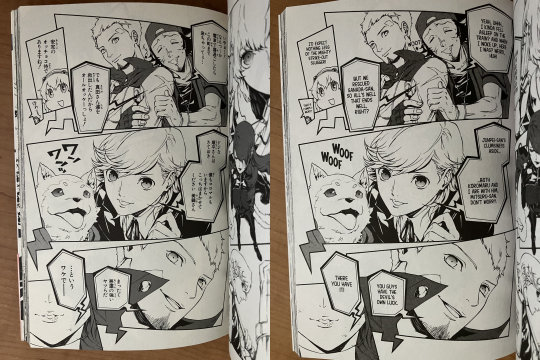
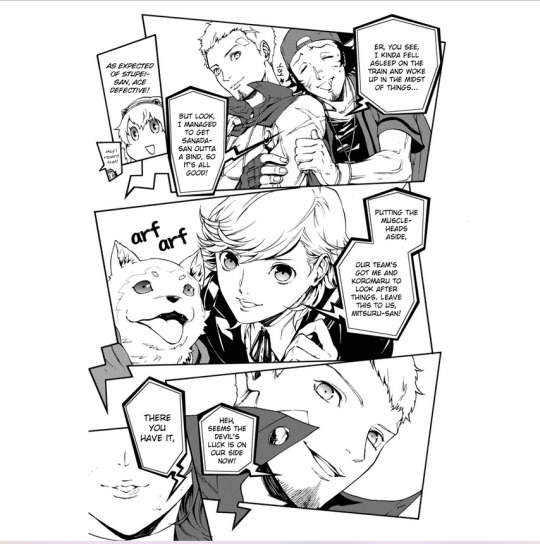
#Sho Minazuki#Yu Narukami#Mitsuru Kirijo#Tohru Adachi#(tagging Mitsuru mostly because of the cover art)#(tagging Adachi because he appears in about half the pages pictured here)#(Sorry everyone; I have no clue how it got wordier than the last review post. I tried to segment it for easier reading at least. >_>;)#(Fun fact: I don't usually describe things as “edgy” -- including Minazuki -- )#(-- but the 'dark' non sequitur dialog was exorbitant enough to defy other applicable descriptors lol.)#(Also if anyone has an enby Sho or Mina headcanon y'all might have fun with this translation lol.)#P4AU/P4U2 manga#Persona 4 Arena Ultimax#P4AU#P4U2#Persona 4 The Ultimax Ultra Suplex Hold#ペルソナ4 ジ・アルティマックス ウルトラス―プレックスホールド
15 notes
·
View notes
Text
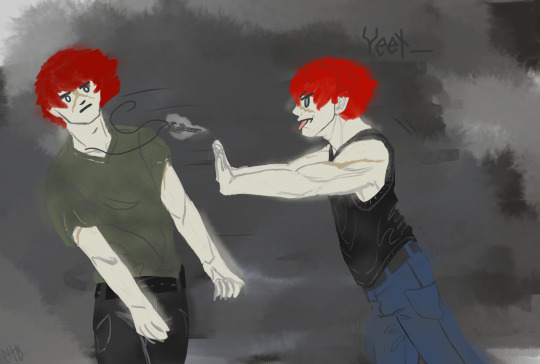
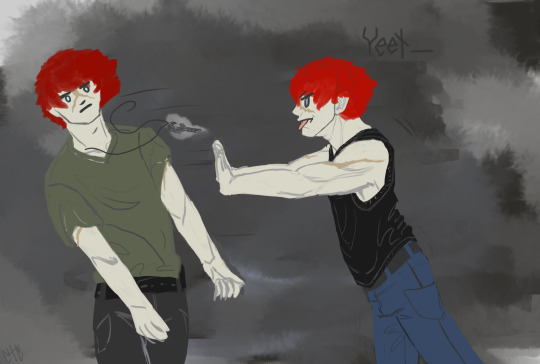
Yeet— (and then their physical body stumbled into a wall because Sho was impatient and didn't give them time to stabilize it before switching)
For context, this doodle was like half to jot down a musing of "what if the moon key denoted the fronter, rather than only Sho", so that's Minazuki's neck it's flying off, not Sho's.
There's also a sillier version of the coloring below the cut for anyone who wants to see it. /o/
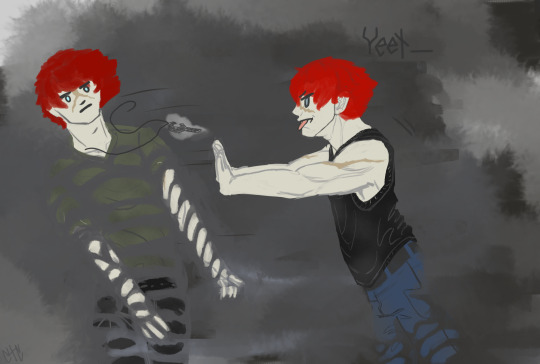
Shoved so hard that he dematerialized into little blobs, lol.
(AKA: I messed around with a lot of coloring styles before realizing that Sho and Minazuki (seem to) canonically have a crisp-view headspace, so trying to depict otherwise was gonna be inaccurate, haha.)
#Sho Minazuki#SystematicallyArtistic#Was Minazuki expecting Sho to suddenly shove him out of front? No. But he's not really surprised that Sho would do such a thing either lol.#(If anyone's wondering; I don't think the key is supposed to be exclusive to Sho; but we only have 2 IW scenes to ref so it's hard to say.)#(I (now) like to use it to denote the fronter personally; since there's a lot of ways you can differentiate Sho and Mina in IW scenes.)#(In the manga for example you've got the key and bandages as the differentiator in one scene -)#(- and clothes versus none in the other one. Of course there's also their expressions and postures; - )#(- but stuff like this can help to further clarify it at a glance I think.)#(The key doesn't even always have to be included; it's more a reflection of their phys body's appearance; at least how I'm interpreting it.#((Symbolic instances aside. Inner-symbolism isn't tied to physical appearance. But I digress.))#multi x multi = multiplicity
1 note
·
View note
Text
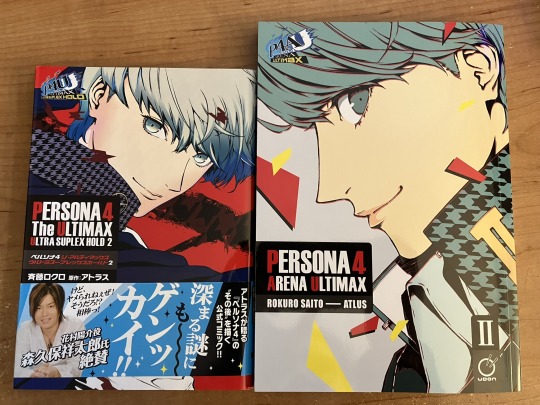
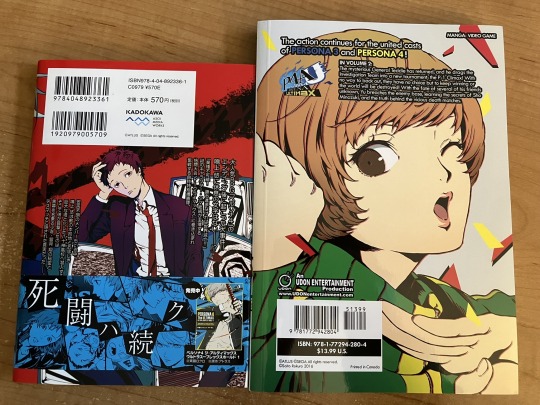

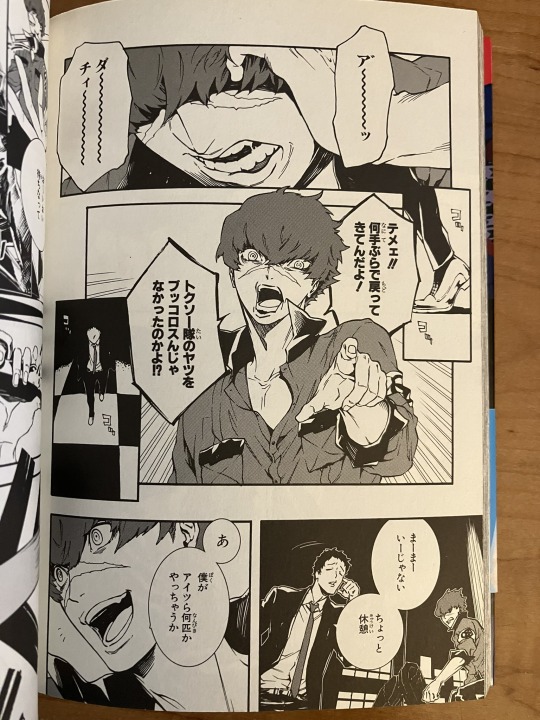
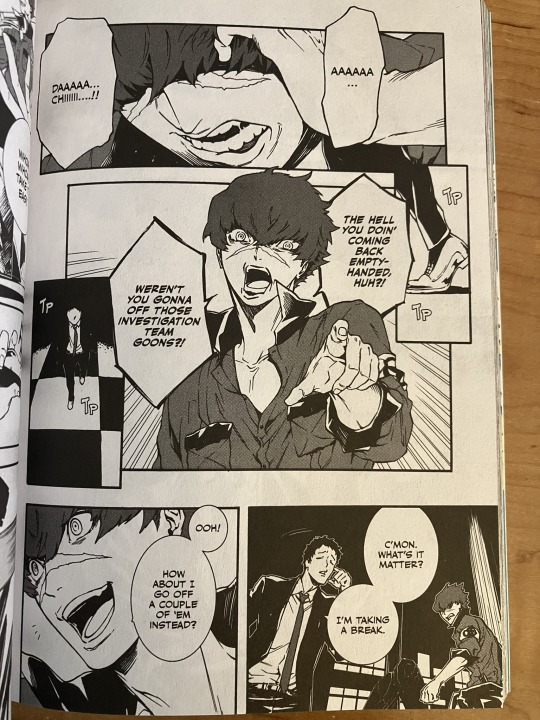
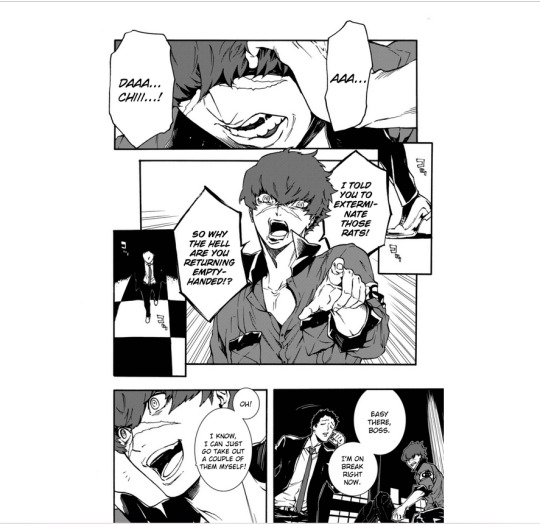
Time for English P4AU manga volume 2! Like last time, shenanigans are below the cut and requests for page comparisons are always welcome.
~~~~~~~~~~~~~~~~~~~~~~~~~~~~~~~~~~~~~~~~~~~~~~~~~~~~~~~~~~~~~~~
Overall Opinion
My initial read-through this time was done while I was sleep deprived, so take my impressions with a grain of salt, lmao.
I think the the three most memorable impressions I took away from the translation this time around were:
The syntax felt more markedly stilted to me than last time. As well, the writing was a bit awkward in some places, though I'm unsure if that's a trait of the original Jap writing or if it only arises from attempting to format it into Eng grammar and culture.
The fan-Eng translation took creative liberties with some words that I think were better served by the official-Eng's translation staying truer to the Jap text. Also, the official-Eng transl provided interesting insight into some things that the fan-Eng transl didn't, which I'll go into a bit below.
The scene where Minazuki ambushes Naoto was mistranslated as Sho being the speaker, despite the Japanese text clearly being Minazuki's language patterns. TuT
Overall, I had a positive impression of it and would say that it's worth reading for those who don't mind a few errors and awkward lingual choices.
As for the ミナヅキ・皆月 naming differentiation... Thus far, both Sho and Minazuki have been "Minazuki", as per adherence to the Jap naming scheme. No alternative font, font effects, subtext, special text bubbles, nor anything to clarify the distinction. However, I'm personally reserving judgment until I get my hands on Vol 3, as I have a sliver of hope that the protagonists knowing the difference is permission for the audience to know the difference. I'm not sure how much I actually believe in said sliver, but I'm willing to give the benefit of the doubt at the very least. ^^;
~~~~~~~~~~~~~~~~~~~~~~~~~~~~~~~~~~~~~~~~~~~~~~~~~~~~~~~~~~~~~~~
Illustrations and Author Comics
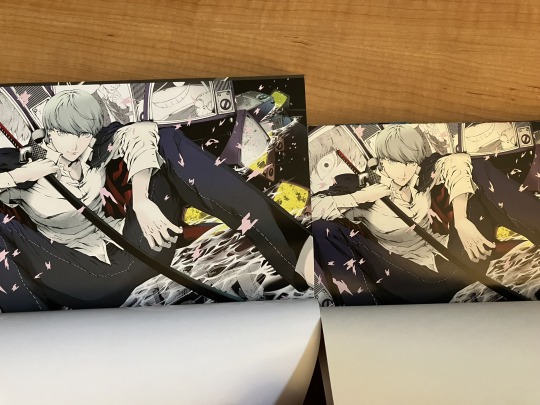
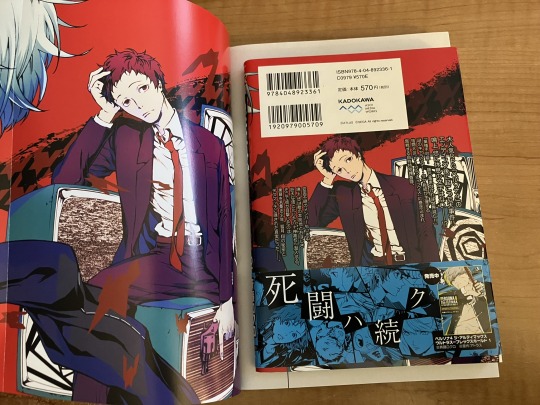
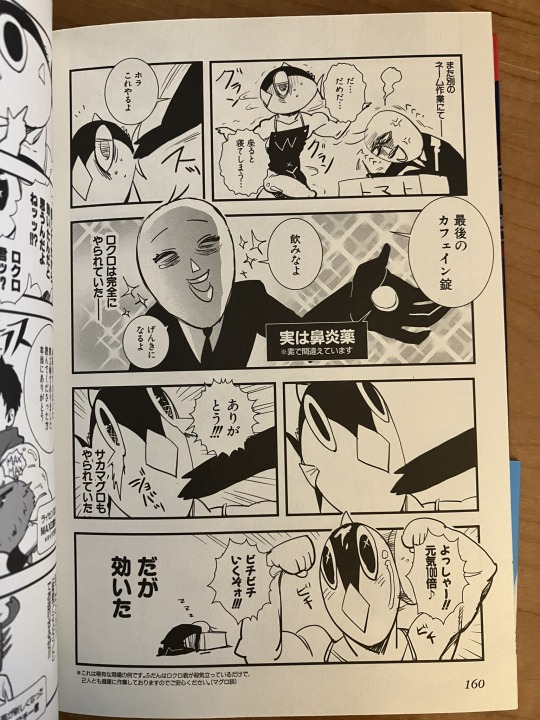
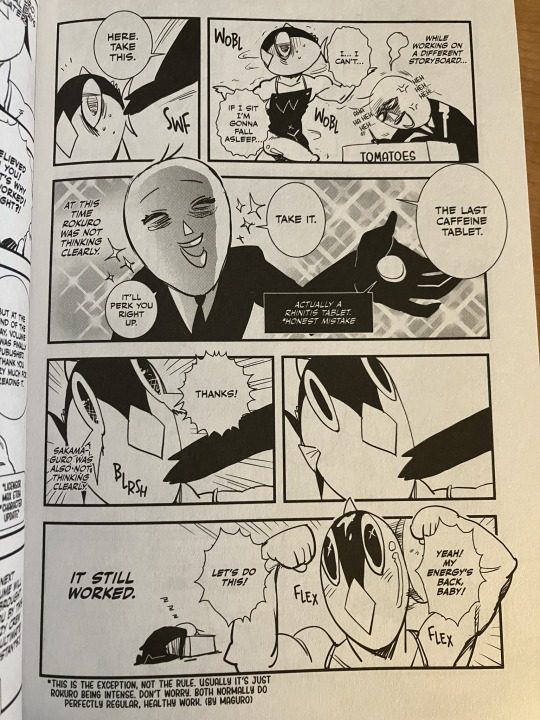
Vol 2 still has the illustration pages and end-of-volume author's comic! The exclusive edition also has the fold-out poster of the original cover, of course.
~~~~~~~~~~~~~~~~~~~~~~~~~~~~~~~~~~~~~~~~~~~~~~~~~~~~~~~~~~~~~~~
The mistranslated ambush scene was, in fact, Minazuki
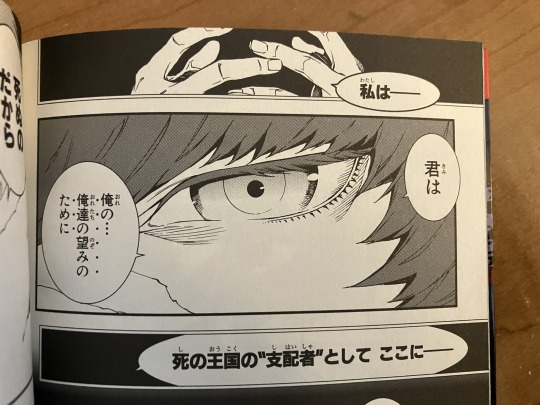
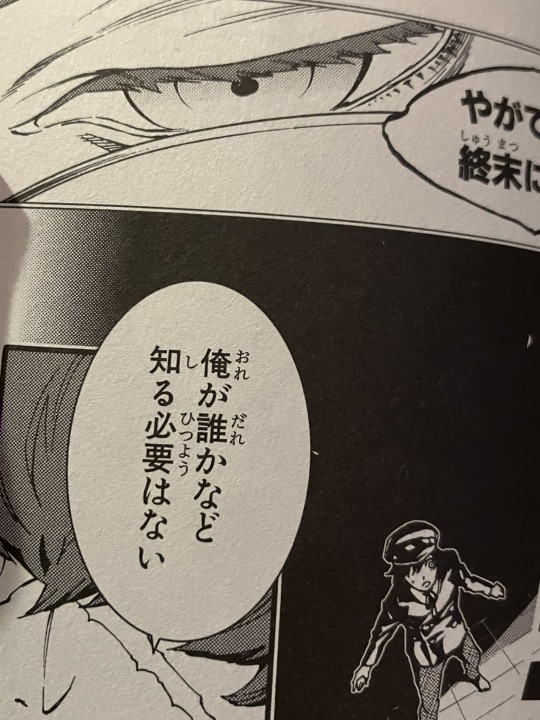
So y'all can see for yourself that the text in the Minazuki-Naoto ambush scene clearly uses 俺 and 君 rather than 僕 or テメエ. (Though to be fair, I've actually found an instance where Sho uses 俺 in Vol 2. The line is 「テメエこそ俺にカンショーすんじゃねえ!!」, towards the start of Ch14 when Kagu's mocking his Ikutsuki issues (so Sho's pretty irate). He then returns to using 僕 immediately after; and as there are no visual indications that he switched with Minazuki to say this, I'm pretty confident that this is an exception and not the rule, lol.)
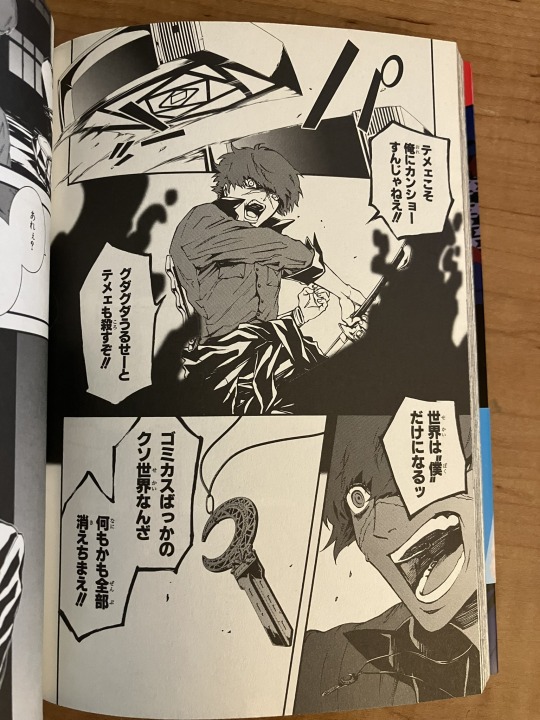

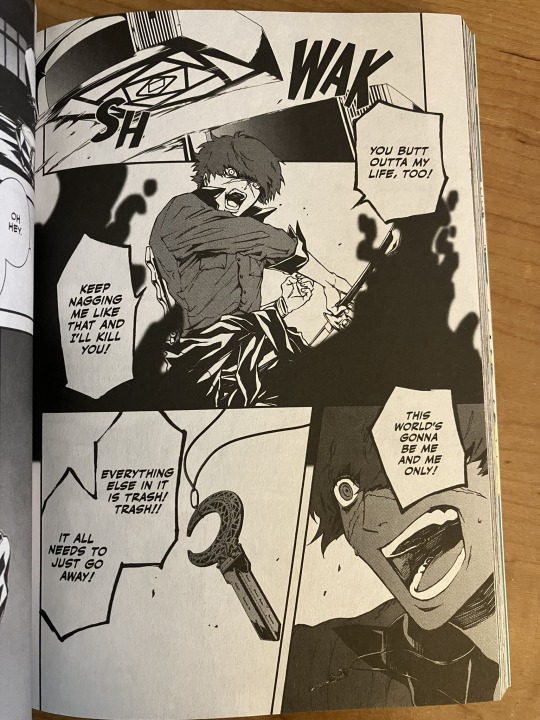
(Said instance of Sho using 俺)
The non-pronoun words should be indicative of whether it's Sho or Minazuki speaking as well, but I'm not fluent enough in Japanese to be able to go into detail on those in this post. ^^;
Overall, I think the translator has been doing pretty good at nailing Sho and Minazuki's respective patterns of speech and employing them in the correct moments – and they go back to getting it correct for when Minazuki reveals himself at the end of Vol 2, too. This one scene just got goofed for some reason I guess. P:
~~~~~~~~~~~~~~~~~~~~~~~~~~~~~~~~~~~~~~~~~~~~~~~~~~~~~~~~~~~~~~~
Translation Upsides
Translation Win 1: Ch15's name was translated properly! The Jap name is 「幻月」 (gengetsu), but the fan-Eng translated it as "Minazuki", which would be 「皆月」 if it was in kanji form. Which – I mean, it is the chapter that Minazuki first formally introduces himself as "Minazuki", so it makes sense? But I personally think that "Paraselene", aka the phenomenon called "moon dogs", is a much cooler and more fitting name for how the chapter goes, including Minazuki's reveal. (-v-)
Translation Win 2: At the start of Ch14, Sho says "Tch! Must've fallen asleep. Hate that dream.", which implies that he's had that dream before. I don't know enough Japanese to know if the original line of 「チッ 寝ちまったのか... 嫌な夢だぜ」 also means a recurrence specifically, but it's still interesting fanon-characterization fodder nonetheless.
Puppet-Ikutsuki's following dialog was also a pretty interesting translation, I think. For example: "The smarts to rule the mental battle. The strength to command the physical battle..! You excel in both! In fact, I'd say you're my greatest masterpiece! I'm proud!"
Translation Win 3: In Ch13, Kagutsuchi's first line of reaching out to Sho is translated correctly as "wings of death", versus the "Plume of Dusk" that the fan-Eng transl uses. Conceptually, they're probably the same thing, but literally the word used is 「死の羽根」 (shi no hane), not 「黄昏の羽根」 (tasogare no hane; which is typically "Plume of Dusk" in Japanese). And this isn't a mistake on the part of the Jap writer either, as far as I can tell, as 「黄昏の羽根」 is used in other places, such as when Labrys is explaining what Plumes are to the Investigation Team ([see here]).
Additionally, though the syntax was exceptionally awkward, I thought the essence of Kagu's dialog in this scene was translated pretty well. And honestly, it's fun to headcanon that Kagu could only communicate limited concepts or words before establishing a stronger connection, thus explaining why the syntax is stilted like: "Your suffering will continue. Eternally. End it."
Translation Win 4: It's a small detail, but Ikutsuki specifically saying "If this is all it takes to kill him... Then that's just how weak he was." is heckin' brutal. Switching to past-tense like Sho's already done and over with when he's still alive and listening, oof. (For comparison, the fan-Eng translated it as "If he dies here, it'll just mean he's worthless.")
~~~~~~~~~~~~~~~~~~~~~~~~~~~~~~~~~~~~~~~~~~~~~~~~~~~~~~~~~~~~~~~
Translation Downsides
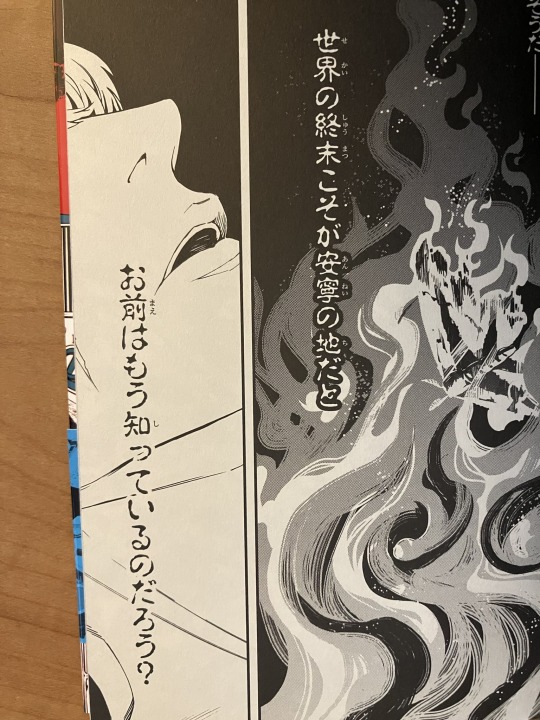
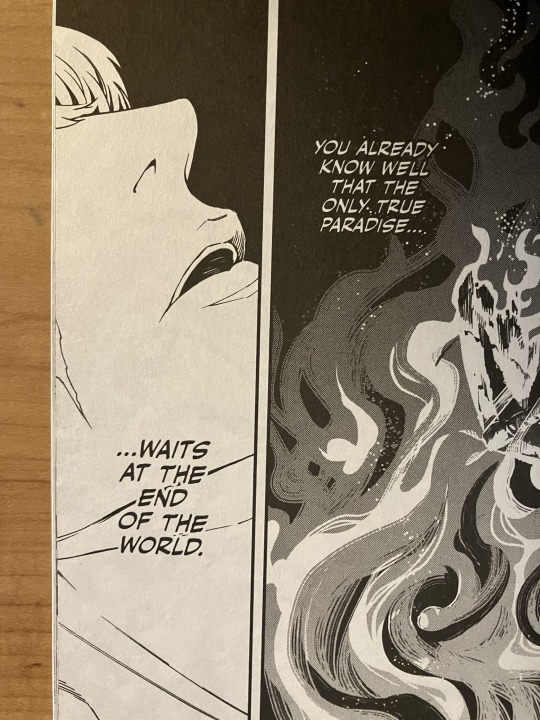
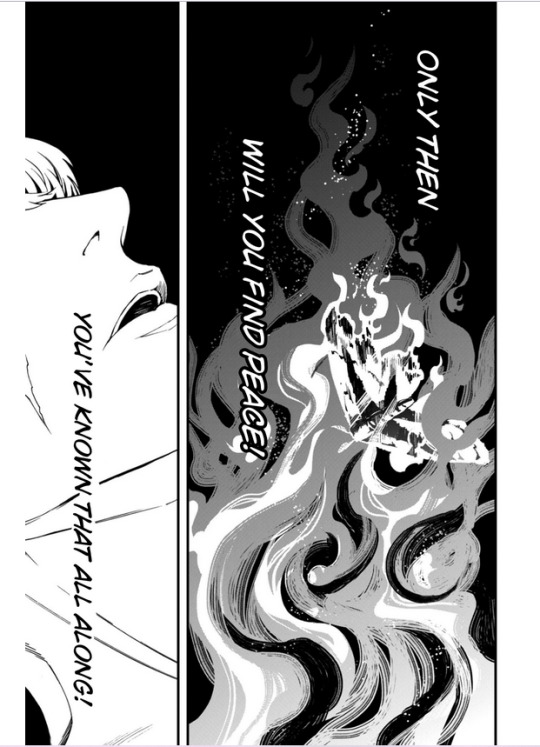
Typography Loss 1: Kagutsuchi's text still lacks a cool font like the Jap version has, and that reduces the artistic impact a bit, IMO. In the Jap version, it looks a bit like the text was scorched onto the writing surface – which, given Kagu is a kami of fire, is a pretty apt vibe. While in Eng, he's relegated to the font that all the other characters use while speaking. It's probably better like this for readability purposes, but from a stylistic perspective it's a bit sad.
(Also fun fact: In Jap, the Shadow-Kanji and Shadow-Chie puppets briefly use this burnt font in their speech bubbles. It's for about 1-2 bubbles each (S-Kanji calling forth a fighting ring, S-Chie being in disbelief that Naoto had been holding back against her), and the rest of their dialog is in various other fonts. I'm not sure if there are other instances of non-Kagu characters using it beyond that, nor what exactly it's intended to imply through these additional instances, but it's interesting to note.)
(Additionally; examining it more closely, the Japanese typography is really dynamic in general, which is pretty cool. I'm not sure if that dynamicness invalidates any literary significance to Kagu's burnt font though, lol.)
~~~~~~~~~~~~~~~~~~~~~~~~~~~~~~~~~~~~~~~~~~~~~~~~~~~~~~~~~~~~~~~
Translation Intrigues and Amusements
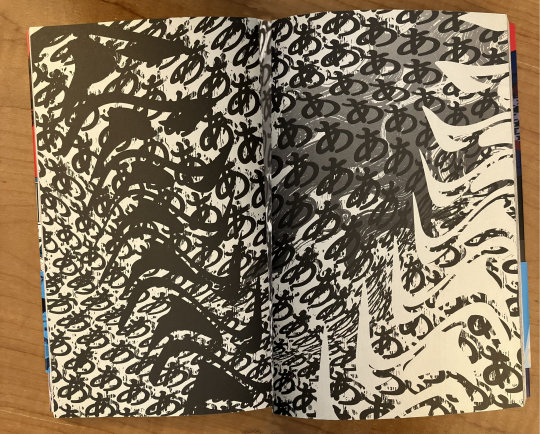
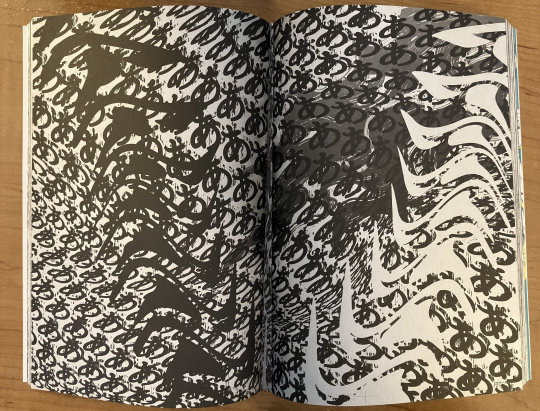
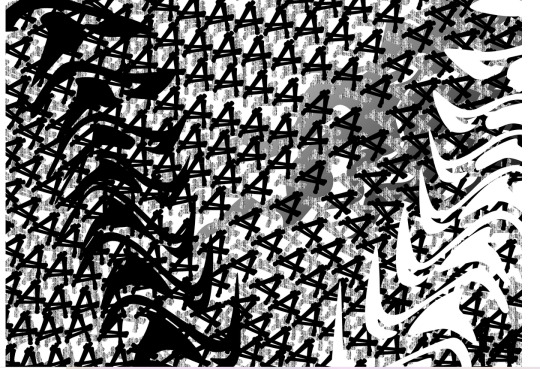
Typography Intrigue 1: They left the page of fiery "AAAAAAAAAAAAAAAAAAAA"s as-is, rather than trying to turn the 「あ」 and 「ア」 into "a/A". Which, while I immensely respect the fan-Eng version for trying to transcribe that artistic text, I think the horrific vibe comes through a bit better with the original text and art preserved. (Maybe in part due to the wave effect on the text having 3 dimensions rather than just 2?)
Translation Intrigue 2: In Ch13, one of the double page spreads is translated as "This world doesn't need anyone. There's no one in this world." Meanwhile, in the fan-Eng version, it's written as "I don't need anyone! I'm fine by myself!"; and the original Jap text is 「この世界には誰もいらない この世界には誰もいない」 (the same line, just minus the ら).
I personally prefer the fan-Eng's take on it, as the official-Eng's version confused me for several weeks after the fact; but as I don't understand the nuance of the Jap version, I have no clue as to which Eng interpretation is more accurate. >_>;
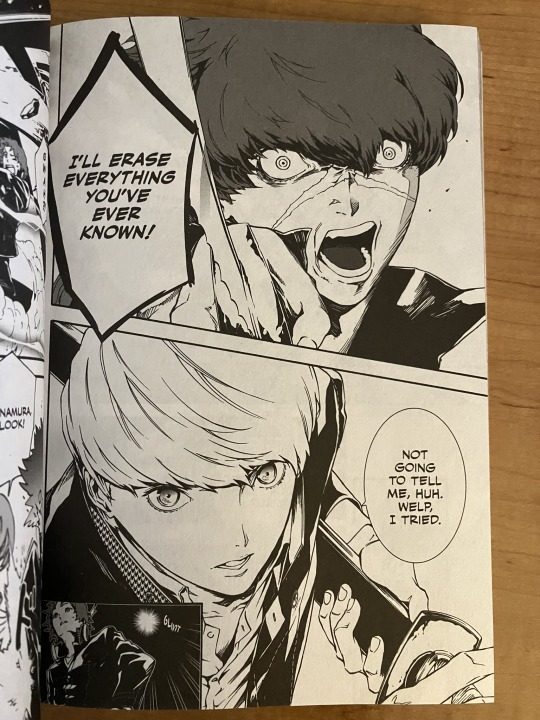
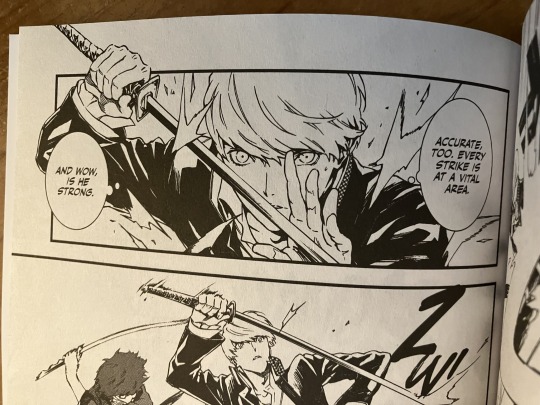
Translation Amusement 3: Yu apparently has the word "welp" in his lexicon. And on the second page, the way that his dialog is worded makes it sound like he's smitten with Sho, lmao.
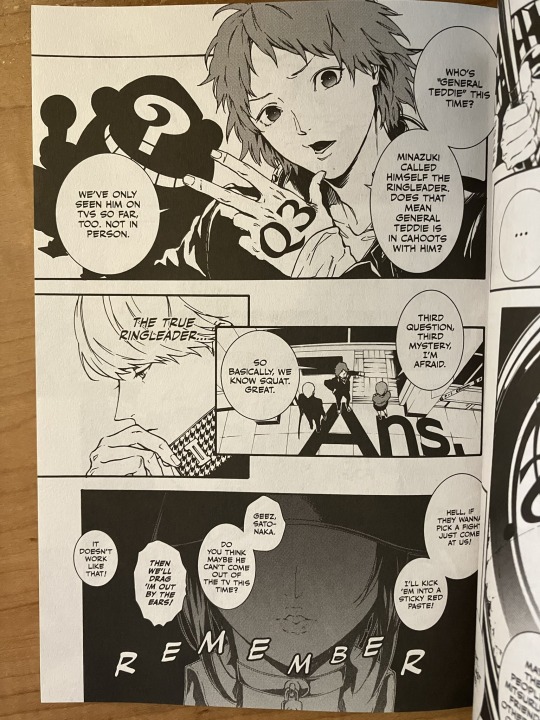
Translation Amusement 4: Yu's so used to his friends' antics at this point that he can just tune them out like that, lol. I also just appreciate Chie and Yosuke's dialog here in general.
Translation Intrigue 5: Ch13's title is translated as "Crimson Memories" in the official-Eng transl, versus fan-Eng's "Scarlet Memories". The original Japanese words are 「緋色の記憶」.
Translation Intrigue 6: What's typically translated as "the rules of this world" (regarding Adachi) is translated here as "reality's rules". The original Jap text (in this manga at least) is 「現実のルール」, not 「世界のルール」; so literally "reality", like "reality of the situation", and not 'reality' like "world/society".
Translation Intrigue 7: Ikutsuki's iconic "the death of everything... but also the beginning" speech is translated a bit differently compared to the fan-Eng, and drastically different compared to Ultimax's EpP3 Ch1. It keeps the same general concepts, but the cadence, word choices, and syntax are executed differently.
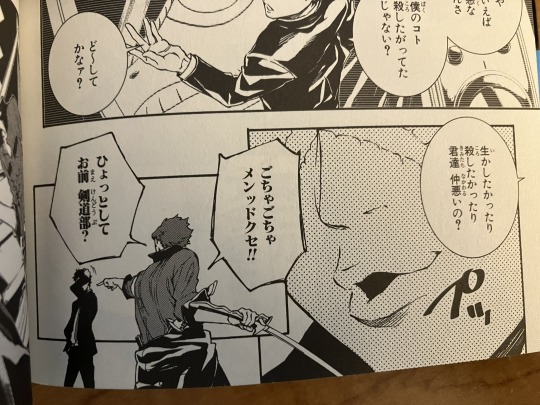
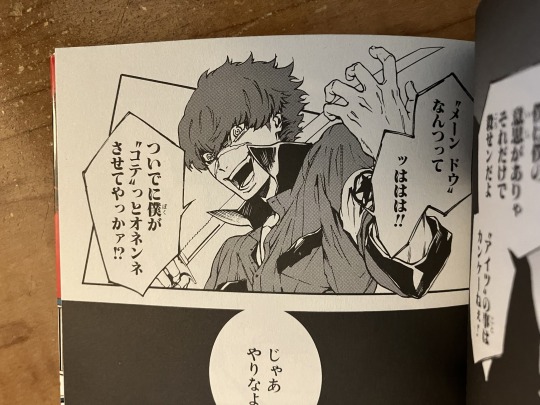
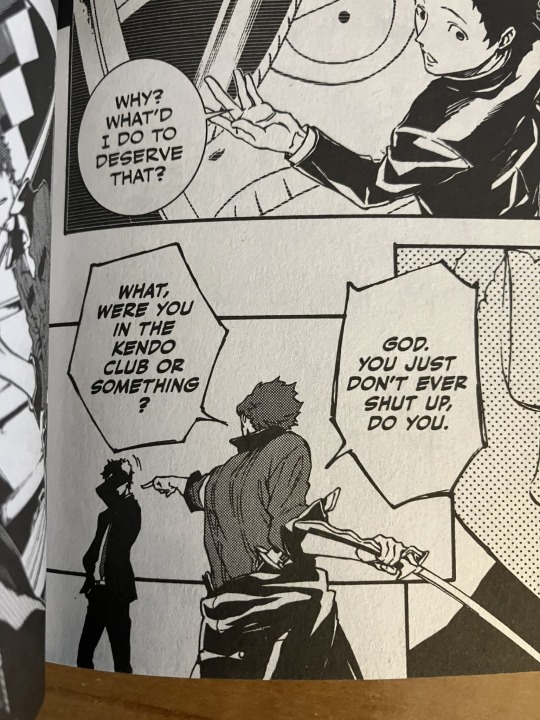
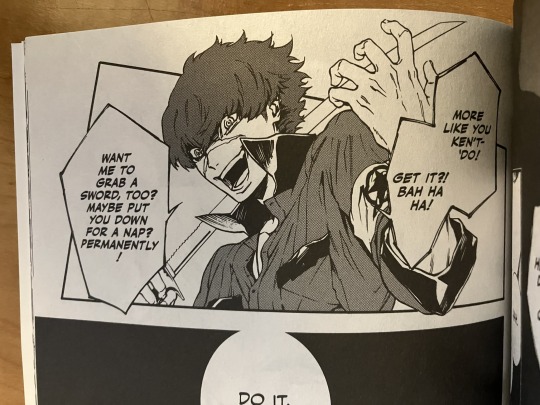
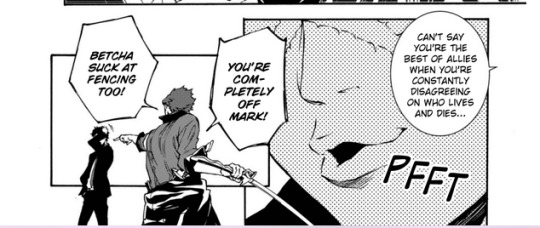
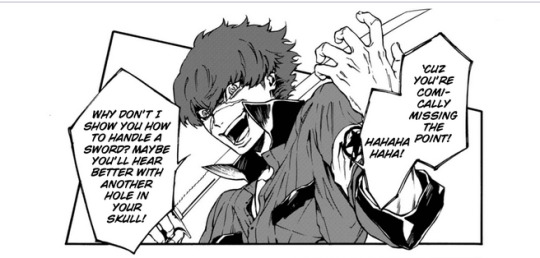
Translation Intrigue 8: Side-by-sides of the kendo/fencing pun because I think the differing translation choices, as well as the original context of the pun, are interesting.
~~~~~~~~~~~~~~~~~~~~~~~~~~~~~~~~~~~~~~~~~~~~~~~~~~~~~~~~~~~~~~~
(If you wanna see the fan-Eng in higher quality than the screengrabs I used, you can find it on Mangadex [here].)
#Sho Minazuki#Yu Narukami#Chie Satonaka#(tagging Chie mostly because of the cover art; in case any fans of hers want to see it)#Shuji Ikutsuki#HinoKagutsuchi (Persona)#P4AU/P4U2 manga#Persona 4 Arena Ultimax#P4AU#P4U2#Persona 4 The Ultimax Ultra Suplex Hold#ペルソナ4 ジ・アルティマックス ウルトラス―プレックスホールド
10 notes
·
View notes
Text
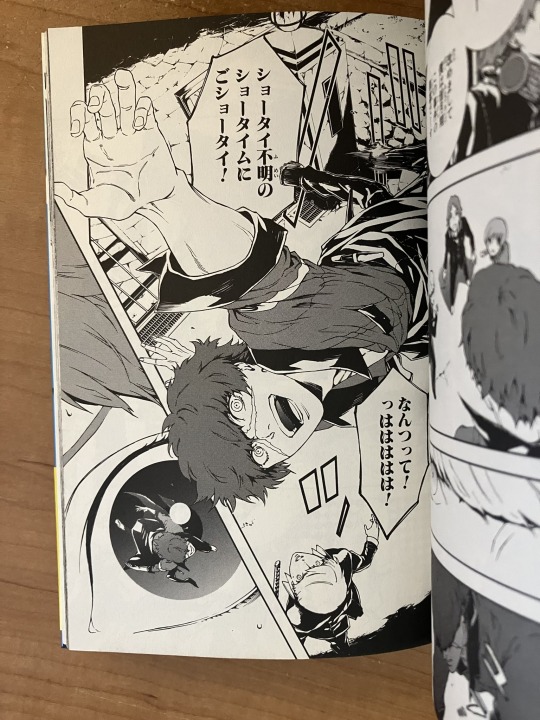
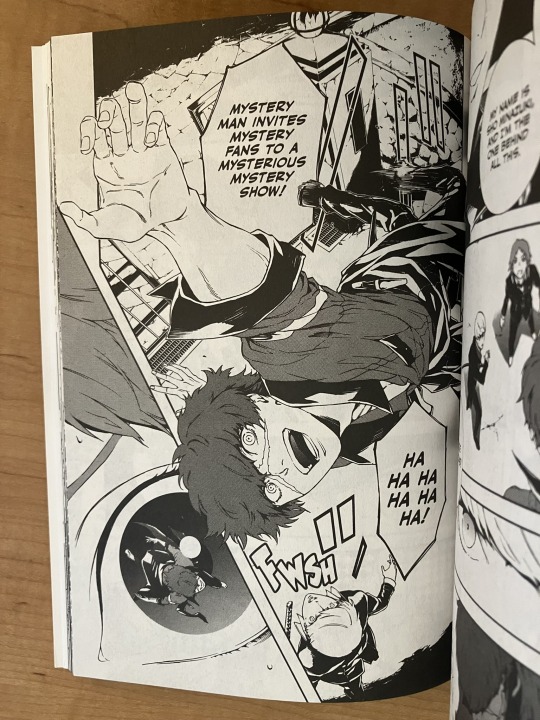
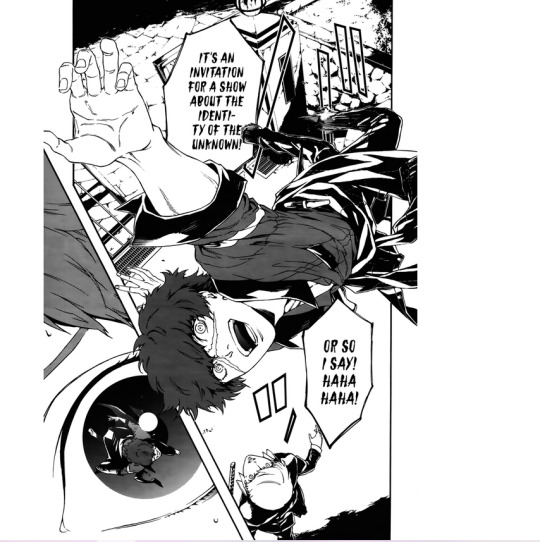
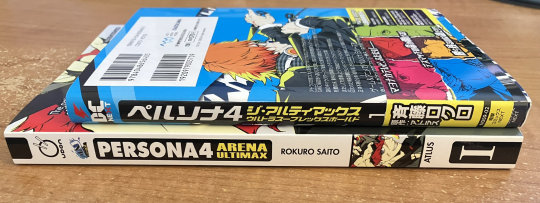
I'm a bit late to the party, but I recently got the first volume of the English P4U2 manga!
I am absolutely geeking out over comparing the Jap, Eng, and fan-Eng versions, so if anyone has any pages or panels they want to see side-by-side across the three, let me know and I'll make a post for you! I can't do the entirety of the book of course, but I can do a few pages at least.
--------------------
(Below the cut is my initial opinion on the quality of the translation work, some comparisons between various details of the Jap volume and the Eng volume, and some more manga page side-by-sides.)
--------------------
As for my impression of the translation work so far... To me, it feels like the translator was trying to preserve more of the original Japanese language/culture than Eng-P4AU chose to? Not in every instance though, as there's definitely cases where vernacular translations are utilized instead of literal. But where more literal translations are favored, the wording can feel a little awkward or OOC in English.
Even still, it's a pretty cohesive reading experience, in my opinion.
Also, they translated "Plume of Dusk" correctly, which is a relief. I was worried that some of the technical lore terms might get bungled by literal translations, lol. Conversely, while I'm glad that they didn't preserve Jap-Teddie's "-kuma" habit, and happy that they included a few bear puns in accordance to Eng-Teddie's speech habits, I do lament the low quantity and diversity of bear puns in Teddie's speech overall. Maybe there just wasn't a lot of good places for those in this volume though, so I'll have to see going forth.
Oh- and I noticed that some of the background signs and text got translations as well, which I think is really neat. (I don't read enough manga to know if that's just a standard feature of manga translations though, lol.)
Granted, this is just my first-read first impression, and I don't know enough Japanese to know if some lines may be translated less accurately or not. Plus, I tend to be on the lenient side when judging the quality of creative works. So please refer to other opinions as well if you're trying to decide the quality of the translation for yourself!
--------------------
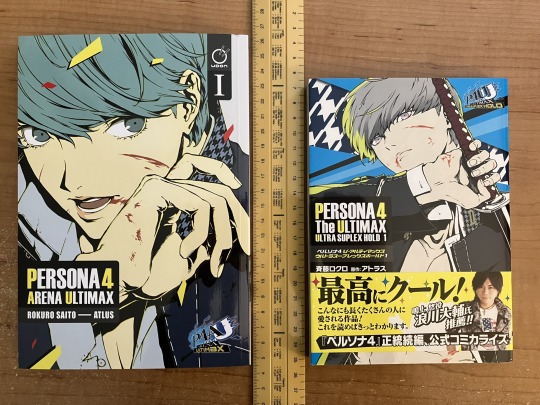
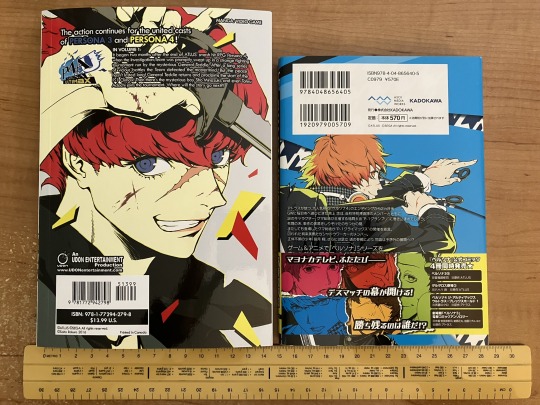
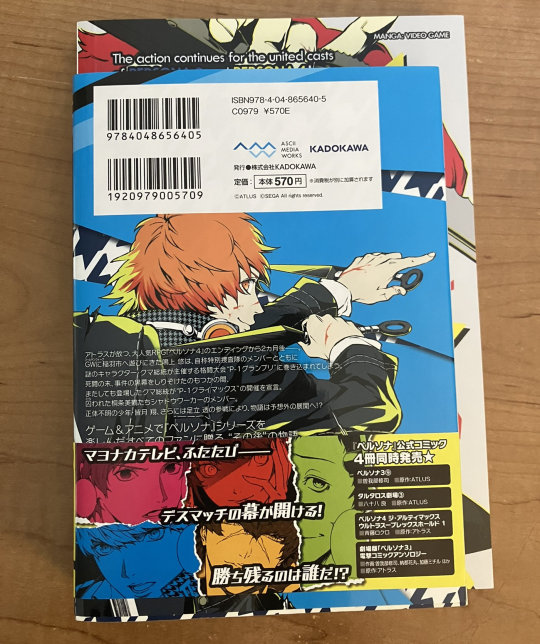
Fun fact: the Eng version was printed bigger than the Jap version (at least for the Jap volumes I have; no clue if they printed those at multiple sizes).
--------------------
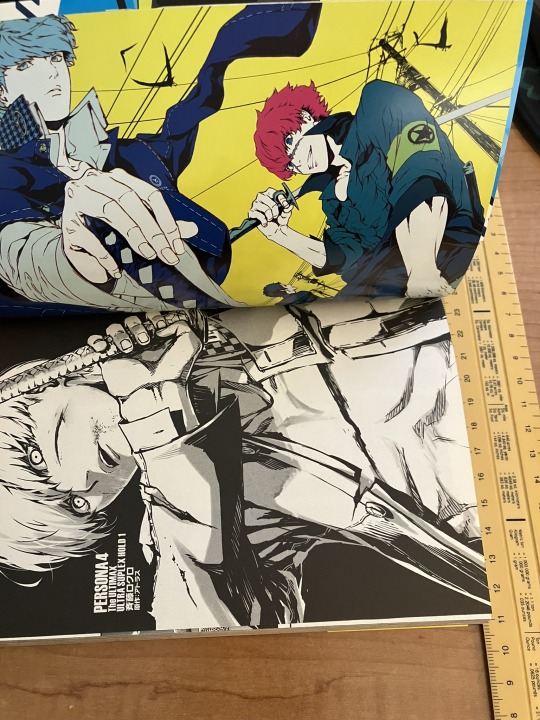
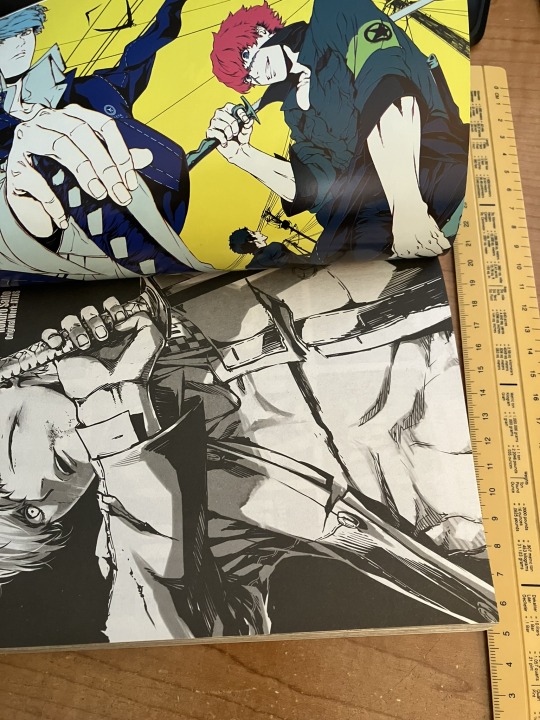
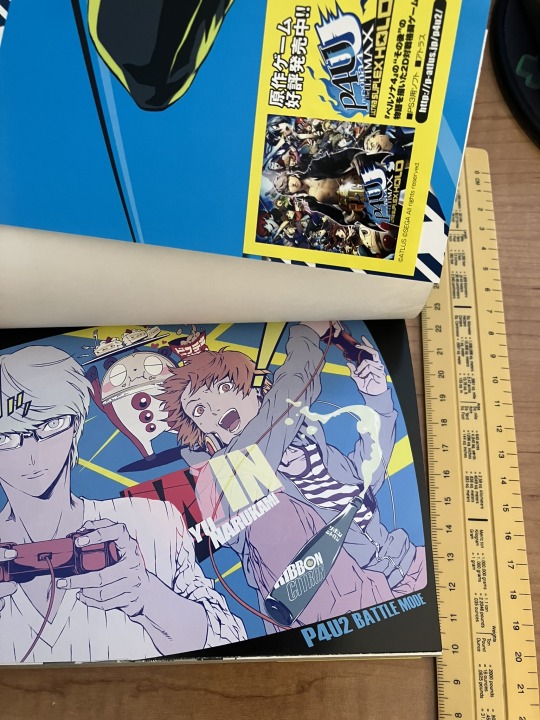
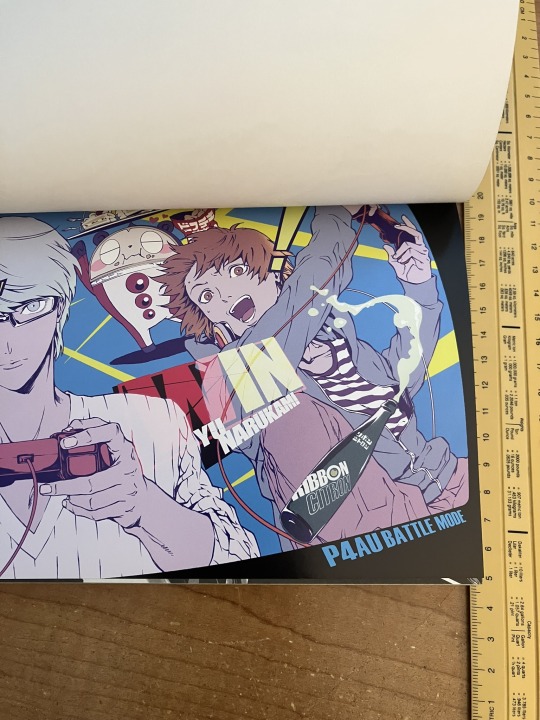
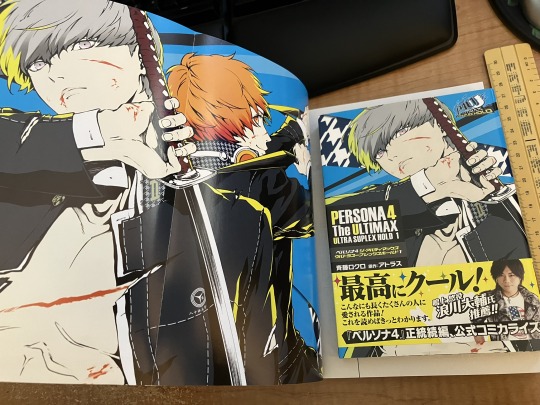
Also something cool about the Eng version is that it comes with the same color illustrations as the Jap version had, just sized-up. The exclusive edition also comes with a bonus fold-out poster of the original volume cover!
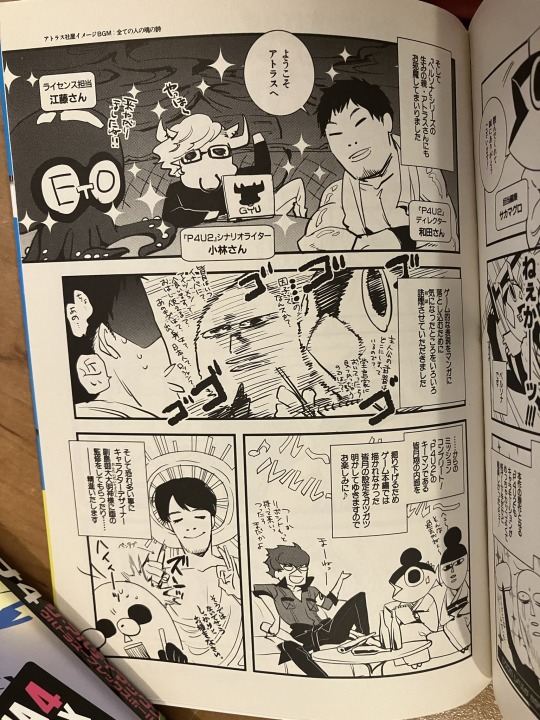
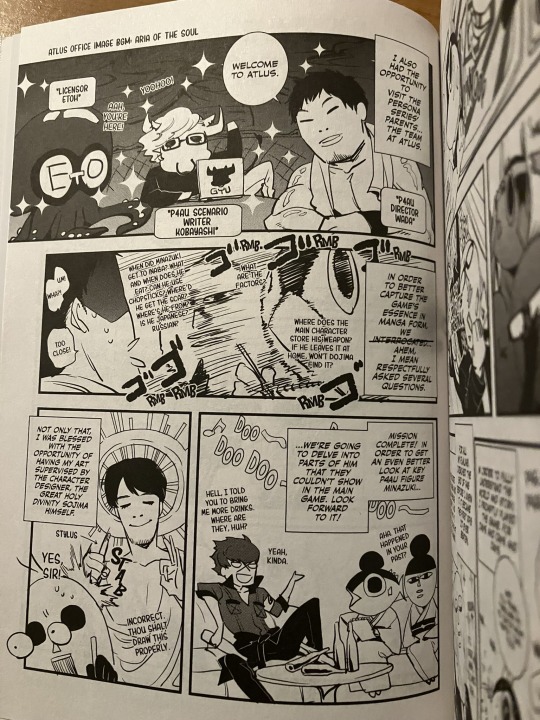
The end-of-volume artist/editor comic was included as well! I'm personally very glad to finally know what this comic says. My respect for Rokuro-san and Sakamaguro-san (the fish) as creatives has grown even further.
--------------------
Here's a few other page comparisons too because I found them interesting. xP
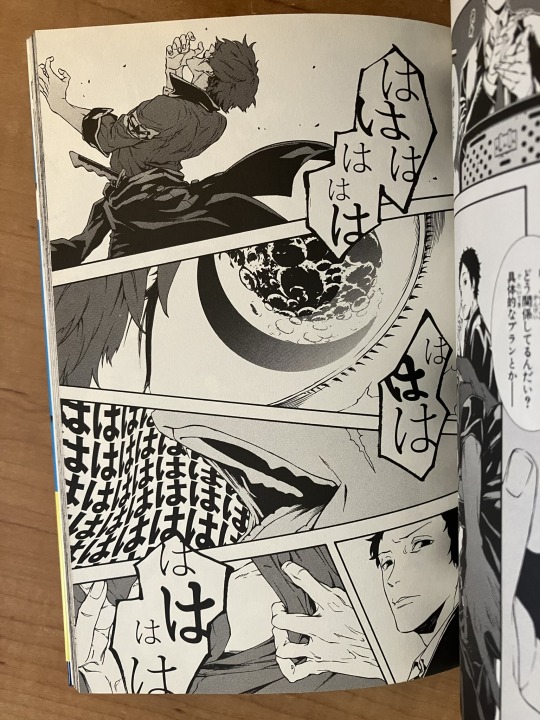
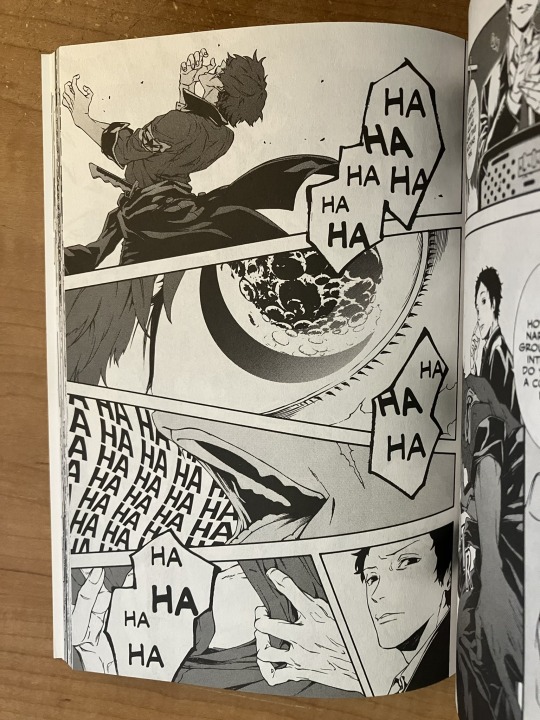
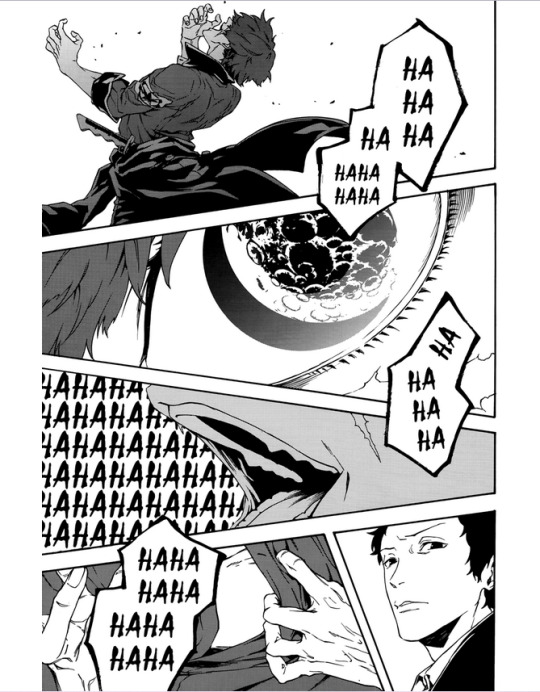
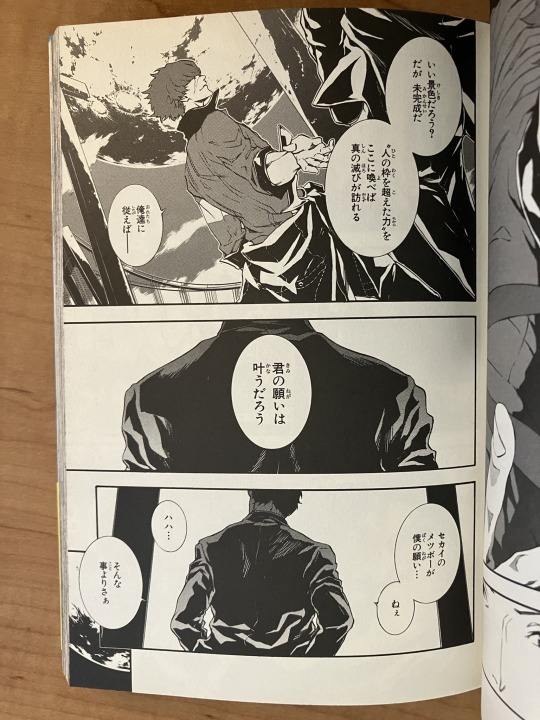
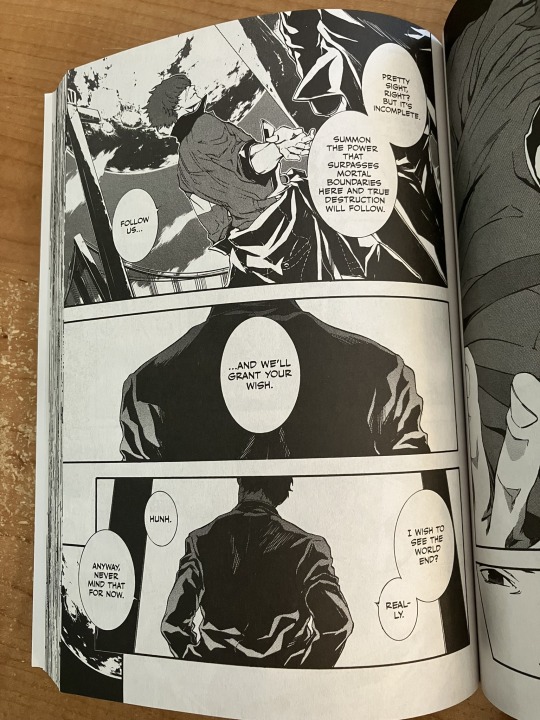
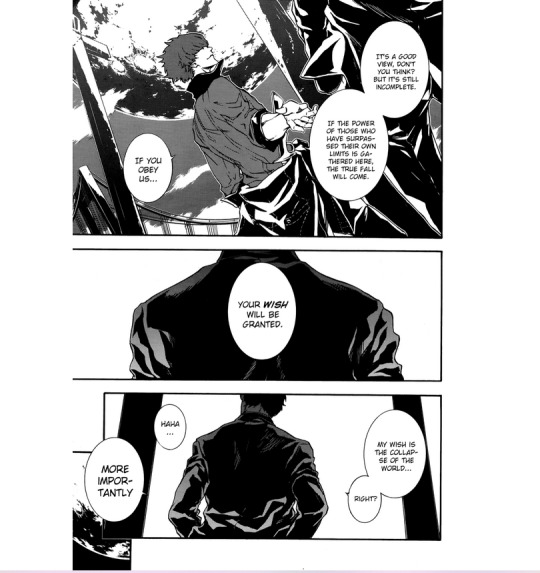
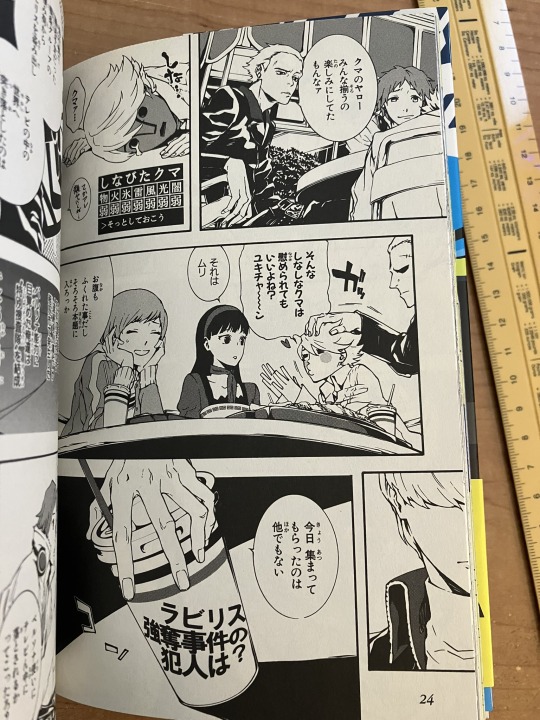
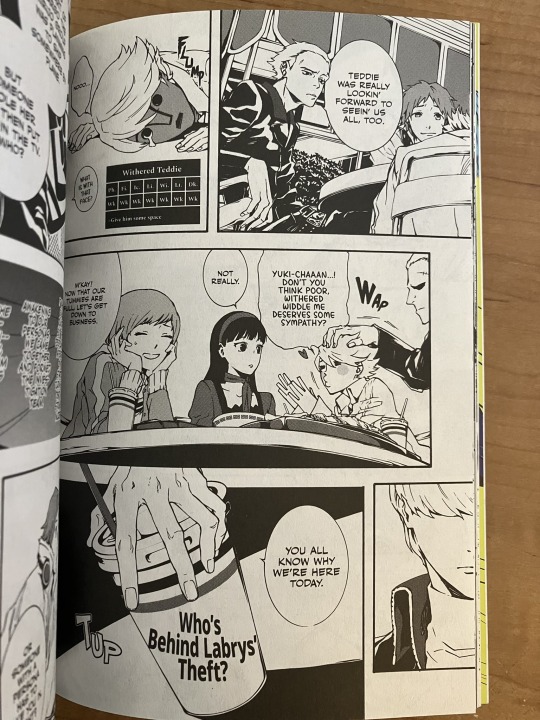
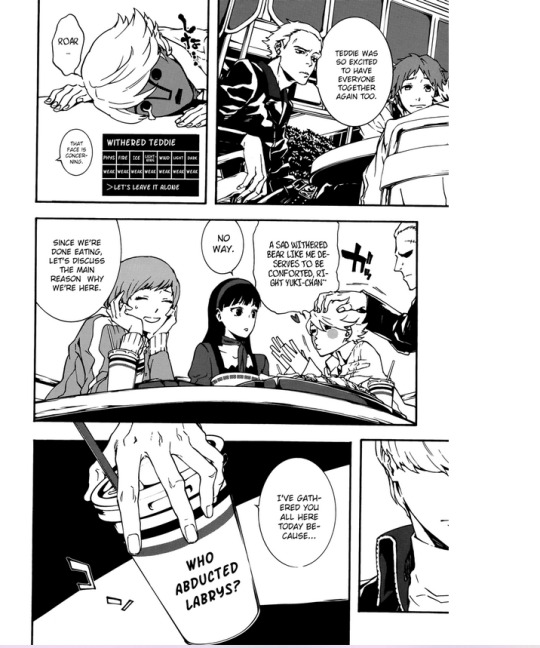

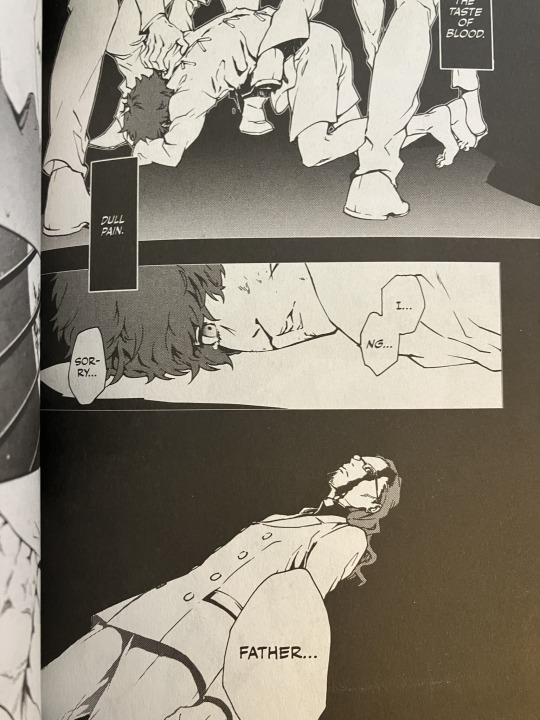
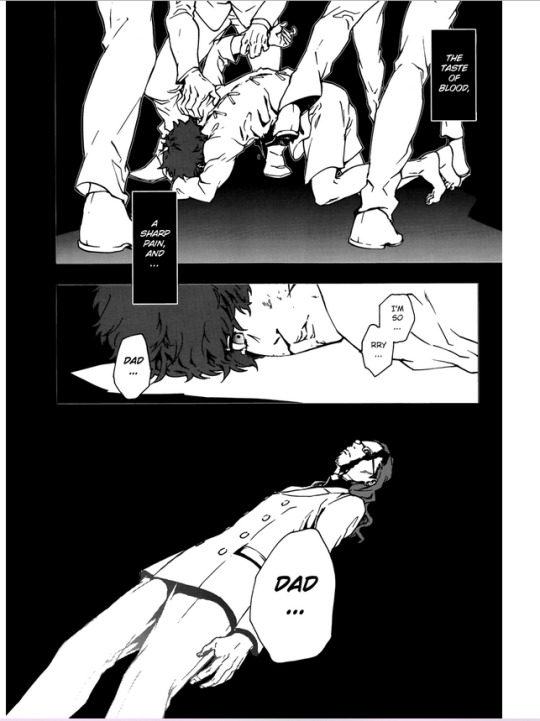
(If you wanna see the fan-Eng in higher quality than the screengrabs I used, you can find it on Mangadex [here].)
#P4AU/P4U2 manga#Persona 4 Arena Ultimax#Sho Minazuki#Yu Narukami#(Honestly I kinda got used to reading slightly-OOC Persona content via fan creations -)#(- and fan-translations of other Jap Persona content; so the translation choices don't affect me all that much lol)#(Though Sho's “loser trash” makes me cackle because it's such an awkward way to translate “ゴミ”)#(Especially "Now to set up some fun surprises for you Investi-loser trash-Team goons.” lmao)#(Also still waiting to see how Labrys's dialect is handled; as well as the 皆月・ミナヅキ name difference)#(I've heard things about both already so that's going to be interesting lol)#P4AU#P4U2#Persona 4 The Ultimax Ultra Suplex Hold#ペルソナ4 ジ・アルティマックス ウルトラス―プレックスホールド
15 notes
·
View notes
Text
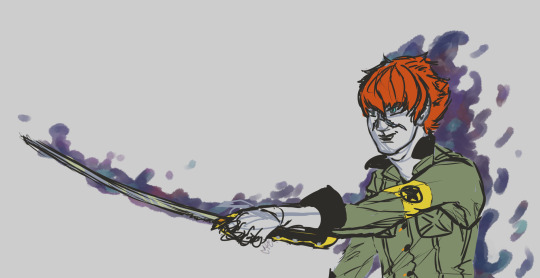

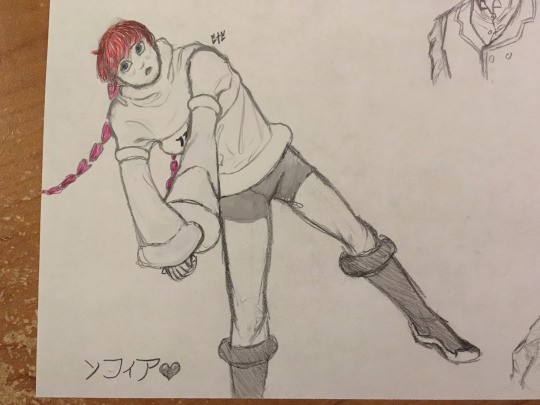
Doodles
#Sho Minazuki#Sophia Persona 5#SystematicallyArtistic#Sho's disgruntled because an OC took up 90% of the paper and left him crammed in the corner#Minazuki achieved retribution by interrupting me while drawing that same OC more recently#right when I was ~80% done with the drawing too. I gotta go back and fix some of that OC's textures now... >_>#Sophia's is a lot older but I've been waffling on posting it#The power of adorable tilt wins out over the power of mundane doodle I guess lol
15 notes
·
View notes
Text
A few frameworks I've found helpful for writing structural dissociation systems in fiction (e.g. OSDD-1/P-DID, DID... can't vouch for complex DID because I'm still learning about that):
The BASK Model
The Action Systems Model
Triad of Dissociation (third paragraph in the post)
Note: I haven't yet tracked down the academic source for the "triad of dissociation", so I'm not sure how scientifically accurate that is. It makes sense to me subjectively though, so I've been utilizing it in my own regard.
(I also don't think that it's inherently the "theory of structural dissociation" because it talks about the formation of single dissociated parts, not ANP vs EP and how many ANP are present.)
Additional note: the "BASK" and "action system" models can be used for trauma more broadly, so they're not limited to just SD-systems. Character with PTSD or C-PTSD? Applicable. Character with magic- or soul-based plurality but still experiences trauma at somepoint? Applicable. Obviously if you have world-lore or character-lore that denotes that their responses to trauma aren't like a human's, then these may not be as applicable, but you get the point.
Lastly, these three frameworks aren't the only things you should reference while writing a SD-system character, but they certainly help a lot with organizing character information and demystifying some of the underlying mechanisms for SD-system characters.
---------Capri rambling on applications of those frameworks--------
Also something helpful that I've been doing is combining the "Behavior" part of BASK with the "fight, flight, freeze, shutdown, etc." of action systems. As far as I understand, "Behavior" isn't limited to just those, but when I'm creating notes on what trauma features have ended up where and how they manifest among a system, making notes like "Trauma X: fight-Behavior is held by Y alter; shutdown-Behavior and Affect are held by Z alter" is very useful.
In that same regard, denoting what fragments of a particular BASK category are held where can also be helpful. E.g. one alter holds a fear-Affect, another holds an anger-Affect; one alter holds the Knowledge leading up to the traumatic situation while another holds the Knowledge of the traumatic situation itself; etc.
This also can apply to complex and longer-term traumatic situations, as opposed to just one-off events. In those cases, alters might collect those particular types or categories of experiences over time (e.g. an anger and fight-response holder, or an alter with Knowledge of multiple traumas), or they may have different kinds of traumatic content from different experiences within that timeframe (e.g. an alter with Knowledge from one, Sensory from another, Knowledge and Affect from a third...).
Furthermore, adding the triad of dissociation into that lets you figure out what degree of dissociation is being utilized to handle those traumatic memories, and at what points. You character can start off with a stage 1 dissociative part from a trauma at age 3, then have it gain more content (traumatic or not) and develop into a stage 2 by age 7, for example. I personally assign stage 1 parts to my stage 3 alters as well, as it helps me to track their individual trauma triggers and responses when needed, but I don't remember how academically or practically accurate that is to IRL.
Combining the three frameworks together, I can write notes something like this:
Age 3, 'Makami' is a non-structurally dissociative self-soothing measure when [chara] is sent to live with their neglectful grandparents.
Age 3-5, due to [chara being put into a different chronic trauma situation without support], Makami becomes a structurally dissociated response. Spared all aspects of BASK from their prior trauma, but retaining Knowledge of their current trauma, Makami soon develops into a stage 2 part who accesses energy management, exploration, caretaking, and social interaction action systems.
Age 15+, due to [a combination of a one-off trauma and chronic stressful situation], Makami develops enough to become a stage 3 part, retaining the recuperation-Behavior and some Sensory aspects of [the one-off trauma]. Makami continues to operate within the priorly ascribed action systems when the trauma is not triggered.
10 notes
·
View notes
Text
Capri’s Guide to Sho Minazuki Content — Masterpost
Disclaimer: I don’t know, nor care to hunt down, every last piece of official content for him, as especially with the merch stuff can be really obscure. But I’ll list anything I do know or other people inform me of here.
This will also be updated if I get around to making new posts, new content comes out, or I learn of content I haven’t listed here before.
----------------------------------------------------------------------------------------------------
Games:
Persona 4 Arena — (indirect appearance)
Persona 4 Arena Ultimax — (the game all about him)
Persona 3: Dancing in Moonlight / Persona 5: Dancing in Starlight — (DLC dance & limited character interaction voicelines)
----------------------------------------------------------------------------------------------------
Art Books:
[P4U2 Official Design Works]
[P4U & P4U2 Super Official Design Works]
P3D & P5D Official Visual Book — (character graphic & screenshots, Japanese VL transcript, potentially mentioned in the interview but I haven’t checked yet. No concept art or art pieces)
Shigenori Soejima & P-Studio Art Unit: Art Works 2 — (art pieces)
P4U2 Persona 4 The Ultimax Ultra Suplex Hold Stage Project Visual Book — (seems like a photoshoot of the actors in costume?)
----------------------------------------------------------------------------------------------------
Manga:
[P4U2 manga adaptation by Rokuro Saito] — (Eng fan-translation)
Udon Entertainment publication of the P4AU manga adaptation — (official Eng translation; will finish releasing by February 6th, 2024; has an exclusive edition with new cover art and a standard edition with the original cover art)
Persona 4 Arena Ultimax Comic Anthology (published by DNA Media Comics) — [Eng fan-translation of a couple comics here] — (~4 non-comic art pieces, 1 koma, 5 multi-page comics, and small cameos in 2 multi-page comics)
「タルタロス劇場」 Vol 3, 「ワイルド」 Vol 1 & 2 — (AKA “Tartarus Theater”; a couple to a few komas in each volume, appears on the cover of Vol 3)
----------------------------------------------------------------------------------------------------
Theater:
Persona 4: The Ultimax Ultra Suplex Hold Stageplay — (prominently featured. For a list of screentime timestamps, see [here])
Persona Super Live P-Sound Wish 2022 (concert) — (Day 2 I think, but I haven’t watched it yet. There’s also photos of the actors in costume online, for example [here], [here], [here], and [here])
----------------------------------------------------------------------------------------------------
Merch:
To be honest, I don’t particularly seek out merch, nor do I always remember to document it when I come across it, so if anyone has information on this, I would be very grateful!
As well, if any of the active shop links are discontinued, let me know and I’ll add their screenshots to the merch documentation folder.
Folder of documented merch [here]
Ultimax Stageplay list of merch [here]
“Rule Smashing Pun Machine” embroidered cap [here]
P4AU box art poster (normal version) [here]
P4AU box art poster (Shadow version) [here]
A Tumblr user’s keychain & pin collection [here] — (note: no clue how much is official and how much is unofficial)
----------------------------------------------------------------------------------------------------
Etc.:
Persona 4: The Ultimax Ultra Suplex Hold The Complete Guide — (an official game guide from the original release, going into mechanics for each fighter, from what I can tell. I don’t own a copy though, so this is just estimations from internet pictures)
----------------------------------------------------------------------------------------------------
Additional Resources:
For resources uploaded to the internet like VL files (Jap&Eng), sprites, understanding the Cyrillic script on Sho’s armband, etc., see my page [here].
#Sho Minazuki#Capri's guide to finding Sho Minazuki content#(If the formatting is wonky or hard to read for any reason let me know and I'll see what I can do!)#Persona 4 Arena Ultimax#P4AU#P4U2#ミナヅキショウ#皆月翔#Persona 4 The Ultimax Ultra Suplex Hold#multi x multi = multiplicity
41 notes
·
View notes
Photo
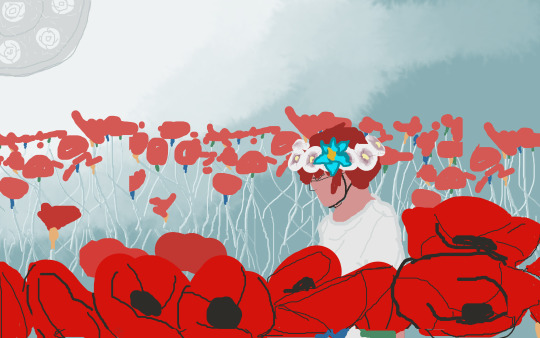
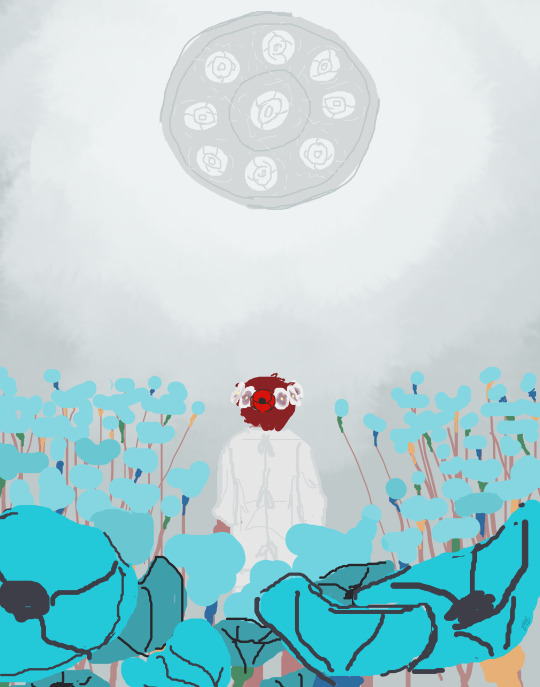
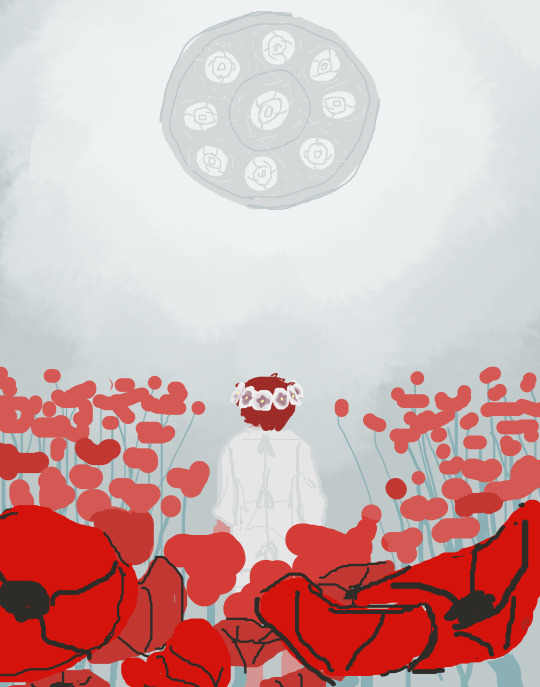
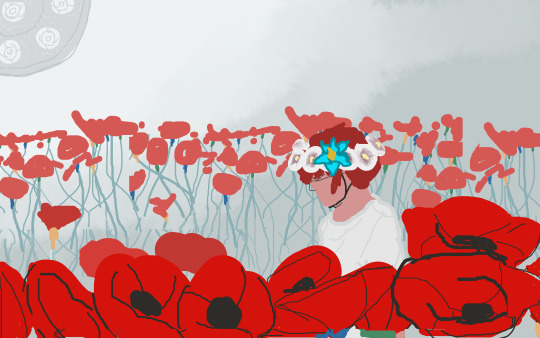
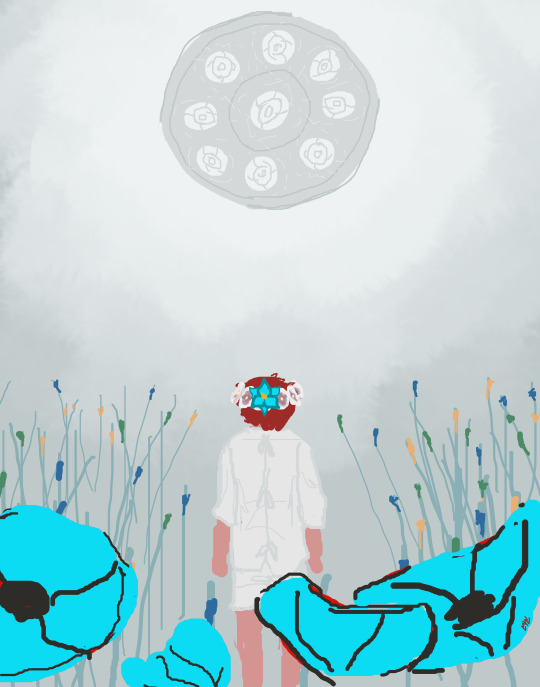
Concept — “For you to remember, for you to forget...”
Contextual breakdown below the cut, for those who want it.
----------------------------------------------------------------------------------------------------
Papaver rhoeas, the red poppies, are representative of remembrance poppies, which supposedly honor fallen soldiers, sometimes all war casualties, and call for future peace.
Papaver somniferum, the white poppies, are representative of both sedation and bandages (even if somniferum-sedatives are probably not accurate for this situation from a technical standpoint >_>).
Meconopsis betonicifolia(?), the blue poppy, is representative of the Plume of Dusk. Himalayan species are supposedly difficult to cultivate outside of their native environment; which similar could be posited about Plumes of Dusk. The blue poppies in the vertical concept are probably still some species of meconopsis and have basically the same meaning, just applied differently.
The poppy stems, as you can sort of see in the first image, are intended to be IV tubes. The colorful connector ports are also reminiscent of the wallpaper you can find in the kids’ areas of some medical facilities.
The “sun” is a surgical lamp, specifically the one depicted in the manga (ch.30).
The white clothes are the same ones as depicted in the manga, though if you wanted to you could also ascribe them the meaning of “something untainted/pure”, as there isn’t any viscera staining them.
The flower crown I was kinda interpreting as being symbolic of children, innocence, and beauty. Obviously, nothing about this situation is any of those, though I wouldn’t be surprised if Ikutsuki saw it that way.
The color palette and perspective are supposed to invoke a dreamy/surreal state. Reality is the bright and sterile whites and grays of the surgical room, hazily blending into less “real” elements such as the poppies. The borders between the two are weak, and so you get stuff such as flowers and IV tubing merging. Perspective-wise, I tried to make it look like one was seeing the lamp overhead as if they were the one on the table, and then tried to invoke a feeling of distance with the size/perspective of Sho and the poppies, as if they’re disconnected from reality.
The epithet I have for this concept is mostly based on “remembrance” from the red poppies and “sleep/sedative” from the name of the white poppies, “somniferum”. Though, it could be applied to other aspects of this concept/situation as well.
Overall, it’s just an artistic/symbolic take on the Plume-implantation surgery and lowkey the beginning of Minazuki’s existence, haha.
#medical themes#Sho Minazuki#SystematicallyArtistic#ignore the incorrect petal arrangements; they'll be fixed if I ever illustrate these properly >_>#also indecisive on if I want the poppies to go further off into the distance or not so they're a little flat meanwhile
7 notes
·
View notes
Photo
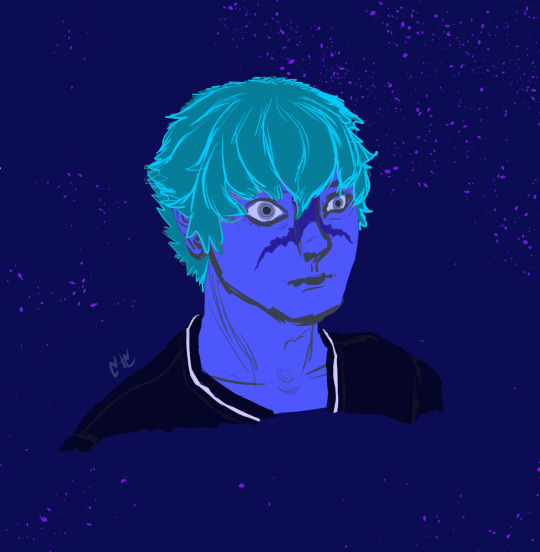

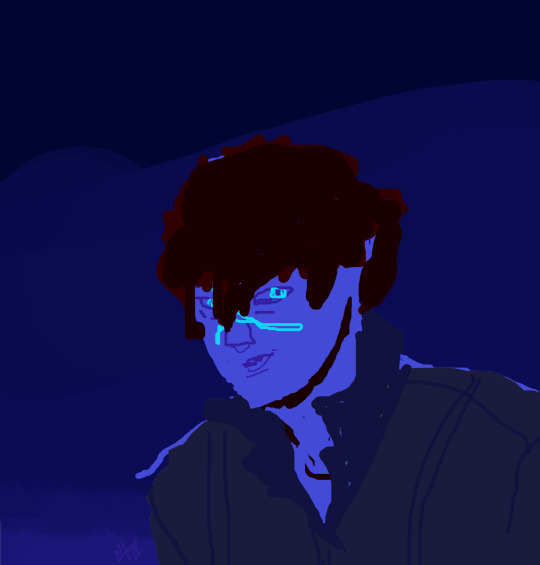
Blacklight-inspired doodles!
Sho’s having an existential crisis over why his hair has suddenly turned cyan
Minazuki’s being unintentionally spooky but otherwise is just chilling
And Labrys has doubts about this strange optical trickery (and maybe confusion over why her hair is glowing, since, in using UV-reactive materials for her hair, Ergo would’ve been going out of their way to implement something with no testing or combat benefits...)
#SystematicallyArtistic#Sho Minazuki#Labrys#if I did one for Shabrys she'd probably have bright eyes like Mina's - just gold not blue#I don't really have any ideas for her right now though so alas#fun fact: Sho originally had Sophia-scarlet hair. It was eye-searing
3 notes
·
View notes
Photo
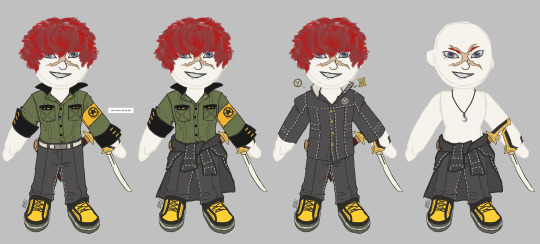
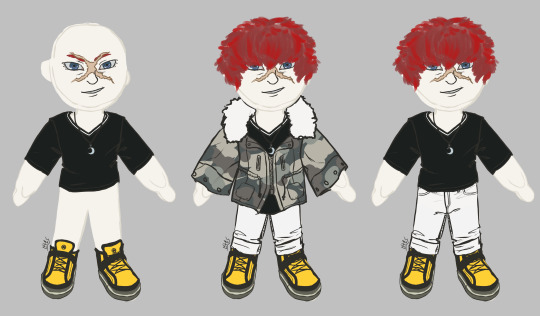
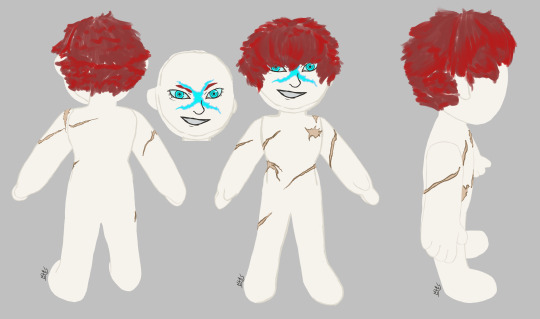
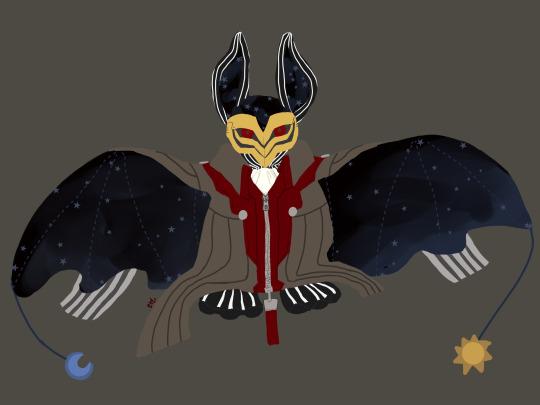
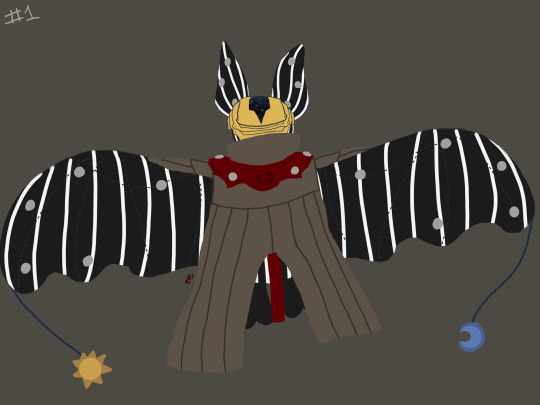
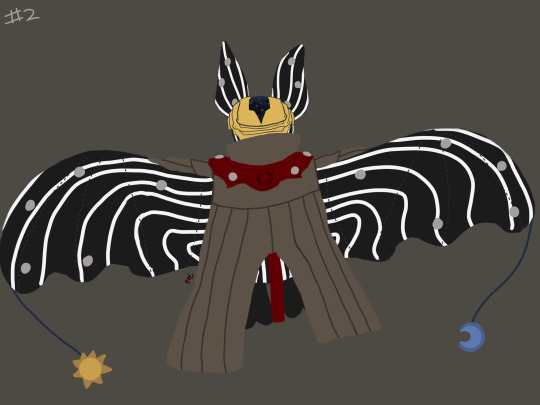
Some plushie concepts that I’ve been working on recently! I still need to do the back and side profiles for Sho and Minazuki’s outfits, but I have to rest my drawing arm first, so I might add those in a reblog later.
Anyways, bullet list of lil’ details:
I’ll be making the Minazuki plush in full size (about 12in IIRC), while the Sho plushie will be roughly the size of a large keychain, because then I can bring Sho many places and make all the post-Ultimax world-travel references that I want. And maybe inevitably drop him off a cliff by accident, but I’ll try my best not to. xP
The sclera and teeth are gray instead of white because the white blended into the skin too much to be visible.
Yes, the hair will be that fluffy on the actual plushies.
Ideally, all the clothes will be removable, and the sheathes actually functional, but I’m not sure if that’ll be feasible and/or secure enough at a smaller scale intended for travel, so we’ll see.
They’ll probably have little crescent moon charms instead of recreations of the moon key, but I have to see what I can find materials-wise on that front.
Random circle-star on the sneaker tongues because I have no idea what’s actually supposed to be there. I looked through all the art and live-action costumes that I could think of, to no avail. >_>
Conversely, I can say with confidence that the Yaso High 3rd year pin is canon in some form. If you look carefully in Ch28, Vol4 of the P4AU manga, it’s distinctly a 3rd year pin on the jacket Minazuki nicks.
I’m undecided on if I’ll use the gray-eyed version or the blue-glow version for Sho’s face yet. Minazuki’s will keep the slate blue irises though, because imagining that the Plume affects the color of their body’s eyes the more active or energetic it is is fun.
Both of them will have the scars on their bodies though. I just drew them on a separate iteration for referential ease. :P
A lot of Tsukibat’s design here won’t match up with the final plush because fabric and pattern differences. For example, Tsukibat-back #2 is not at all how the fabric I have is going to work, alas. Also, I still need to finish wrangling a helmet reference for Tsukiyomi so I can better translate that to the plush... <_<;;
Tsukibat’s lil’ sun and moon charms are there to represent his two Persona-users.
I didn’t give Tsukibat Tsukiyomi’s crescent-mohawk because I thought it would be a bit much with the giant ears also being present. I think it looks alright with the design though.
I’ll be using [this pattern] and [this pattern] with some modifications for the plushies, respectively. (The latter was what inspired Tsukibat in the first place, actually. Galaxy bat x Tsukiyomi = this.)
I don’t currently have plans to make some to sell, but I might consider it in the future if it’s not too much of a hassle to create them. I’m not a professional or anything though, so IDK if they’ll even be sale-quality, lol.
Read all the way down here? Cool. Your reward is getting to see the derpy little embroidery color tests I’ve done for these so far:
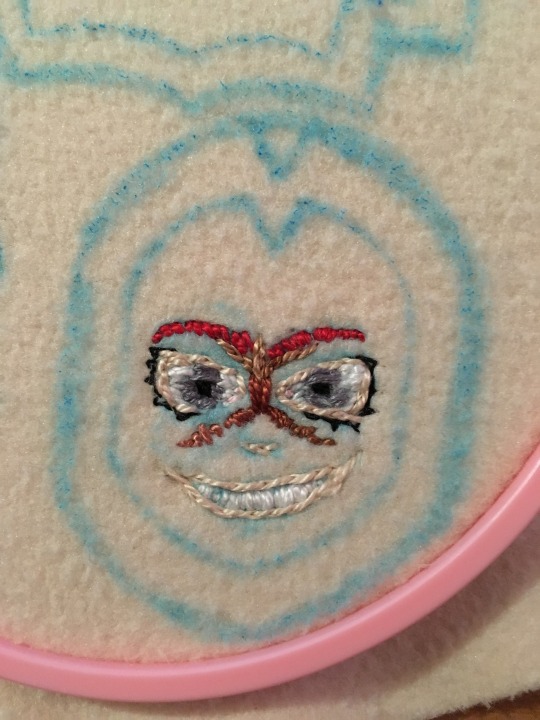

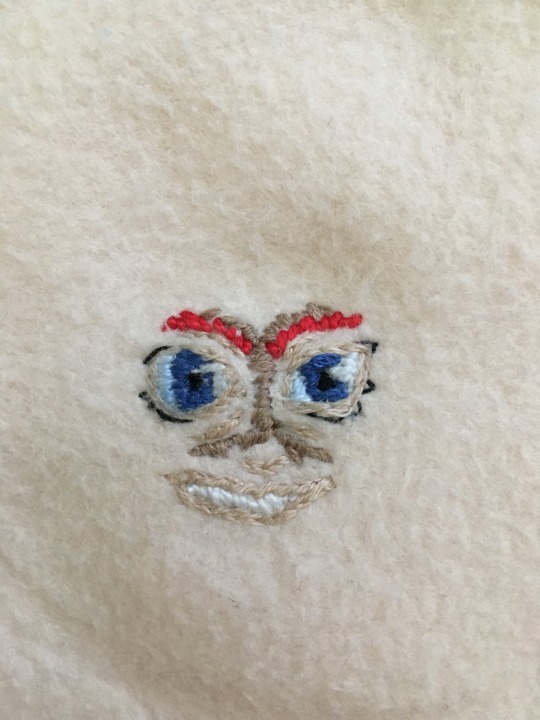
(This second/third one was supposed to be a Minazuki expression version, but I botched it by doing the outline before the fill and then pushing the fill too close to the outlines, so it took on a much derpier form, lol.)
#Sho Minazuki#ミナヅキショウ#Tsukiyomi (Persona)#CapriciouslyPlushified#(hooray I finally got out of writing-brain enough to do plushcraft work)#(they say; jinxing these to not get done for another 2 years)#(TBH I'd love to do ones for Labby and Shabrys too but 3 is already a lot to get done flskdfs)#(ditto for a proper Tsukiyomi plushie on the humanoid pattern; or even a beta-Tsuki design-)#(also super-grateful to Rokuro Saito for being such a detailed manga artist)#(would be bereft of some crucial details without the P4U2 manga)
5 notes
·
View notes
Text
Just musing about a couple small oddities I noticed while going through the Japanese version of Ultimax. Disclaimer: I still don’t know a super-ton about the Japanese language, so these observations might not actually mean anything of importance. >_>
(And if anyone with better Japanese knowledge than I comes across this post and wants to help elucidate things, I’m always down to learn more.)
[1]
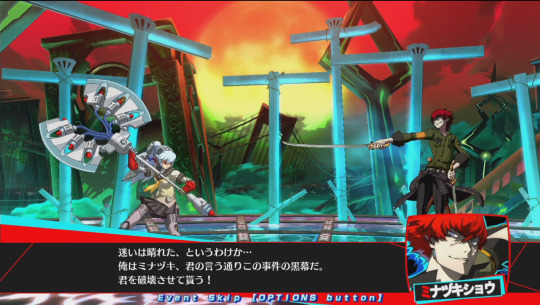
In Labrys’s arcade mode, Minazuki introduces himself as purely “ミナヅキ”, while in every other instance I can find in both story mode and arcade mode, he always introduces himself fully as “ミナヅキショウ” (like shown below with Chie).
The closest thing I can find to the contrary of his usual pattern is how he introduces himself to Adachi in “Episode Adachi” (pictured below), but even then he still gives his full name after a moment.
Meanwhile, in the English translation of Labrys’ arcade mode story, this discrepancy is entirely glossed over as Minazuki just introduces himself in his English-typical “Minazuki. Sho Minazuki”.
I haven’t checked through the manga to see if this pattern holds there too, ‘cause I’m not as familiar with its sequence of events as I am with the game and so would have to comb through it more meticulously. So there might be something there that affirms or breaks this pattern?
So yeah. I don’t really have enough sociocultural knowledge to know if him doing that is indicative of a closer relational position, of him being more disrespectful, or of it being some purely grammatical variation with little characterization meaning, though I do find it interesting from a “well, it’s an oddity of behavioral pattern if nothing else” perspective.
(Oh- and for additional context, in that scene in Labrys’ arcade story, Minazuki makes mention of how he and Labrys are the same, something that’s reiterated in one of his “spectating Labrys’ dance” voice lines in P3:DiM. Thus why it seems plausible to me that he might consider himself relationally closer to her. Though on the other hand, he might still see her as an inanimate tool as well, so not treating her with the same formality as he would a person could give credence to it being a more disrespectful form of regard instead? There’s not really enough context to tell, as even his Labrys-specific battle lines and DiM lines could be read either or both ways. :P)
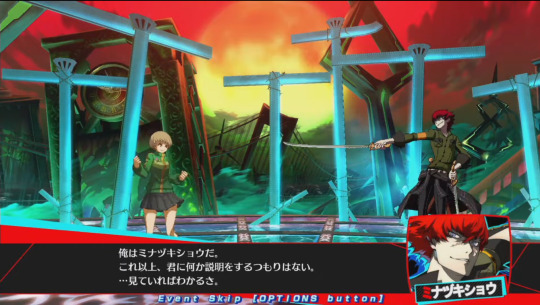
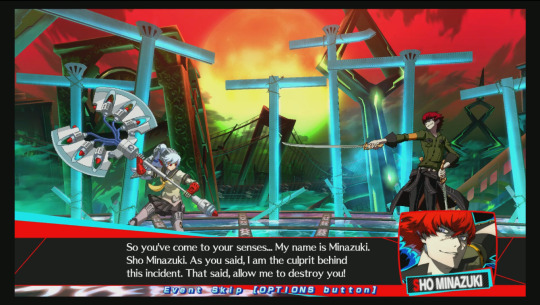
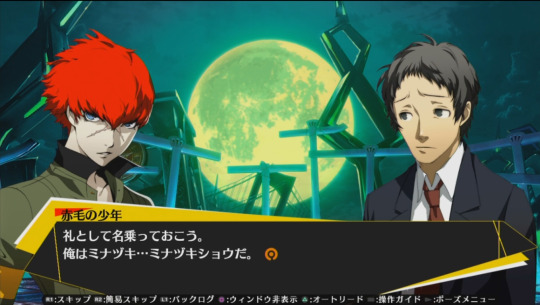
[2]
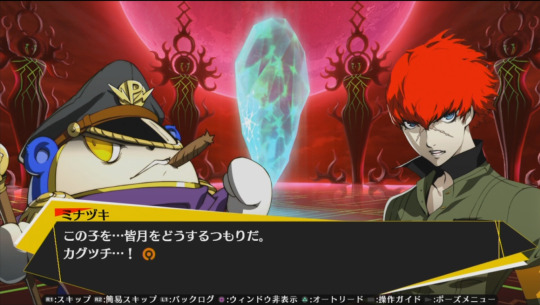
In EpP4, when Minazuki stabs General Kagutsuchi and demands to know what he’s planning to do with Sho, he seemingly goes to refer to Sho as “this child(この子を)”, then pauses for a moment before changing his address to “Minazuki(皆月を)”, with “を” being a grammatical marker for the “direct object” of a conversation or sentence I think..? If there are more nuances to it than that, I haven’t learned them yet, haha. Anyways, after changing the direct object that he’s referring to, he then goes on to say the rest of the sentence.
Meanwhile, in the English translation, this is just simplified into “this boy” with no further distinction between the two apparent forms of address that the Japanese version has.
As for the manga, he just outright uses “皆月を” from the start, though, aside from dropping Kagutsuchi’s name from the dialogue boundaries, says the line exactly the same (どうするつもりだ). The English fan-scanlation on Mangadex follows in the footsteps of the English game translation in writing the line as “Just what do you intend to do with this boy?”. (Edit Aug 2024: the Udon official manga translation translates it as “What were you going to do with [Sho]?”)
Also, just for context, I think usually any other time that any character uses “皆月”, it’s translated as “Sho” rather than “that boy”? (With the exception of the manga ‘pronunciation subtitles inform you that the spoken word is entirely different than the written word’ thing where sometimes “皆月” is written but “この子” is spoken, I think.)
So yeah. I’m not sure if this is supposed to be an important characterization detail on Minazuki’s part, since this happens right after Yu gets him to realize that he's a person supporting Sho rather than Sho being totally alone, or if it’s just a negligible grammatical thing. Though, since I don’t think Minazuki ever calls Sho “皆月” outright outside of explaining Sho’s past to other characters, in which even then I think he uses “皆月翔” specifically, it kind of makes me think that him using a more direct form of address for Sho rather than an indirect one might hold some significance?
Although, as a counterpoint to that, we also don’t ever really see him directly conversing or interacting with Sho outside of a couple scenes in the manga and a couple lines in P3:DiM, so maybe he does call Sho by name more regularly and we just don’t get to see it. For example, in the P4U2 DNA Comics anthology, there’s quite a few times where Minazuki directly addresses Sho by his family name, but the anthology is non-canon as far as I know, so I can’t really count it. :T
Also, I haven’t extensively combed through every last instance for this point, so you may want to take it with a grain of salt, as some things may have fallen through the cracks. ^^;
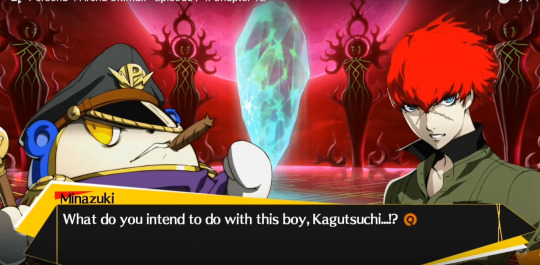
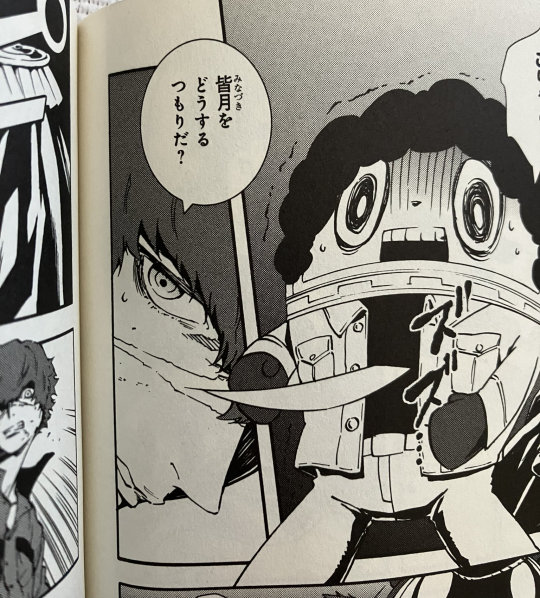
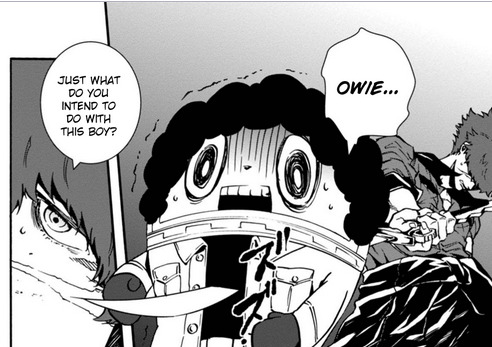
Addendum: P4U2 Stageplay
I’m putting the stageplay in a separate section here mostly because 1) I don’t know how “canon” it’s considered and 2) my phonetic Japanese comprehension still needs a lot of work and I don’t have subtitles like I do with the game. Also I kind of wrote-up everything above before remembering that it existed. <_<;
Anyways, going through it with my limited comprehension, I can say that Minazuki sticks with his “ミナヅキショウ” full introduction and sticks to referring to Sho as “彼(him)” and “この子(this child)” throughout his appearances... with a single exception. In a flashback to when Minazuki confronts Ikutsuki with Tsukiyomi, Minazuki at one point says “翔(Shou)” specifically. However, as I don’t know the rest of the words preceding it, I don’t really know if he’s referring to Sho, of whom he kind of yeeted out of the body a bit beforehand, or if he’s referring to himself since he shares a name with Sho.
And as for what he says to Kagutsuchi just before he gets possessed, he actually seems to say just “どうするつもりだ、カグツチ?”, bringing the three variations full-circle by keeping Kagu’s name but nixing any direct reference to Sho.
9 notes
·
View notes
Text
[AoN] PxDN Lore Snippet: R-00 + R-01 Reactivation
Yep, I read Persona x Detective Naoto, and yep, I'm incorporating it into this story. Why? ‘Cause it’s not a bad read, and more importantly it’s got a lot of feasible world lore I can use to enrich the setting, of which I can do all sorts of fun stuff with. Also, Sousei and Sho share a lot of similarities in terms of circumstances and behaviors, so any chance for him and Sholar to cross paths has lots of fun potential as well, even if it's only once.
Anyway, this is just a little snippet from the full AoN-PxDN lore doc that I'm getting straightened-up, 'cause I'm excited about how nicely I got it to fit together. \o/
Spoilers for: Persona x Detective Naoto, Persona 3, Persona 4 Arena/Ultimax, and my fic "Apropos of Nothing" (very mildly though, otherwise I wouldn't be posting it xP)
~~~~~~~~~~~~~~~~~~~~~~~~~~~~~~~~~~~~~~~~~~~~~~~~~~~~~~~~~~~~~~
(For quick reference, the R-series ASSW project spanned from roughly 2006 to 2009, with Sousei's run being from 2007-2008, Ai's spanning 2008-2009, and their endings being Yūri's death and Aigis's reactivation respectively. SEES is first founded in Spring 2006 (being Mit/Aki/Shinji), and P3 happens as normal from 2009-2010. The 7th Gen ASSW project also ended with the explosion & creation of the Dark Hour on Sept 10th, 1999.)
So, several times throughout 2011, Minazuki accesses Ikutsuki's isolated server + the Ergo database server in general, with the first instance of the latter catching the ShadOps/KJG's attention. A bit spooked by the unauthorized access, everything related to Ergo (both current and old) is given a thorough security check, resulting in the discovery of 3 ASSWs sitting around in storage, among other things.
(Note: the database server access happens differently in this AU, so up until now, Minazuki had been accessing the isolated server legitimately via Ikutsuki's whitelisted computer with admin credentials, and then attempted to access the general server with an unregistered device. I still have to learn how databases work though, so I might have to adjust that in the future.)
Pretty much no one seems to know much about this mysterious 5th Gen and two R-series androids, despite there actually being a decent bit on information on-file for the latter once they decrypted it, and so, alongside a bunch of other old Ergo artifacts, the three are shipped out to the Yakushima Ergo quarantine facility for inspection and threat assessment. Some of the staff who were cited to work on the R-series are also contacted by Mitsuru to get further information.
(Note: unlike OG, the transport goes smoothly, because canon-divergence. /o/)
Mr. Tsuge Tetsuma has been employed as a researcher in the Kirijo Ergonomics Robotics Division for a long time now, but more importantly since the R-Series project was abruptly halted and its products stuffed away into storage. Now, he was nowhere near happy about having to leave Sousei and Ai in there for all this time, mind you, but he didn't have the authority nor the opportunity to get them back out of storage on his own, and so it was all he could do to stick with the company until an opportunity might arise. Getting a phone call from Mitsuru provided one such opportunity.
With the aid of Tsuge, the three ASSWs are reactivated and inspected, and once Mitsuru learns that they're not threats and are sentient beings with "hearts" of their own, they're given official rank as auxiliary members in the ShadOps to keep Public Safety from trying to confiscate them on the grounds of being "highly dangerous weapons". And… I guess I haven't figured out the specifics beyond that point yet, like if they actually help out the ShadOps or not. I feel like they might given Sousei’s determination to prove his usefulness and Ai’s desire to help out overall, but Sousei’s determination to have a combat-type Persona might also undermine that? Anyway, Tsuge is also brought into the fold as an official ShadOps researcher and tasked with being the supervisor of the Kurogamis due to his past experiences and relations with them and their creator.
(Fun fact: the reactivation order goes Ai, Sousei, Labrys because they have more information on, and familiarity with, the R-series units than the 5th Gen unit, so there's less risk involved with activating the Kurogamis than there is with Labrys. (Plus, in the event that Labrys ends up being hostile or out of control, the Kurogamis could be called in to help suppress her.) Also, Tsuge knows that Sousei will be rowdier than Ai, so as one of the chief specialists on the team, he's making the executive decision to give the team the ‘easier’ one to start with, lol.)
A year passes (which is what makes up a lot of Sousei's impression of "smoldering away at a lab, not yet fulfilling his mission as a suppression weapon"), and in late 2012 the National Police Agency entreats the KJG for technological aid in civilian safety and law enforcement measures. With the Kurogamis’ robotic physique and Sousei’s Past Reading in mind, this opportunity gets presented to Tsuge and the Kurogamis, of which Tsuge eventually gets Sousei on board with when he learns that they can be stationed at Yagokoro's PD, where Aoi Touko works. Ai didn't really need a ton of convincing, being content to be wherever Tsuge and Sousei are and determined to help out where she can.
(Note: part of the "last year's brutal crimes" is influenced by the Inaba kidnapping and murder cases, as it caused quite a stir across the nation, though the other part is probably more mundane, non-magical crime. Also, other technology and robotics were implemented in other PD's across Japan, but Yagokoro was the only one to make use of ASSWs specifically.)
And from there, PxDN happens more-or-less as normal, although certain events may or may not have Naoto meet the Kurogamis and/or Tsuge before PxDN occurs. It depends on if they end up staying on Yakushima for the whole time or if they go to an Ergo or ShadOps facility on mainland Japan, and furthermore if it happens to be the one Naoto visits or not. Most likely, if they do cross paths at all, it'll be brief, or else an off-handed mention of them by someone else, but I'll have to see as I solidify more of that part of the timeline. P:
Also, Tsuge’s employment with the ShadOps lets him distribute Evokers to Touko and Naoto during PxDN’s events, perhaps special models more recently designed for use outside of the Dark Hour/CoUn, because they really shouldn’t be able to summon their Personas so casually in the conscious world. It’s somewhat believable for when Naoto Awakens to Amatsu Mikaboshi and when she’s trying to save Touko, given the circumstances, but outside of that. :P
#Sholar System AU#Persona x Detective Naoto#Persona series#Lorecrafting: Capricious Style#if something doesn't make sense or is hard to read lmk and I'll see what I can do#The past year solid of research is finally actualizing into cool stuff#I went through so many Persona IPs because there's like no substantial info on Ergo#At least that I can find/access#But at least I can do interesting stuff with all of that info now#Also I guess to clarify; the reason this 'nicely fits' is because the general events were already going to happen to Labby#Of the server discovery and resulting security inspection; plus some other Ergo timeline factors unrelated to Labby#And then I realized that I could apply it to the Kurogamis too given it's not well-clarified what happened to them post-Yuri death#(Or like how Ai was made and fits into this at all...)#And the ShadOps are meant to work with the legal police so the Yagokoro collab could be right up their alley?#So then I started connecting it to other given canon details and hence //gestures#Labby has her own arc to undergo so that'd be why she stopped being mentioned after a certain point#She does work with the ShadOps though but it's in a more passive position?#She's (planned to be - still working on it) stationed in Inaba to keep an eye on things after the lv4 Shadow Activity reading#But it's also kinda Mitsuru being sneaky in giving her a job that lets her live a somewhat more human-style life#Especially because Labby has only been reactivated for a few months#And then later down the line she might take on a more active role but that's super-WIP
3 notes
·
View notes